
The cover image was modified by the transcriber to add the title and author and is placed in the public domain.
The Project Gutenberg EBook of Down the Snow Stairs, by Alice Corkran
This eBook is for the use of anyone anywhere in the United States and
most other parts of the world at no cost and with almost no restrictions
whatsoever. You may copy it, give it away or re-use it under the terms
of the Project Gutenberg License included with this eBook or online at
www.gutenberg.org. If you are not located in the United States, you'll
have to check the laws of the country where you are located before using
this ebook.
Title: Down the Snow Stairs
From Good-Night to Good-Morning
Author: Alice Corkran
Illustrator: Gordon Browne
Release Date: June 29, 2018 [EBook #57413]
Language: English
Character set encoding: UTF-8
*** START OF THIS PROJECT GUTENBERG EBOOK DOWN THE SNOW STAIRS ***
Produced by Melissa McDaniel, Barry Abrahamsen, and the
Online Distributed Proofreading Team at http://www.pgdp.net
(This file was produced from images generously made
available by The Internet Archive)

The cover image was modified by the transcriber to add the title and author and is placed in the public domain.

The Two Ways.

| CHAP. | PAGE | |
| I. | Christmas Eve | 1 |
| II. | Kitty and Johnnie | 17 |
| III. | Down the Snow Stairs | 34 |
| IV. | Naughty Children Land | 48 |
| V. | “To Daddy Coax’s House” | 67 |
| VI. | Daddy Coax | 85 |
| VII. | On the Other Side of the Stream | 112 |
| VIII. | Pictures in the Fog | 122 |
| IX. | Love Speaks | 151 |
| X. | In the Wood | 162 |
| VXI. | Kitty Dances with Strange Partners | 177 |
| XII. | “Eat or Be Eaten” | 192 |
| XIII. | Play-Ground, and After | 206 |
| XIV. | “I and Myself” | 215 |
| XV. | Was it Johnnie’s Face? | 229 |
| XVI. | At the Gate | 242 |
| PAGE | |
| The Two Ways | Frontispiece. |
| Restless Kitty | 1 |
| Johnnie and His Art Treasures | 5 |
| The Snow-Man | 16 |
| Down the Wide Staircase | 16 |
| Kitty’s Tears | 22 |
| Sliding Down the Balusters | 28 |
| The Snow-Man Visits Kitty | 35 |
| Following the Snow-Man | 39 |
| The Drollest Creature | 40 |
| Kitty and the Elf | 45 |
| Broken Toy Land | 49 |
| A Dismal Chorus | 51 |
| “A black creature glared at her” | 54 |
| A Disagreeable Acquaintance | 56 |
| Little Cruel-Heart | 61 |
| A Good Fight | 64 |
| The Song of the Sillies | 69 |
| “I am not vain” | 73 |
| A Jam-Tart Too Many | 78 |
| Kitty and Daddy Coax | 87 |
| VIIA Lively Wig | 89 |
| Sweetening the Fury | 95 |
| All Jam and No Powder | 98 |
| Little Spitfire | 100 |
| The Fight for the Flute | 108 |
| The Shadow of the Rod | 111 |
| “Peering out of the mist” | 114 |
| The White-Robed Stranger | 119 |
| Entangled in the Web | 123 |
| The Tramp of Weary Feet | 126 |
| Ice-Children | 130 |
| The Right One to Kick | 133 |
| A Hard Lesson | 139 |
| “Oh, to be hungry again!” | 141 |
| Faces! Faces!—a World of Faces! | 145 |
| The Cry for the Kiss | 152 |
| Kitty’s Guardian Child | 155 |
| Kitty’s Naughty-Self Goblin | 161 |
| The Hanging Dwarf | 166 |
| Goblin Sloth | 169 |
| “Real yawning” | 172 |
| “At one bound she sprang across” | 176 |
| The Frog-Like One | 178 |
| Step, Wriggle, and Bow | 181 |
| The Little Courtiers | 185 |
| Kitty’s Musings | 188 |
| Apple-Pie Corner | 193 |
| VIIIThe Boy with the Suetty Voice | 199 |
| Struggling Onward | 204 |
| I and Myself | 217 |
| Mr. Take-care-of-himself | 220 |
| “A cripple like Johnnie” | 226 |
| A Merry Game | 232 |
| The Goblin Crew | 236 |
| Out of the Mist | 241 |
| At the Locked Gate | 244 |
| The Mist of Punishment Land | 248 |
| Home Again | 251 |
| “It is a secret” | 254 |
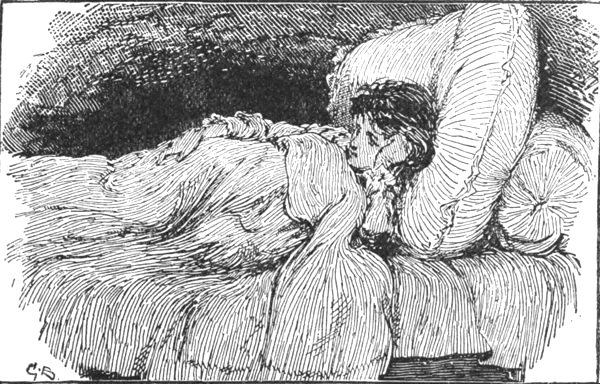
Toss! toss! from one side to the other; still Kitty could not sleep.
The big round moon looked in at the window, for the curtain had not been drawn, and it made a picture of the window on the wall opposite, and showed the pattern on the paper; nosegays of roses, tied with blue ribbon; roses and knots of blue ribbon; like no roses Kitty had ever seen, and no blue ribbon she had ever bought.
2Toss! toss! toss! she shut her eyes not to see the picture of the window on the wall or the roses and the blue ribbon, yet she could not go to sleep. It was always toss! toss! from one side to the other.
It was Christmas Eve, and outside the world was white with snow.
“It had been a dreadful day,” Kitty said to herself. “The last nine days had been dreadful days, and this had been the dreadfulest of all.”
Her brother Johnnie was very ill; he was six years old, just two years younger than herself; but he was much smaller, being a tiny cripple. Next to her mother Kitty loved him more than anybody in the whole world.
All through those “dreadful” nine days she had not been allowed to see him. She had many times knelt outside his door, and listened to his feeble moan, but she had not been permitted to enter his room.
That morning she had asked the doctor if she could see Johnnie, as it was Christmas Eve. The doctor had shaken his head and patted 3her hair. “He must not be excited; he is still very ill. If he gets better after to-night—then—perhaps!” he said.
She had overheard what he whispered to Nurse. “To-night will decide; if he pulls through to-night.”
All day Kitty had thought of those words.
“To-night, if he pulls through to-night.” What did they mean? did they mean that Johnnie might die to-night?
She had waited outside Johnnie’s room; but her mother had said, “No; you cannot go in;” and Nurse had said, “You will make Johnnie worse if you stand about, and he hears your step.”
Kitty’s heart was full of misery. “It was unkind not to let me in to see Johnnie,” she said again and again to herself. She loved him so much! She loved him so much! Then there was a “dreadful” reason why his illness was worse for her to bear than for any one else. Kitty remembered that ten days ago there had been a snow-storm; when the snow had ceased she had gone out and made snowballs 4in the garden, and she had asked her mother if Johnnie might come out and make snow-balls also.
“On no account,” her mother had answered; “Johnnie is weak; if he caught a cold it would be very bad for him.”
Kitty remembered how the next morning she had gone into the meadow leading out of the garden. There the gardener had helped her to make a snow-man; and they had put a pipe into his mouth. She had danced around the snow-man, and she had longed for Johnnie to see it.
Kitty remembered how she had run indoors and found Johnnie sitting by the fire in his low crimson chair, his tiny crutch beside him, his paint-box on the little table before him. He was painting a yellow sun, with rays all round it.
It was Johnnie’s delight to paint. He would make stories about his pictures; he told those stories to Kitty only. They were secrets. He kept his pictures in an old tea-chest which their mother had given him, and it had a lock 5and key. Johnnie kept all his treasures there—all his little treasures, all his little secrets. They were so pretty and so pitiful! They were his tiny pleasures in life. Johnnie was painting “Good Children Land” and “Naughty Children Land.” Good Children Land he painted in beautiful yellow gamboge; Naughty Children Land in black India ink.
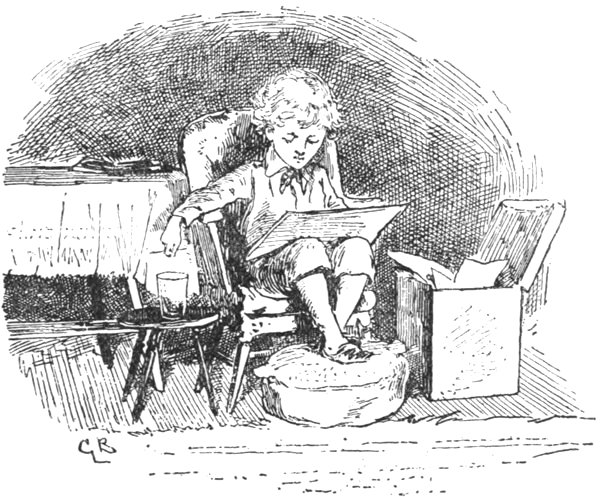
Kitty in her bed to-night seemed to see the whole scene, and to hear her own and Johnnie’s voices talking. She had rushed in, and 6Johnnie had looked up, and he had begun to tell her the story of his picture.
“Look, Kitty!” he had said; “this is the portrait of the naughtiest child, the very, very naughtiest that ever was; and he has come into Good Children Land—by mistake, you know. Look! he has furry legs like a goat, and horns and a tail, just because he is so naughty; but he is going to become good. I will paint him getting good in my next picture.”
Kitty remembered how she had just glanced at the picture; “the naughtiest child that ever was” looked rather like a big blot with a tail, standing in front of the yellow sun. But she had been so full of the thought of the snow-man that she had begun to speak about him at once.
“Oh, Johnnie!” she had said, skipping about first on one foot, then on the other. “The gardener and I have made such a snow-man. He’s as big as the gardener, and ever so much fatter; and he’s got hands, but no legs, only a stump, you know; and we’ve put a pipe into his mouth.”
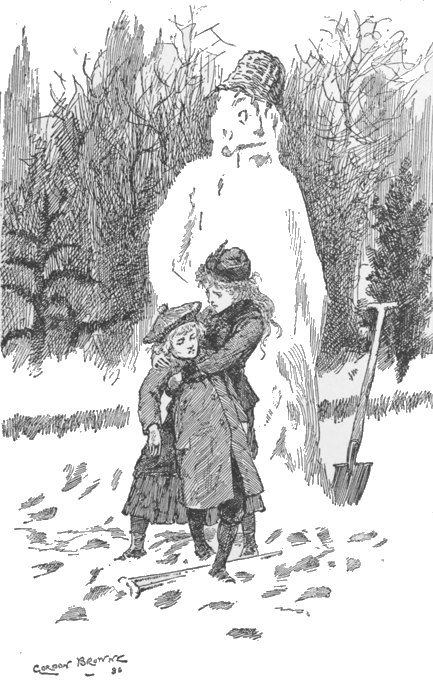
The Snow-Man.—Page 6.
9At this description Johnnie’s eyes had sparkled, and he had cried, “Oh! I wish I could see him!”
Then she had gone on to say, still skipping about: “He has two holes for his eyes, and they seem to look at me; and his face is as round as a plate; he just looks like the man in the moon smoking a pipe.”
This description had roused Johnnie’s excitement, and he had stretched an eager little hand toward his crutch.
“Please take me to see him! please take me to see him!” he had entreated.
Kitty remembered that she had hesitated. “I am afraid it would give you a cold,” she had said, looking at Johnnie with her head on one side.
“I shall put on my hat and comforter,” Johnnie had replied, grasping his crutch.
Still, she remembered, she had hesitated.
Her mother had said, “Johnnie must not go out in the snow.” But then Kitty had thought: “The sun is shining; and it will be for a moment only.” She did so long for Johnnie to 10see the snow-man, and he wished it so much. She remembered she had thought: “It can do him no harm just for a moment.”
She had helped Johnnie on with his overcoat, and wrapped his comforter round him, and put on his hat, and together they had gone out. There was no one in the hall, or on the stairs; they had gone out unobserved.
Johnnie had not a notion he was disobeying his mother. His tiny crutch danced merrily along with a muffled thud in the snow. He swung his small body as he hopped along; and he laughed as he looked round on the glistening white garden. So brisk and joyous was his laugh that Kitty had thought it was like the crow of a little cock. When Johnnie saw the snow-man he shouted a feeble hurrah! and he laughed more and more merrily as Kitty danced about and pelted the snow-man with snow-balls. Kitty remembered how she had gone on dancing awhile. Then all at once she noticed that Johnnie looked pinched and blue. She had run up to him, just in time to catch him as he was falling; his arm had lost its 11power, and his crutch had dropped. She had held him tight; but he looked so pale and thin that she thought he was going to die. Her screams had brought the gardener to the rescue, and Johnnie had been carried indoors. That night Johnnie’s illness had begun, and ever since the doctor had come twice a day.
Kitty had never been able to tell any one of the load that had been weighing on her heart during those nine “dreadful days.” Once she had tried to say it to her mother; but she burst into such a fit of sobbing that the words refused to come. No one had reproached her for having taken Johnnie out, no one had even mentioned it to her; but she knew it was she who had brought all this suffering on him. She who loved him so much! she who loved him so much!
As she was thinking of all this a voice sounded by her bedside; it said:
“Now, missy dear, you must not take on so. You must not fret. Look what old cooksie-coaxy has brought you—a mince-pie—a big—beautiful mince-pie—all for missy—alone.”
12It was cook who had stolen softly into the room. She was a fat, good-natured soul, and she spoilt Kitty terribly. All during that sad week cook had petted her, giving her cakes and sweets. She had kept assuring Kitty she was the dearest, best little girl in the world—“Cooksie-coaxy’s little angel-darling, and that Johnnie would soon get quite well.”
This sympathy had sometimes been very agreeable to Kitty, and she had accepted it and the sweet things it brought gratefully; but at other times she had repelled it, feeling angry with cook for saying what was not true only to please her.
Now Kitty buried her face deeper in the pillow, stopped her ears, and waved away cook and the mince-pie with an impatient elbow.
“Go away! go away!” she cried. “You spoil me; mamma says you spoil me. I would not be so naughty if you did not spoil me.”
Cook continued to hold out the mince-pie, but Kitty would not look round.
“Go away! go away!” she repeated.
Poor cook departed, leaving the mince-pie 13on a chair by Kitty’s bed. As she reached the door she looked round, and murmured: “Poor little dear, she doesn’t mean to be unkind to old cooksie-coaxy.”
Toss! toss! went Kitty again as soon as she was left alone. She had never been so wakeful.
It was as if some little creature was sitting on her pillow and talking to her. It was not a real voice; it was her memory that was wide awake.
“You have teased Johnnie,” it said. “He is so helpless. And how often when he has asked for his treasures you have brought him rulers, books, all sorts of things he did not want. Did you see the gush of tears in his eyes when you continued to tease, and when you ceased, the grateful, forgiving little lips put up to kiss you?”
As Kitty listened she tossed about even more restlessly.
Presently the voice that was her memory went on again: “There was that peach last summer; your mother gave it you to share with 14Johnnie. You gave him the smaller half; you kept the bigger one for yourself.”
Kitty tried not to hear, but the voice went on speaking: “How often you have run out to amuse yourself and left him pining alone. Do you remember that day when the Punch and Judy man brought his show into the garden, how impatient you were? Tap! tap! his eager little crutch could scarcely follow you. You dropped his hand suddenly and he fell to the ground. What a piteous, helpless little heap he looked. He could not raise himself; but when you lifted him he stroked your cheek and said: ‘Never mind, Kitsie,’ and he never told. Do you remember how pale he looked all day, as if he were in pain?”
Kitty could not bear listening to that voice any longer, so she sat up in bed. And there, on the wall opposite, there seemed written in the moonlight what the doctor had said: “If he pulls through to-night.”
Did it mean that Johnnie might die to-night?
She must see Johnnie—she must. She would be so gentle, so good. If he would only get 15well again she would never tease him again—she would never be impatient—she would always be good to him. She would put aside all her money and buy toys for him to put into his treasure-box.
If they would only let her in she would creep into his room, sit by his bedside, and hold his hand. She would tell him the story of the “Blue Rose,” which she had invented out of her own head and which he liked so much.
Kitty now went over the story to herself.
“There was a garden to which a fairy with blue wings and a blue hat had told her the way. It was very difficult to find, and it was a secret. But there was a rose in that garden, just like any other rose, only it was much bigger, and it had more leaves and a sweeter smell, and it was blue, and the fairy said if Johnnie smelt it he would get quite well. Then she and Johnnie [in the story] went off together, and they had a great many adventures. They had met robbers and giants, and they lost their way in a wood, and all sorts of 16terrible things had happened. But she had taken such care of Johnnie. She had protected him from the robbers, she had deluded the giants and sent them to sleep, and at last she and Johnnie had come to the garden. Such a garden—full of lovely flowers! and right in the middle of the garden there was a blue rose, exactly the color of the fairy’s wings and hat. It was set round with thorns, but Kitty did not care one bit. She pushed her arm right through the thorns. It would get all scratched, but she did not mind. She would pluck the blue rose and give it to Johnnie. He would smell it, and at the first whiff his leg would grow straight; he would smell it again and his leg would grow strong; he would smell it a third time and he would throw down his crutch, he would begin to jump about and dance. They would play games of hide-and-seek and run races, and Johnnie would run faster than she could. They would come home together, and everybody would wonder; but they would not say a word about the ‘blue rose.’ It was a secret.”
17This story had been quite a little story when Kitty had first made it out of her own head; but Johnnie had added bits to it. He had put in about the giants, and about a tiger with glaring green eyes going to spring upon him just as they found the gate of the garden.
The more she thought of all these things the more Kitty felt she must see Johnnie.
Out went one bare foot from under the coverlid, and still there in the moonlight it seemed to be written: “To-morrow is Christmas Day and there may be no Johnnie.”
This might be Johnnie’s last night. Kitty felt she would cry out if she did not see him, and out of bed went the other bare foot.
The clock struck the half-hour; it was half-past nine. How silent the house was! Her mother was lying down. Nurse was with Johnnie. If only she would come out of his room! She wished with all the might of her little heart nurse would come out. But nothing stirred through the house. Yes, after awhile she heard a slight noise, a door was creaking below. It was Johnnie’s door. She 18heard a step. Out of bed dashed Kitty. She ran into the lobby; she looked over the balusters.
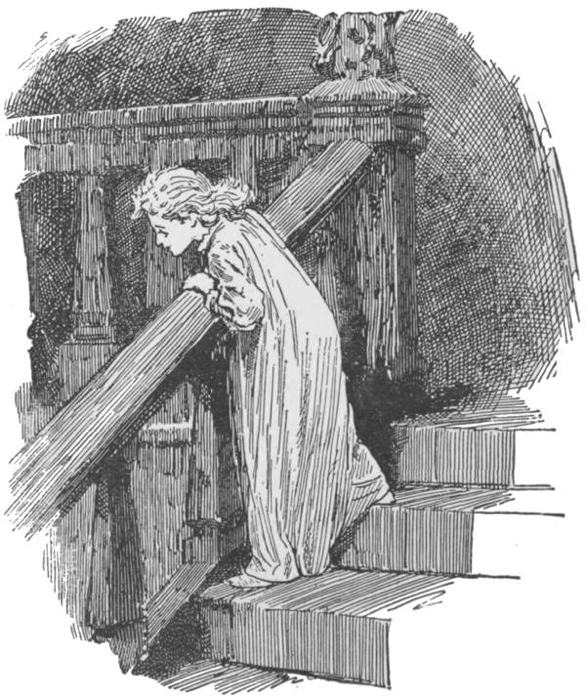
Yes, it was nurse going downstairs to the kitchen. She saw her white cap and apron distinctly. Kitty’s heart seemed to stop beating. The kitchen door closed after nurse. Hush!
Hush! The night-gowned, barefooted small figure crept down the wide staircase. Outside, the garden covered with snow glittered under the light of the big, beautiful full moon; it was so bright that it put out all the stars except those in far-away corners. There was a colored window on that staircase. As Kitty crept past it a bar of pink light, a square of lovely blue, a patch of orange shaped like a dragon fell upon her white night-gown. The trees outside were still, as if they were fast asleep under their eider-down covering of snow.
Hush! There was not a sound or a stir through the house, except the flap, flap of Kitty’s bare feet on the stairs. Suddenly a mouse ran across; Kitty saw its long tail quite distinctly. 20She was very much afraid of mice; the sight of one would give her a creepy feeling. But to-night she did not care for this mouse, nor for an army of mice. She was going to see Johnnie. She had no fear, except that of not being able to reach him.
Hush! Suddenly a stair creaked, and the creak sounded like a scream through the silence. Kitty huddled herself up, her shoulders to her ears, her elbows and hands pressed close against her sides and chest. She stood a moment or two staring, and thump, thump went her heart; but everything remained silent as before, and the bare toes resumed their march—cautiously—down—down. Now she sees Johnnie’s door. It is not quite shut. Something is standing before it. What is it? Something white and small. Is it Johnnie’s spirit?
Flutter—flutter—thump—thump went her heart. She stood trembling with terror; but alive or dead she must see Johnnie. Her love is greater than her fear. Down—down she goes, keeping her eyes fixed on that white 21thing before the door. Then she almost laughs out, for she sees it is no spirit, but a white apron hanging just inside the door.
Hush! Just as Kitty reaches the last step a door opens below. It is the kitchen door. She hears the servant talking. Nurse’s voice reaches her quite plainly. Is she coming up? Beat—beat—beat goes Kitty’s heart, and she peers over the balusters.
The next moment the door is shut again, and once more there is not a stir or a sound through the house.
Hush! Cautiously—cautiously Kitty pushes Johnnie’s door wide enough open to let her pass in.
She stands now in the dear familiar room. A fire burning in the grate fills every corner with a ruddy glow. She sees the pictures on the walls, on the table the medicine bottles and a spoon, in its accustomed place the low red-cushioned chair and tiny crutch beside it. A little bed with white curtains stands in a corner.
Softly—softly Kitty makes her way toward the bed, and pauses when she approaches it.
22Johnnie’s face is on the pillow, white as the snow in the garden; all around it a cloud of golden hair. His eyes are closed, and the long lashes look very dark against the pale cheeks.
Kitty remained quite quiet a moment looking at him; then she came closer within the curtains and laid her hand—a very warm brown plump one—on the wee white hand lying outside the red coverlid.
“Johnnie!” she whispered, and the name came as if the little heart would burst if it was not spoken.
Johnnie opened his eyes, looked blankly and queerly at her, then at once closed them again.
“Johnnie, speak to me!” urged Kitty with a sob.
Thus appealed to, Johnnie once more opened his eyes wider and wider, till the white wasted face seemed to become all blue eyes. Still he gazed blankly at his visitor in the night-gown; gradually his look brightened, he began to smile, the smile broadened into a laugh.
“Kitty!” he exclaimed in a glad feeble whisper.
23“I ought not to have waked you,” said Kitty, in a quivering voice; “but they have not let me near you for nine days. I have counted them—nine [a great sob]. I have sat outside your door—but they would not let me in [sob, sob, sob].”
“Poor old Kitsy!” whispered Johnnie; and up went the tiny hot hand in an effort to stroke Kitty’s cheek.
“They will send me away now if they find me,” continued Kitty, shaking with a burst of tears. “Mother is lying down. I heard nurse go downstairs—and so—and so—” Here the heaving of the little bosom, and the quick motion of the chin up and down, checked further speech.
Johnnie panted a moment on his pillow before he said:
“I have sometimes fancied you were in the room, Kitsy. I saw you quite plain—your freckles and your dear little cocked nose.”
At this description of herself Kitty knelt in a delighted heap by Johnnie’s bed, and rubbed her face round and round on his red flannel sleeve, very much like an affectionate pussy.
24“I have cried so much since you were ill,” she went on after awhile. “One day I wetted seven pocket handkerchiefs with my tears. I hung them up to dry. I counted them—there were seven.”
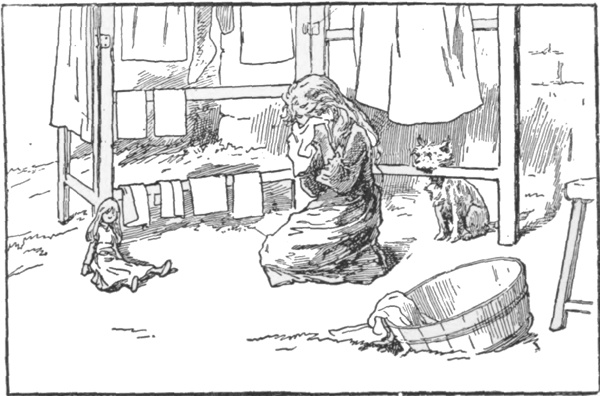
Johnnie’s eyes glistened with sympathy, and he repeated in his feeble voice:
“Poor old Kitsy!”
“It was the day,” went on Kitty, wishing to be exact, “that mother said I was to say in my prayers, ‘Pray God, leave us little Johnnie; but thy will be done.’ I prayed all day, I kept going down on my knees, and every time I 25waked up in the night I said ‘Leave us little Johnnie.’ I did not say ‘Thy will be done.’ I said ‘Leave us little Johnnie, leave us little Johnnie.’”
There was a silence; then Johnnie said in an odd sort of a way:
“I know what day that was. It was the day I saw my guardian child.”
“Your guardian child!” repeated Kitty curiously.
Johnnie nodded.
“What was he like?” asked Kitty, pressing nearer up against the bed.
“He was just like me,” answered Johnnie, looking straight before him, as if he were seeing there what he described; “only his two legs were both the same size—so he had no crutch, and he had a rosy face.”
“How was he dressed?” asked Kitty, growing more curious.
“He had a rainbow sort of a coat on,” replied Johnnie, “and he had two little pink wings. I thought he had come, perhaps, because I was going to die—and he wanted to show me that 26in heaven I was to have two legs the same size, and no crutch.”
“Oh—o-oh!” cried Kitty, her tears gushing out anew.
“Don’t cry, Kitsy,” the little panting voice resumed. “When I die I want you to have my cake of gamboge, my rose-pink, my India-ink, and my two sable brushes.”
“But you are not going to die,” cried Kitty, giving the bed a shake as she plumped against it. “To-morrow is Christmas Day, and you are to be much better to-morrow. Oh, Johnnie!” she added, wiping away her tears, “I have such a present for you: something you wanted ever, ever so much!”
“Is it another go-cart to take fancy drives in?” asked Johnnie eagerly.
“A go-cart! No!” answered Kitty scornfully.
“Is it a musical box with more than one tune?” asked Johnnie, a patch of red forming on one cheek.
“It is something ever so much more splendid,” cried Kitty; “but you are not to know 27till to-morrow. It is a secret. I’ll only just tell you”—and she nodded several times impressively—“that it sings and is alive.”
“Sings and is alive! Is it”—and now a red patch came on both Johnnie’s cheeks—“is it—no, it can’t be—is it—a bu—ull—finch?”
“Ye—es,” cried Kitty, jumping up and beginning to skip about, first on one bare foot and then on the other. “But you are to forget till to-morrow,” she went on, stopping her dance. “You must forget it, for it is a secret till Christmas Day.”
“Has it a tune?” whispered Johnnie, taking no notice of this order to forget.
“A lovely tune,” answered Kitty, her eyes sparkling. “‘Home, sweet home.’ He sings it with his tail up and his head on one side.”
As Johnnie laughed with joy, Kitty gave a sob of delight.
“I ran off to the shop by myself, the bird-fancier’s, you know; ever so far. Nurse scolded me dreadfully when I came back; she was so frightened, not finding me anywhere at home.”
28“Oh, I did so long for a bullfinch, dear, good old Kitsy!” murmured Johnnie, looking very wide awake.
“I am not good. I am very naughty,” said Kitty slowly. “Oh, Johnnie, I am miserable when I have been naughty to you! It gives me a pain here,” and she thumped her chest.
“You are never naughty. You are a good, GOOD, GOOD Kitsy,” panted Johnnie with emphasis.
“I am not good to you. I tease you so often, and I am greedy. I take the largest half of things—when you—you—ought to have them all,” cried Kitty, too shaken by repentant sobs to particularize the speech. “I let you fall one day last summer.”
“Good Kitsy, good old Kitsy all the same,” insisted Johnnie, thumping the coverlid with his tiny fist.
Still Kitty’s sobs did not subside: they grew bitterer and bitterer. Then came the confession:
“I made you ill, Johnnie. I took you—out—in the snow.”
29“I made you take me,” said Johnnie sturdily.
“Mother had said I was not to take you out in the sn—now,” went on Kitty, shaking with sobs. “You did not know she had said so. Oh, Johnnie, forgive me! Say you forgive me!”
“I made you take me out,” repeated Johnnie. Then, as Kitty’s sobs continued, he put his wee hand on her head, and said in a voice weak as the pipe of a wounded bird, “Don’t cry, Kitsy. I forgive you!”
There was a silence. Then Kitty dried her tears.
“I wonder what makes me so naughty!” she said.
“It is not naughtiness; it is having two legs the same size,” answered Johnnie comfortingly.
“But if you had two legs the same size, do you think you would be naughty, Johnnie?”
Johnnie thought awhile; his eyes glistened, and he shook his downy head.
“I would run all day long and nobody could stop me,” he said.
30“Do you think you would run about and forget things, and often jump about at lesson time?” questioned Kitty.
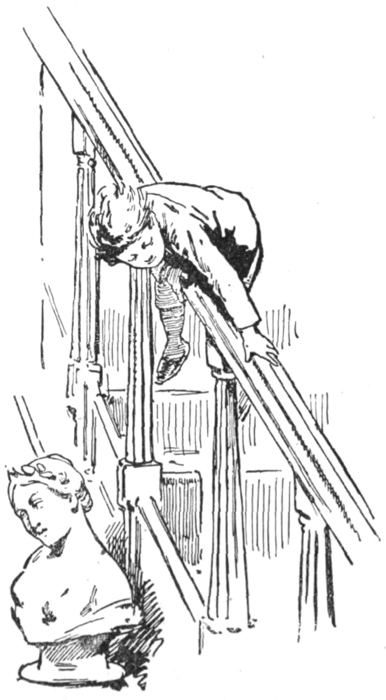
“I think I should,” said Johnnie regretfully.
“Do you think you would slide down the balusters?” still cross-questioned Kitty.
“I might,” answered Johnnie very humbly.
31“Johnnie, I wish I could give you my two legs. I wish I could. I would not give one just only to be good; but I would give you the two. I lo-o-ove you so much, Johnnie!” and Kitty shook the bed with her sobs as she took his hand in hers.
Johnnie looked wistfully before him: his face was crimson; his eyes shone like two tiny lamps; the little hand in Kitty’s seemed to burn. Then he said cheerily:
“It would not do for every one to have two legs. There would not be any one to sit down, and look on, and clap hands, and say hurrah! when the others were running matches, you know.”
“As you did when Cousin Charlie and I played in the hay that day last summer,” cried Kitty.
“Yes,” said Johnnie, and he began to mutter something Kitty did not understand.
“We’ll play again next summer, and you’ll look on,” said Kitty.
“Yes. How sweet the hay smells!” said Johnnie in a strange far-away voice.
32“Miss Kitty!” said some one behind.
Turning round Kitty saw nurse standing with her two hands raised and her eyes round with alarm and trouble. “Oh, Miss Kitty, what have you done? what have you done?”
“I am not going!” cried Kitty, stamping one bare foot. “I won’t go. Every one comes to Johnnie but me.”
“What is the matter?” asked another anxious voice. It was the children’s mother. “Kitty here!” she added, very much amazed.
“Yes, ma’am. Johnnie was sleeping like a lamb, he was. I slipped down just for a bit of supper. When I came up, there’s Miss Kitty, and there’s Johnnie, all awake and in a fever.”
“Oh, Kitty! what have you done? what have you done?” said the poor mother as she knelt down by the bedside and with straining eyes gazed at the little boy muttering and talking to himself.
A fear came over Kitty at her mother’s words and at the look in her eyes. She began to cry, but nurse in a moment had taken her in her 33arms, carried her upstairs, and put her into bed. She did not say a word, but she looked very grim.
“Oh, nurse, have I done Johnnie any harm?” cried Kitty, springing out of bed and clutching at nurse’s skirt as she was leaving the room.
“Harm!” repeated nurse, twitching her dress out of Kitty’s grasp. “The doctor said Johnnie might get well if he slept to-night and was kept quiet, and you went and waked him. It is the second time you—”
Nurse paused. Then she jerked out, “That is the harm you have done,” and left the room.
At those dreadful words Kitty felt cold: she stole back to bed, and turned her face to the wall. “Might Johnnie have got well if she had not waked him? Would he die now?” She did not sob, but she kept moaning to herself in the dark; and her heart sent up a prayer like a cry: “Pray God, do not let Johnnie die! Do not let Johnnie die!”
“Hush, Kitty!” said her mother’s gentle voice. “Johnnie seems to be going to sleep; 34he is quieter now. Perhaps he will be better to-morrow.”
“Oh, mamma! mamma!” cried Kitty, throwing herself into her mother’s arms. “I had so longed to see him! I had so longed to see him!”
Her mother made Kitty lie down: she sat down by her bedside, and taking her two hands she spoke soothingly to her little girl. When Kitty’s sobs were quieter she told her how easy it is to get naughtier and naughtier unless we resist temptation. In every little heart are the seeds of naughtiness that will grow and grow.
“But I was not so very naughty,” said Kitty with a big sob.
“You were naughty. I should not love you if I did not say you were naughty,” the sweet voice continued, talking in Kitty’s ear. She sometimes lost what it said, but she heard the sound like a lullaby.
“Punishment always follows naughtiness. It comes like the shadow that follows you in the sunshine. It may not be in pain to your body that it will come. It may come in grief for 35seeing another suffer for your fault; but punishment must follow wrong-doing.”
Then again the tender voice spoke:
“Your little heart tempted you to wake Johnnie. You ought to have resisted, to have said ‘No; what will comfort me may make Johnnie suffer.’” Then again the voice said: “We must resist temptation ... to win a blessing.”
“Get up! get up! get up!” said another voice.
Kitty was wide awake and sitting up in a moment. Some one was standing by her bedside. Was it nurse? Her white cap and apron glimmered through the dusk.
“How is Johnnie?” cried Kitty, starting up.
It was not nurse; it was the snow-man staring at her with his blank eyes, and waving a great fingerless white hand to her in the moonlight.
Kitty did not feel frightened; she sat up and looked at him. He held his pipe in one hand; with the other he beckoned to her. She could see the formless hand quite distinctly waving backward and forward.
“Get up! get up! get up!” he repeated in a hoarse, muffled voice.
37“Go away, naughty snow-man,” said Kitty; “it is your fault that Johnnie is ill.”
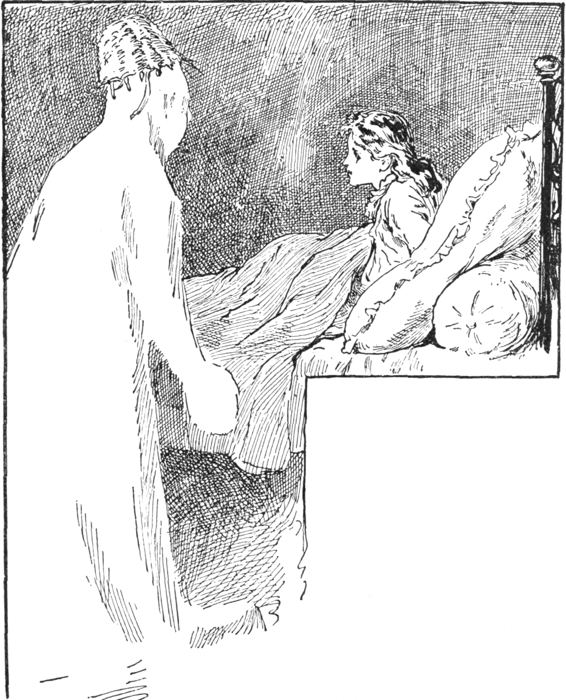
“Don’t you want to find the blue rose?” said the snow-man, with little pants between his words; he seemed very short of breath. His voice began with a rumble and a grumble, and ended in a squeak.
38“The blue rose that will cure Johnnie! Oh! but where can I find it?” eagerly cried Kitty, standing up in bed, and pressing up both hands under her chin.
“Come away! come away! come away!” said the snow-man, moving off.
He had an extraordinary way of walking—a shuffling, shambling, sliding way, and as he moved he still waved that white formless hand, and gazed at Kitty with his blank eyeless sockets.
“I dare not go downstairs again,” said Kitty.
But the snow-man was gliding, shambling, shuffling toward the window. He opened it, passed out, put his head back into the room, and continued to beckon to her.
Kitty jumped down to see what it meant. “I must put something on, or I shall catch cold,” she remarked, glancing down at her night-gown; but as her feet touched the ground she perceived that she was ready dressed.
“How won—” she began; then she paused, with her mouth open, looking at something much more extraordinary. Just outside her window 39spread a spacious flight of steps. Lovely stairs, white as pearl! On one side they towered upward, gleaming brighter and brighter till they touched the moon; on the other, they reached downward, till it made her dizzy to look. Far down as she could see the great white stairs reached.
As Kitty stood on the ledge of her window, voices sounded around her; she thought she heard her mother’s voice, her father’s voice, nurse’s voice, calling: “Cure Johnnie! cure Johnnie!”
A bell pealed from the church steeple; it seemed to call out: “Cure Johnnie!”
Then other voices came again, floating along down or up the white stairs, she could not tell which, whispering:
“Find the blue rose! Find the blue rose!”
Was she to go up, or was she to go down those white stairs?
The snow-man began to go down; Kitty followed him.
“Hurry! hurry!” he panted impatiently. “I am beginning to melt. There is a great drop on my nose.”
40He descended with a certain stateliness of gait—gliding; then letting himself drop noiselessly over each step. Kitty perceived that this way of getting along was due to his having no feet—that his figure ended in a stump.
Down, down they went, the snow-man going before, Kitty following.
How still it was! Their footsteps made no noise. Not a breath stirred. Nothing was to be seen but those white stairs glimmering. Down—down.
Every now and then the snow-man panted.
“Hurry! hurry! I am melting!” and a morsel of him would disappear.
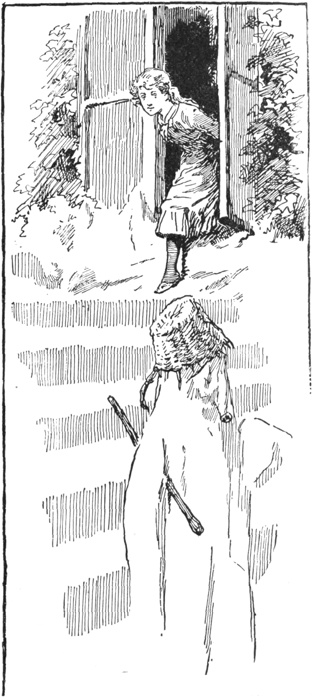
His nose went; his pipe went; one after another his features went, till the face he occasionally turned toward Kitty was a flat white face like a plate. One arm went. Still gliding, dropping noiselessly over each step, down went the snow-man, and Kitty followed.
As she followed she began to feel very vague. The lower she descended the less she could remember what she was going for. She was 41looking for something—something for Johnnie. But what was it? “What am I looking for?” she asked herself, shaking her head to shake off that dreaminess. “Is it that cake of gamboge?” No, it was not that. It was something else. Something she must find for Johnnie.
After awhile she thought she was going down for something she wanted for herself—something she must find.
“Oh, what is it I am looking for?” puzzled Kitty. “Is it that mince-pie?”
42She shook her head. “No, I don’t want that. It is something else.”
“Is it the naughtiest child?” Kitty went on dreamily.
“No, it cannot be that. I do not want to see the naughtiest child.”
Down, down they went, the snow-man melting till he had dwindled to a stump. Still gliding, dropping noiselessly over each step, went this stump before Kitty.
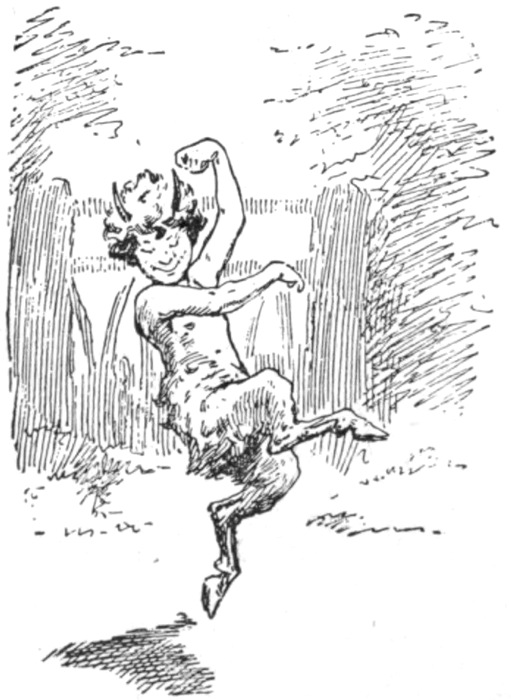
“Is it the moon I want?” she asked herself. As she said this drowsily the last bit of the snow-man melted away, and she found herself alone at the bottom of the stairs.
The snow had disappeared. She was standing in a meadow full of cowslips. At a little distance stood a wicket-gate, and beyond 43the gate there was a wood; one of the trees overshadowed the gate.
It was broad daylight. The summer had come; the trees were in full leaf. Kitty rubbed her eyes; but she did not feel surprised.
In front of the gate stood the drollest creature Kitty had ever seen, dancing to its own shadow. Down to the waist it looked like a pretty boy; but it had hairy goat legs, a curling tail, and tiny horns. A pair of pointed ears showed through its curly black hair. Its skin was a golden brown. On seeing Kitty the queer little creature stopped just as it was setting off to run a race with itself. It had the wildest, brightest, blackest eyes.
“Who are you?” he asked, fixing them upon her.
“I!” answered Kitty. “I—why, of course—I am—I am—” Then she stopped; she could not remember who she was. “Where is mamma?” she cried, frightened at forgetting.
“Mamma—you’ve no mamma—what was she like?” demanded the goat-legged creature, throwing back its goat-eared head and laughing.
44“Mamma—she was—she was—talking to me—just now—why—I can’t—I can’t remember what—she was saying;” and Kitty looked blankly at the frisking being. It laughed louder and louder. Ha! ha! ha! ha! ho! ho! ho! It sniffed the air with delight; it tumbled and gamboled about, clattering its cloven feet.
“There was Johnnie, I know there was Johnnie,” said Kitty slowly.
“Johnnie! I am Johnnie!” cried the brown creature. It ran up the tree that overshadowed the gate, and peered through the branches at Kitty.
“No, you are not Johnnie,” she answered, shaking her head. She was quite sure of that.
Down it jumped and began marching backward and forward with high steps, keeping time as to the sound of music. Its pretty boy-head was thrown back—mischief and sportiveness peeped out of its bright eyes.
Kitty thought she had never seen anything so pretty, playful, and delightful as this elfish being with its pointed ears, its tiny horns, and bit of a tail. “Who are you?” she asked.
45“I!” The creature paused in its marching, laughed and sniffed the air, frisking to a measure of its own, first on one horny foot, then on the other, chanting as it frisked:
“I am what makes the kids jump, the kittens tumble, and the children dance.”
“Are you then a sprite?” asked Kitty.
The elfish being laughed louder, showing all its white teeth. Kitty thought it now looked more like an imp, as he went on skipping and chanting.
“I make the magpies steal; I make the goats butt; I make the children disobey.”
Saying this it ran up the tree again, caught at one of the branches, and swung itself backward and forward.
Kitty felt a little afraid on hearing that last speech; but she began to laugh again as she watched the creature darting gay as the birds or the pretty wildlings of the wood.
The next moment it scampered down. “Catch!” it cried, tapping her on the shoulder, and starting off at a run.
Clack! clack! went its bounding heels. The 46sound set those of Kitty bounding in pursuit. It was the merriest race. She chased her elfish play-fellow round and round the meadow; but she could never catch him. He always escaped her; tossing back his curly black hair and tiny horns. Still they scampered about until Kitty was quite giddy with play.
All at once the creature stopped short, and said:
“I know Johnnie. Come, let us look for Johnnie.”
“For Johnnie!” cried Kitty, bewildered. “Where shall we look for him?”
“In Naughty Children Land, of course!” he answered.
“Oh! Naughty Children Land! Naughty Children Land!” repeated Kitty, who vaguely felt as if she knew the place.
“I am sure Johnnie was naughty. You are naughty. I’ll bring you where all the naughty children are!” The elfin having stretched itself on the ground, put its elbows on the grass and its chin on its brown hands.
Kitty sat down opposite.
47“Is the naughtiest child there?” she asked eagerly.
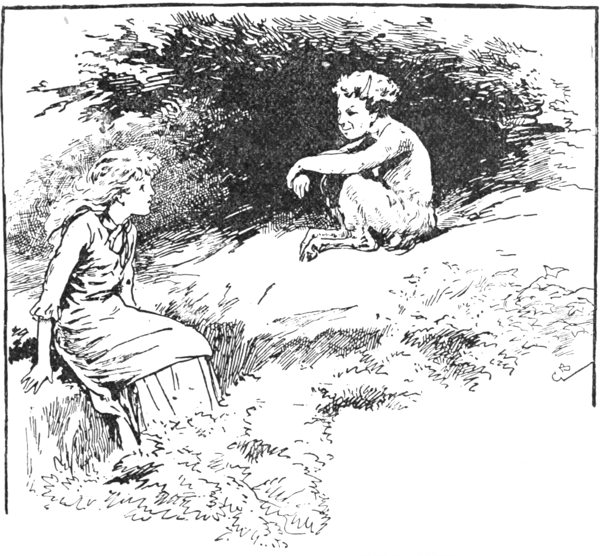
“The naughtiest!—yes, the very naughtiest. The greediest; the vainest; the mischievousest,” answered her elfin comrade, kicking up its heels.
“Are they punished?” asked Kitty.
“Punished! No, they are petted!” the queer creature replied, rolling itself round and round with laughing.
“I think I should like to go,” said Kitty.
“Come along; I’ll take you. It is the most 48comical place you ever saw;” and the goat-legged being sprang to its feet.
Kitty got up.
Her play-fellow opened the wicket-gate, and they passed out together into a broad and flowery path hand in hand.
Skip, skip, down the path they went together.
Skip, skip, through a lovely wood where grew all Kitty’s favorite flowers. Honeysuckles garlanded the way, and thrust out their waxen blossoms like fingers to catch them as they passed. Wild roses, that looked like fallen stars on the bushes; little pools of blue hyacinths, hosts of golden king-cups, ox-lips, and daisies lined the road.
Skip, skip, past a stream on which the water-lilies floated. Dragon-flies darted zigzag like jewels writing on the air. Butterflies hovered, birds sang. Red squirrels ran up trees and stopped cracking their nuts to look at them. A gray field-mouse peered out, moving its tiny mouth incessantly as if talking to itself. The trees rustled; the shadows waved as the breeze rocked the boughs.
49Skip, skip, first on one cloven foot and one tiptoe, then on the other cloven foot and the other tiptoe, went Kitty’s guide and Kitty followed.
Suddenly they came to the oddest place Kitty had ever seen. It was right in the center of the wood on the other side of a ditch. They paused to look at it.
It was an extraordinary looking place. Kitty thought it was the queerest place she had ever seen. It had a tumbled-about, pulled-about appearance, for the ground was all in mounds and holes, and the roots of the trees bulged bare from the sides of the banks. Presently there came a sound of screaming and shouting. Above these dismal cries Kitty fancied she heard the sound of smacking.
“Is that Naughty Children Land?” she asked.
Her play-fellow did not answer.
She turned to look for him, but the queer creature was gone. Kitty was alone. “Extraordinary!” muttered Kitty. “It must be Naughty Children Land,” she continued. It was not at all difficult to get into Naughty Children Land; just a step down a bank, a jump over a ditch, and Kitty was in it.
51She made a few steps forward. The ground was covered with broken toys. Battered, smashed, noseless, eyeless, hairless dollies; tops without a spin in them; whips without handles, drums without heads; torn picture-books, blotted copy-books, mangled lesson-books, their pages miserably fluttering about.
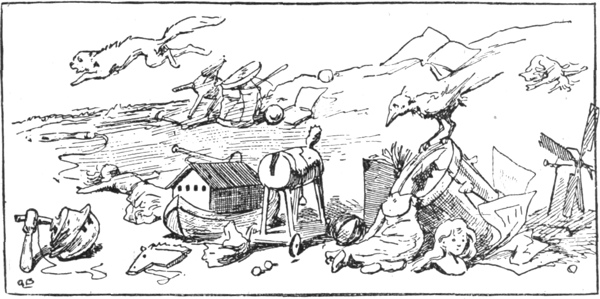
Queer dull little birds, with one feather only for a tail, flew here and there, uttering melancholy chirps. “Tweet—tweet!” they cried. “Hi—ss—hiss” shrieked a cat, making an ∾ of his thin body, and waving a tail that appeared to have been pulled and pulled till it was more like a bell-rope than anything else.
But what attracted Kitty’s attention was a 52group of little girls, sitting with their shoulders up to their ears, their chins in their hands, their hair falling over their eyes. They would have been very pretty but for their frowning eyebrows, their puckered foreheads, their tumbled hair, their under lips, that had stuck out so long that now they always stuck out. Every now and then these dismal children gave a big spiteful sob, and their faces were smeared with dirty tears.
“What is the matter? Why do you look so miserable?” asked Kitty.
At first the woebegone children drew down their eyebrows more closely, and stuck their under lips further out. Then in a sing-song, sob-broken voice, raising their shoulders still nearer to their ears, burying their chins deeper in their hands, making wryer faces, they sang in a chorus:
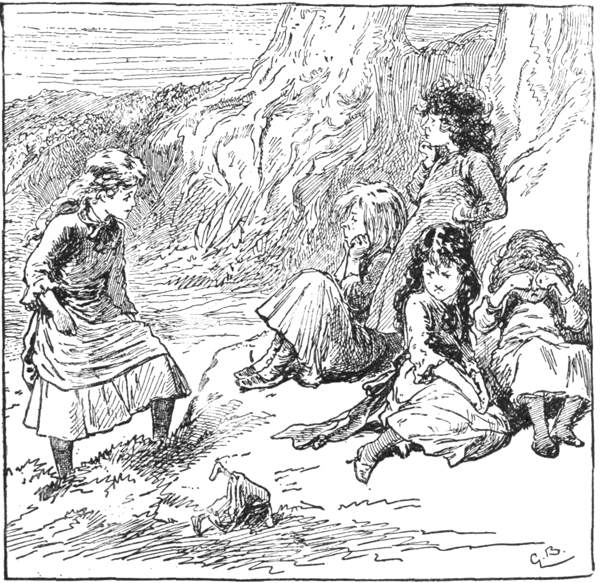
“Well, I never heard of any one yet liking to be miserable all the day long,” said Kitty with a smile that grew broader and broader as she looked at the dismal, dejected group. But they took no further notice of her. She stood hesitating and watching. Should she jump back over the ditch and go to look for that elf, or should she go on?
The children still kept up their doleful chant.
“I am sure I shall find the naughtiest child in this place,” thought Kitty, “and I should so like to see it. Of course I’ll find my way back. It will be quite easy. Those broken toys will guide me, and those little girls,” she went on, with a twinkle in her eyes, “who are determined to be wretched will still be here. They do not seem inclined to run away.”
Kitty walked on. Certainly it was the most extraordinary place that could be imagined. Through the trees she could see houses. All the windows seemed to have broken panes; 55fat, cross children looked out; the gardens seemed to be a tangle of thistles and weeds.
More broken toys, more blotted copy-books, more torn picture-books; everywhere weeping, howling, shouting. She could see no one here; probably all were sitting at home crying. It was as if everybody was crying in the place. There were plaintive cries, and angry cries, and lazy, nothing-else-to-do cries. There were cries like old street organs that had lost the beginnings and ends of their tunes, and still went round and round, “piano, crescendo, piano, crescendo,” as the music-books have it. There were cries like bagpipes in a rage, shrill, blustering, furious; there were cries like bagpipes that had caught a cold and were going to sneeze.
Kitty’s blue eyes twinkled as she listened to these weepings. “Those children ought all to be whipped and put to bed,” she said severely. “That would brighten them up.”
Through that chorus of cries she distinguished barks—not jovial, satisfied, inquisitive barks—but snarls, and growls, and angry, 56frightened yappings. She heard fierce mews and hissings also—every now and then lean cats ran along at full speed, their ears lying back, their eyes full of a wild, hunted light.
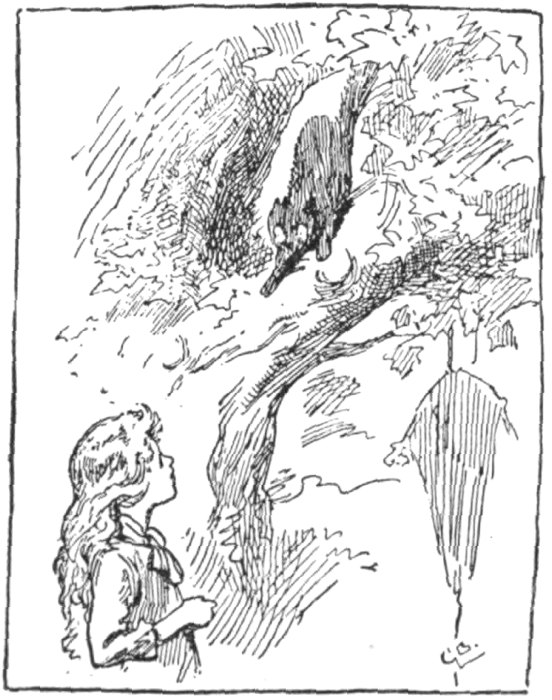
“Pussy! pussy!” said Kitty softly as a black creature dashed past her. It whisked up a tree, and glared at her with eyes like green lamps. Kitty thought of the pussy at home, of his sleek fur coat, his comfortable ways.
“Pussy! pussy!” she said again in her most winning voice.
“Hi—ss!” answered the cat, ruffling up all his fur and glaring at her spitefully.
“A most unamiable, disagreeable cat! He ought to be whipped and put to bed also,” said Kitty, and she marched on with an offended air.
Birds which looked as if they were always molting watched her as she passed, presenting 57a most dejected appearance with their heads very much on one side.
“Poor birdies—birdies!” whispered Kitty softly.
At the first step she made in their direction they flew off with as much flutter as their feeble wings could make.
“I wonder have I grown horrid to look at, that they are all so frightened at me!” muttered Kitty. She felt her cheeks, her nose. Her nose seemed to be the same round little nose inclined to point upward, her cheeks felt plump and soft.
All at once something cold dropped on the nape of her neck, just behind her ear. Kitty put up her hand and took hold of a goggle-eyed frog. “Oh, oh, oh!” she cried with a shiver, throwing it away.
“Ha, ha, ha!” shouted a little boy, dancing round and round.
He was the queerest little lad she had ever seen. He had short legs, and a queer little fat figure, and queer little pointed ears; queer little curls fell over his forehead, and he had queer yellow eyes.
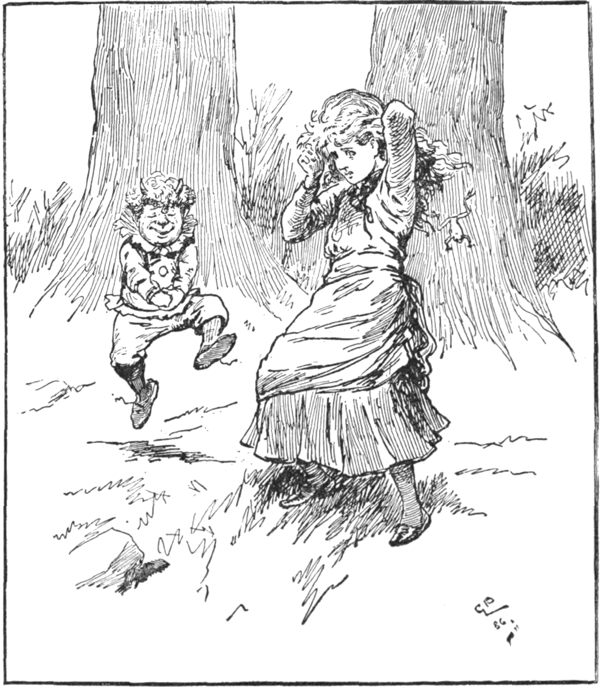
He looked so funny, putting one in mind of something between a monkey, a squirrel, and a boy, that Kitty after a moment began to laugh. It seemed to her that Cousin Charlie might look like that at his very naughtiest.
59“Make friends,” said the boy, stopping his dance. “Give me a kiss.”
“Certainly not,” answered Kitty; “but perhaps I may shake hands with you.”
She put out her hand, cautiously watching the boy, who had a gleam in his eyes she did not quite like. He approached with a hop and a jump.
“There’s a sweet for you,” he cried, depositing a spider on Kitty’s palm.
“Oh, oh, oh!” she shivered, gathering herself into a little trembling mass of disgust, skipping about and shaking her finger tips to make sure she had dropped the spider.
The boy laughed louder and louder; that was evidently his idea of fun.
“You are the disagreeablest, mischievousest boy,” said Kitty, turning away, and trying to make her words sound as long and severe as she could. “You deserve to be where you are, in Naughty Children Land. I am going to leave it.”
She blinked her eyes to prevent the tears from falling. She would not for all the world 60that the queer boy should see he had made her cry.
As she turned away he sang lustily after her:
Kitty pretended not to hear. She walked back the way she fancied she had come. Before, behind, on every side of her stretched the tumbled-about land, and every untidy side looked exactly like the other. Was she really going only round and round? Presently she found herself standing once more close to the queer little boy. There were a number of other children about the place now. They were having high games, throwing each other into a duckweed pond, full of frogs that loudly croaked their vexation; or they were trying to make each other slip into a bed of nettles, or sit down on a wasp’s nest.
Bu—uzz! bu—uzz! went the wasps in a rage.
61The children laughed louder and louder, till they fairly screamed with merriment.
The queer little boy sat by himself, striking one stone against another. Out of the dark, dull stones the sparks flew, golden and beautiful. As they flew up he laughed.
“Listen, I’ll tell you a secret,” he said, winking one yellow eye at Kitty. “I am practicing to set the world on fire.”
“The world—on—fire!” she repeated, quite breathless.
The queer boy nodded his head.
“Listen; the sparks will catch the trees in the wood. There will be a hiss, a flame. How the people will run, scamper, and tumble! They will tumble about like ninepins in their fright; and how their hair will catch fire! But the flames will run faster. Hurrah, what a bonfire that will be!”
He sprang to his feet, he leaped about, swinging his arms; his teeth flashed. Kitty thought he looked like a small tiger.
“But you would be burned yourself,” she said, with a gleam in her eyes.
62“Oh, I am brave! I don’t mind pain!” said the boy, beginning to strike the stones once more with a fine flourish. Bang went the uplifted stone down upon his thumb, and hit it with a great thump. The boy set up a roar, like that of forty cross babies.
“Oh! o-oh! O-o-o-h-h! Daddy Coax—Da-addy Coax!” he shouted, flinging down the stones and running off with all the speed of his legs.
“Daddy Coax! I wonder who Daddy Coax is? It sounds a nice name!” thought Kitty. Then she continued: “Setting the world on fire! with the dear little birds, and the pussies, and the faithful dogs in it! And there would be the old people, and the crippled children who can’t run!”
The thought of Johnnie seemed to knock at her heart, yet she did not remember distinctly. She seemed to hear the eager, uneven thump of his crutch. Again her little heart ached with the confused sense of pain. She walked on faster.
She made her way toward a wood that 63seemed the only pretty spot near. As she approached it she nearly fell over a wee girl who was kneeling, watching a lovely butterfly, with wings like quivering flowers, twinkling and hovering near the ground. As it rested to stretch its bright body for a moment, down came the clinched little fist and crushed the happy winged creature.
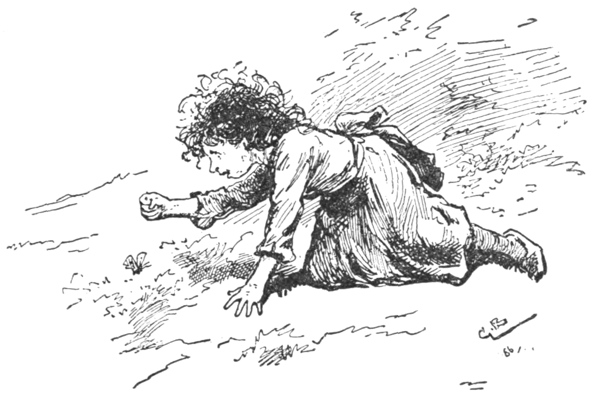
“Oh, how could you?” cried Kitty.
“Don’t you love to kill fies and butterfies and see them wiggle?” asked the child. She 64was so small she could not speak plain yet; but her bright black eyes twinkled, and she showed her wicked little teeth.
Before Kitty could answer she heard the tramp of small feet running. The next moment she was surrounded by a crowd of children, who cried: “Come along, come along! We are going to rob a nest. There are two new-born birds with yellow beaks, and there are three blue-speckled eggs. The mother bird is sitting on them. The father bird is watching. We’ll kill him with a stone.”
“We’ll blow the eggs and string them for a necklace,” cried a girl.
“I won’t come!” exclaimed Kitty indignantly. “How can you be so wicked?”
A pitiless hand seized hers. It was so strong in its unkindness it pulled her along.
“Let me go! let me go!” entreated Kitty as the cruel children pushed and pulled her.
Run she must; run with the children. Oh! the cruel children, with hands strong to hurt, with feet nimble to give pain, with shrill voices to jeer and mock.
65Presently Kitty saw a hedge, and in it a pretty nest, so cunningly built. It lay among the fresh green leaves. A baby prince could not have a daintier cradle, set among shadier curtains, than had those callow birds. The father bird was fluttering above uttering cries of reproach. A thousand other birds were singing; Kitty understood their song.
They sang of their love for their pretty nestlings, of their pride in the nest they built in the sweet spring weather.
“Twe—et! twe—et! bur—rrr!” sang the father bird, with all his heart in his throat. “Shame upon the boys and girls who find sport in robbing the homes we and our mates make so patiently!”
“Twe—et! twe—et! Save my little ones,” piteously cried the mother bird.
Her head showed just above the border of the nest. Brave mother bird! she did not stir as the children came nearer. Out of the green twilighty hedge her watching eyes shone wistfully. Kitty thought they turned upon her. Their light seemed to burn into her heart.
66“Twe—et! twe—et! Save my little ones! Save my little ones!” entreated the mother bird.
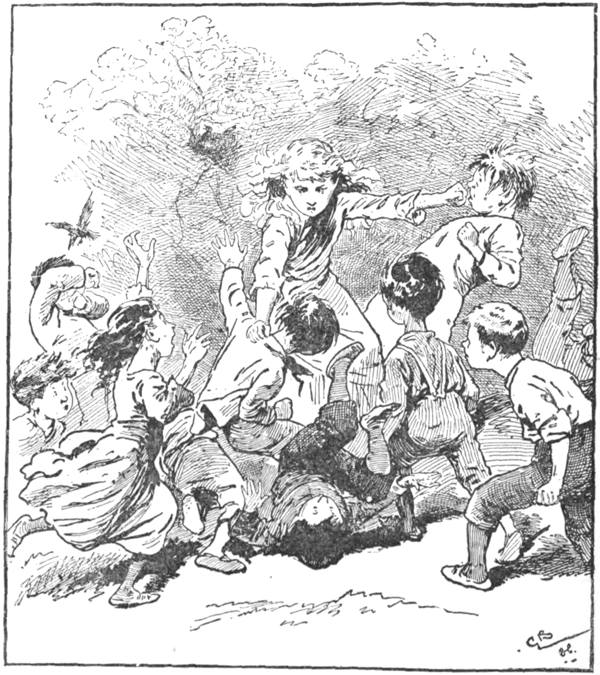
Then Kitty sprang from the children. She placed herself between them and that part of the hedge where stood the nest. She defended 67its approach with all her might. She waved her brave little arms like the sails of a windmill in a tempest, pushing down the children as they came. Pitiful little arms, eager to comfort, not to hurt. The father bird did his best to help in the battle. He flew against the invaders. He fluttered his wings in their faces. He pecked at their noses, at their hair.
“Twe—et, bu—urr, bu—urr! Shame, shame!” he cried louder and louder.
The mother bird kept up a piteous twe—et.
This touching little noise, that sounded between a sob and a prayer to be delivered from the cruel children, seemed to give Kitty strength. But what could she do against so many? Alone against a crew of spoilers! She shut her eyes as the children dragged her from the place she had defended. She heard them clambering through the hedge and the crack of the twigs. She heard the sorrow of all the birds—the screech of the father, the wail of the mother. Then came a wild hurrah! and she knew the children had their hands on the nest. The hurrah stopped all of a sudden.
68Kitty looked up. Two severe-looking old dames, carrying birch rods, had suddenly appeared on the scene.
Whack! whack! went the rods.
“Oh, oh, oh! Daddy Coax! Daddy Coax!” cried the children, running away. They might be very brave laying siege to birds’ nests; but they could not run away fast enough from these birch rods.
The stern-looking old ladies pounced upon the leaders of the gang, and held them firmly tucked under their arms. Kitty saw the black-eyed child who liked to kill “fies” and “butterfies.”
As she stood looking, the severe dames suddenly disappeared, carrying off the children as they vanished.
“Extraordinary!” muttered Kitty, rubbing her eyes.
She looked to the right, to the left; they were gone! “I can’t understand it! They were here a moment ago—and who is Daddy Coax? How shall I find out where he lives?”
“I shall take you there,” said a voice.
Kitty turned round and saw a little girl standing with her eyes modestly cast on the ground.
“I think I saw you with the cruel children who were going to rob the nest,” she said bluntly.
“No, indeed, I never hurt anything,” answered the girl. As she said this a pimple came out on her lips. “I never hurt anything,” she continued, in a high voice—“never. If a mosquito or a flea bite me, I let them bite. I say, ‘Poor things, they are hungry; I am their supper, I am their dinner.’”
“You are good!” said Kitty, very much impressed, but still with a rather doubtful tone.
“Yes, I am very good,” said the little girl, 70with a sigh, and as she said this another pimple came out, this time on her nose.
Kitty could not speak, she was so surprised at finding this good little girl here. They walked on through the wood, and here presently they heard singing. It was a bright tune, and Kitty distinguished the words:
They had come to a place where there was a pool set round with blossoms and reeds, like a mirror in a charming frame. All around it a number of little girls were kneeling, bending over, smiling, bowing to themselves, making the most extraordinary grimaces as they decked themselves with flowers, and talked and sang to their own reflections.
A fat, green frog and his family sat on a water lily leaf; all the frogs hopped and bowed as they looked over its border, croaking all the time, as much as to say:
71“Look at us; admire us! Are we not beautiful creatures?”
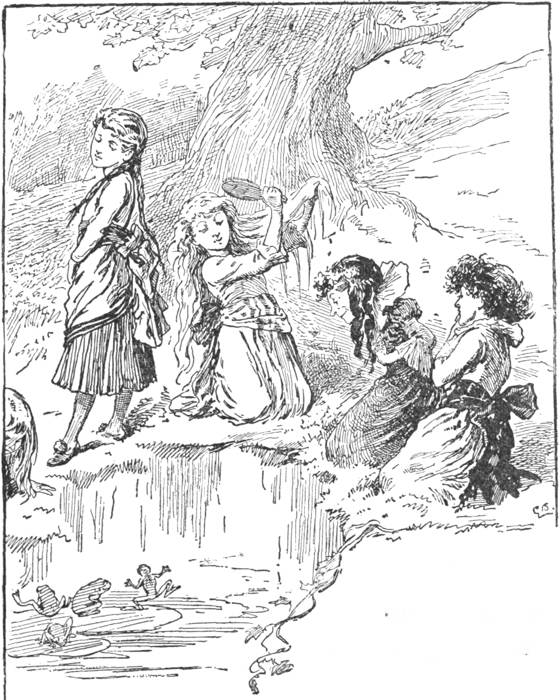
“Who are those children, are they idiots?” asked Kitty in an affrighted whisper.
“They are worse than idiots; they are vain,” sighed her guide.
72The children were far too much occupied gazing at themselves to see any one else. They kept on murmuring lovingly to their reflections down in the water.
sang one softly, continuing to smile to herself.
crooned a second, who was making grimaces in her efforts to kiss her own face.
a third sang joyously, putting a wreath on her head.
joined in another, promenading up and down and craning her neck to see the effect of her dress at the back.
Then together all the children sang:
“Croak, croak, croak,” joined in the frogs, jumping in accompaniment to the song.
Kitty was never to forget the sight; the pretty, shining pool surrounded by beautiful flowers; the speckled frogs gazing at themselves affectionately over the edge of the lily leaf; the little girls grimacing, smiling, and singing to themselves so lovingly. It all seemed so droll that she burst out laughing.
74Suddenly she stopped, for she heard her laugh taken up by everything around her; up in the trees, down from the sky, all through the reeds and flowers. Everything was laughing with Kitty’s laugh.
She stopped, and still the laugh was going on. Ha!ha!ha! Ho!ho!ho! As if everything had been inwardly laughing until then, but had not known how to express laughter until she gave it a voice.
The children started to their feet; they looked around, they saw Kitty, and were rushing toward her in their anger, when all at once, but whence Kitty could not tell, there appeared the two severe old women waving their birch rods.
“Hoity! toity!” they muttered, laying hold of as many of the children as they could pounce upon. “You’ll have enough of your faces by Christmas Day in Punishment Land.”
They strode off so quickly with the children tucked under their arms that Kitty could not tell which way they had gone, any more than she could tell how they had come.
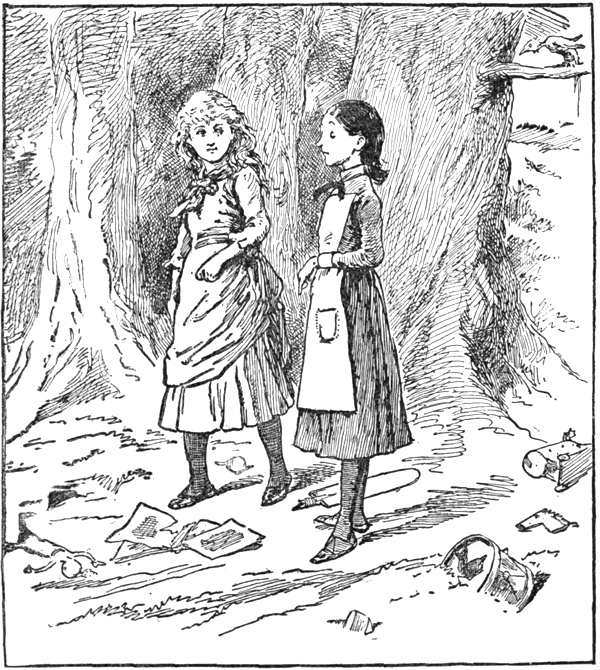
“I am not vain. I never look at myself in the glass,” remarked the little girl in her high voice; as she said this another pimple came out, this time on her forehead, over her right eye. “When I brush my hair, or pin on my collar, I 76shut my eyes not to see my face. Not even to have a peep.”
“I wonder,” said Kitty, watching with great interest the pimples spreading and spreading, “how you ever came to Naughty Children Land when you are so good.”
“I come to teach the children to be good,” answered her guide with a smug sigh.
Another pimple, larger than the others, was just coming out on her left cheek, when Kitty gave a start and the demure little girl a scream. One of the old ladies suddenly appeared behind the latter’s back—how she had come there was the wonder; she tucked the boaster under her arm, and marched off at a tremendous rate, with her captive screaming and wriggling in the wildest passion.
“I am sure she was not a bit good, and I am sure she was a great goose—never killing a flea or taking a peep at herself in the glass,” muttered Kitty, straining her eyes to discover which way they had gone.
“I wonder where the old women take them?” she continued.
77Look which way she would she could not see them. They had disappeared clean out of sight before she could have said “Daddy Coax.”
“It certainly is Vanish Land as well as Naughty Children Land,” thought Kitty dejectedly. “How can I ever find Daddy Coax?”
She perceived she was now standing on the edge of the wood and at the entrance of a lane. The lane seemed to lead to Untidy Village. She could just see the houses with the broken window-panes, the weedy gardens, the ground all covered with broken toys and torn books.
Kitty took heart. “I’ll run down the lane. I am sure Daddy Coax lives in the village.”
She had not gone many steps down the lane when she came upon a party of boys and girls having a picnic. Gracious! how they gobbled; it was a sight to see. They doubled up whole buns into their mouths, crammed down tarts and lumps of cakes. Their cheeks were puffed out, their noses hidden. Every now and then they gave a grasp, stroked themselves up and down, and set to again.
“Could you please tell me the way to Daddy 78Coax’s house?” asked Kitty politely, trying to look as if she were not at all astonished at the quantity the children were eating or their manner of gobbling.
They said something that sounded between a snort, a sneeze, and a mouthful of pudding, and went on cramming.
Thin birds hovered above them, lean dogs and cats peered hungrily at the feast; but when the birds came down to pick up the crumbs, or the dogs advanced with an entreating whine, and the cats slowly with glittering eyes, the gobblers, with a hiss, waved their arms and frightened away the beggars.
“I think it is perfectly disgusting to be so greedy,” said Kitty, turning her back upon the picnickers. She walked off slowly. She could not bear the sight of the hungry animals repulsed by these children, who looked all fat cheeks.
No wonder the dogs she met appeared to be always watching their opportunity to bite somebody’s legs; that the cats seemed to have no purr in them; the birds no sweet thanksgiving 79song; that the crests of the cocks and hens hung depressed like bits of red rags out of an old-clothes shop.
“I am sure these fowls have no merry thoughts,” said Kitty, trying to make a joke just because she felt so miserable.
A fat small boy, with cheeks the color and shape of suet-dumplings, was sitting apart by himself, gazing with a melancholy air at a tart that he had nibbled all round.
“I cannot finish it,” he said to Kitty, looking sadly at her. “I have shaken myself, but it makes no difference. There is no more room inside me.”
“Never mind, you’ll eat it by and by, when you are hungry again. It will taste better then,” said Kitty encouragingly.
“It could not taste better,” said the boy sadly. “It was a beautiful tart, all jam and almonds, with custard on the top. A lovely tart. I have eaten thirteen, all different. I feel a little sick. Ah!” he went on with a sigh that almost blew his tart away, “what a dreadful thing to have all those good things to 80eat and not to be hungry! I wish I were always hungry, and had always something good to eat.”
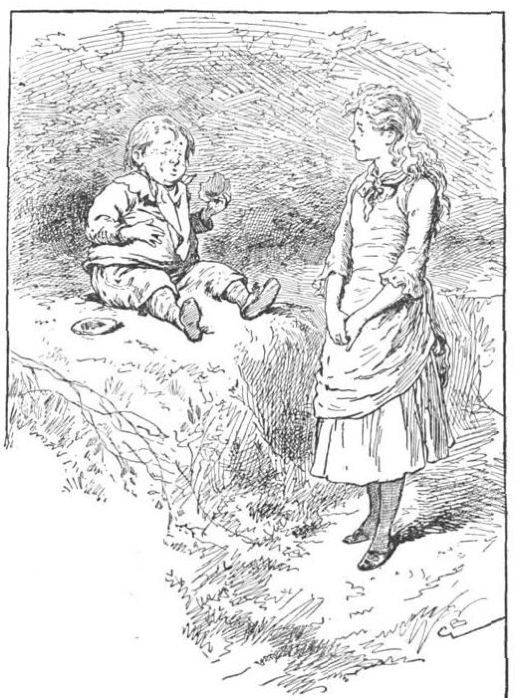
“But then you would do nothing but eat,” remarked Kitty, turning away.
81“Nothing but eat tarts and cakes and sweets, never feel sick, never be interrupted; that must be heaven,” said the boy, nodding drowsily.
Kitty was leaving him with the toss of her head, the firm closing of her lips, and dilating of her nostrils that was her usual way of showing indignation, when she recollected that she did not know her way to Daddy Coax’s house.
“Please before you go to sleep,” she said, steadily looking over the boy’s head, but trying to make her voice sound pleasant, “would you tell me the way to Daddy Coax’s house?”
“Yes, I know it; it is close to the sweet-stuff shop. Straight on.” The boy made an effort to get up, but down he sprawled again. “I cannot walk just now, or I would go with you as far as the sweet-stuff shop. There is lovely barley-sugar and plum-cake, and lots of raisins. Bath-buns stuck all over with lumps of sugar, and jam-puffs. Which do you like best, jam-puffs or plum-cake?”
“Neither,” said Kitty, jerking out the word and jerking up her chin.
“Neither!” feebly echoed the fat boy, his 82cheeks quivering with surprise. “Bath-buns, then?”
“You are very dull,” interrupted Kitty with flashing eyes. “Whichever way I turn the conversation you turn it back to tarts and cakes.”
“Con—ver—sa—tion! What is that? Is it plum-preserves or straw—ber—ry?” and he nodded asleep with a snore.
“Conversation—preserves! He is stupid!” said Kitty, walking away. She tried to laugh, just to keep from feeling miserable.
Naughty Children Land was a dull, ugly place. She had changed her mind concerning it. She wished, with all the might of her little heart, she had never put her foot inside it, and she was glad Johnnie had not come with her.
As she came nearer to the end of the lane she could more plainly see the village of which she had caught only glimpses. There were the houses with the broken window-panes, through which she could see the smashed crockery and furniture, and the cross, fat children looking 83out. There were the gardens all a-tangle of thistles and weeds. There were more frightened animals, more shrieking, squabbling children, kicking and growing purple in the face. There were the do-nothing children dolefully crying among their broken toys and their torn lesson-books. There were the mischievous children playing pranks upon everybody. All were unhappy! Coming, Kitty could not tell whence, and going, she did not know whither, appearing here—there—everywhere—as if out of the air, were the stern old ladies, pouncing upon the children and disappearing with them.
Kitty now perceived a group of little girls who looked tattered and torn, and who seemed to be playing at some game. They were running about in all directions, looking here—looking there—emptying their pockets—banging their sides—searching the ground—stopping suddenly and tapping their foreheads, as if to find something there.
They were in rags, but they had good-humored, slobbery, dirty faces.
“I beg your pardon for interrupting you; 84but could you tell me the way to Daddy Coax’s house?” Kitty asked in her best-company-manners voice, for she felt this was her last chance—no one else could tell her if these children did not.
“Daddy Coax! oh, yes, certainly—we know it quite well. Turn on your right—no—no—turn on your left. No; keep straight along.”
“Daddy Coax’s house! Why, of course—it’s somewhere.”
They all spoke together, or rather each before the other had finished, so their words sounded as if treading on each other’s heels. They all pointed as they spoke, first one way, then the other. At last they all tapped their foreheads, and looked at each other, as if for inspiration. Then they returned to their game. What was the game? Was it hunt the slipper?
It was hunt the slipper, hunt the handkerchief, hunt the pencil, hunt everything!
“There’s my boot!” cried one. “It had got into my pocket.”
“I have found my handkerchief!” shouted another triumphantly. “It had crumpled itself up in my sandwich-box.”
85“There is my geography-book, oh, dear! oh, dear! It had gone and thrown itself into the slop-pail.”
“Did any one ever see so many blots?” dolefully muttered one little girl, turning over the pages of her copy-book. “It is all the fault of that paper. It attracts the ink so.”
Kitty rather liked this way of explaining the presence of blots. She thought there was something in it.
“Clang! clang!” went a bell. The untidy children rushed about, looking here, looking there, more furiously than ever, and as they searched they sang faster and faster:
Singing the last words, they ran toward the village. As they ran they dropped their books, their pencils, their hats, their gloves.
“Well, they are untidy,” said Kitty.
She remained with her eyes round open with surprise. She was just on the threshold of a pretty house which she had not perceived before. There was a porch before the door, with a creeper over it; and under it an old gentleman was sitting fast asleep in a garden arm-chair, with a handkerchief over his knees.
Kitty stood looking at him, not quite knowing what to do, for she did not like to wake him.
He looked such a dear old gentleman. He wore a snuff-colored coat and brown breeches, and a wig. Although his eyes were shut, and his mouth was open, and some mischievous child had given his wig a cock on one side, he had yet the pleasantest face. His pockets bulged out with sweets and toys: the head of a wooden horse peeped out of one, that of a dolly looked out of the other.
“I am sure he is Daddy Coax,” said Kitty to herself joyously.
The little boy, with the queer curls and the queer yellow eyes and the queer short legs, whom she had met on entering Naughty Children 88Land, was standing a few paces from the old man. He held a small looking-glass and caught the sunlight upon it. As he waved the mirror about a spot of light like a golden bird or a butterfly danced up and down. Sometimes it rested on the sleeper’s nose, sometimes on one eye, then on the other, sometimes on his forehead. Every time the spot of light rested on his face the old man moved in his sleep, lifted his hand, and tried to brush it away. Just as Kitty came up a little girl began to tickle his ear with a straw, and the spot of light danced so dazzlingly before his eyes that the sleeper jumped up with a start, wildly waved his handkerchief, beating the air with it. Then all at once he fell flat on the ground, tripped up by a cord that had been tied across the path.
When this happened the children roared with laughter and ran indoors. Kitty went to the old gentleman as he lay moaning, gently helped him to rise, and led him back to his arm-chair. His wig had fallen on the ground; she picked it up; he looked very odd with his bald head; but Kitty pursed up her lips not to smile, for 89she feared to hurt his feelings. She placed the wig on his head, made it straight, and then she patted the old man’s cheek.
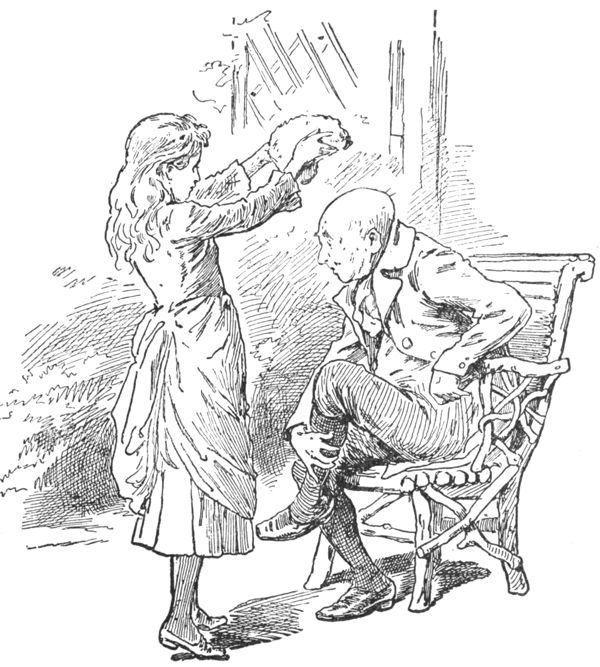
“Why, who is this? who is this?” he asked, peering into Kitty’s face. He had rosy cheeks, 90gentle eyes full of a gay light, and his lips trembled as if ready to break out into smiles and laughter.
“No, no; that is not a naughty child. Daddy Coax knows better than that.”
He shook his head so violently, to show he knew what he was saying, that his wig went first on one side, then on the other, and at last it tumbled right over his eyebrows. He did not seem to mind how his wig went. Kitty thought it looked like a thatched roof.
“Then you are Daddy Coax!” she said.
“To be sure I am, honey! To be sure!” the old man answered, laughing, and the laugh was so joyous that it set Kitty laughing also.
“They call me Daddy Coax because I pat the children’s heads when they are sobbing, and because I keep school with toys and sweets and stories instead of lessons.” He took out his snuff-box and took a pinch; then he sneezed and sneezed till his head sank upon his chest, and his wig came right over his eyes.
91“Oh, dear! oh, dear! Those children have put pepper into my snuff-box!” He laughed; nothing seemed to put out Daddy Coax.
“I wonder you live with them!” said Kitty.
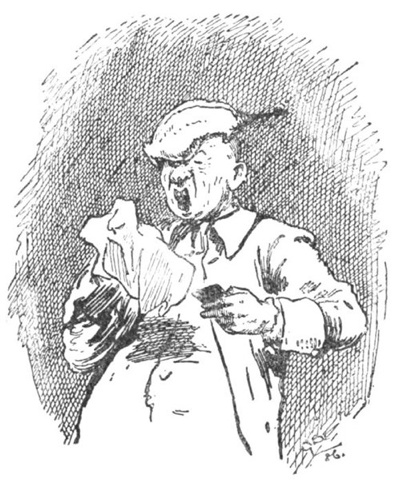
“I used to live in Good Children Land,” he answered, pushing back his wig and setting it all awry; “I was happy there; but you see I could not bear the thought of the naughty children. They must be so miserable. So I made up my mind to come and live among them, and whistle sweet tunes to them, and tell 92them pretty stories that would put beautiful dreams into their hearts, and give them toys. Bribe the little darlings to be good.”
“They are not very good to you,” said Kitty, looking at his tattered coat.
“No; I am often a mass of misery and rags,” said the old man; and as he looked at her a moist brightness like tears came into his eyes. He showed the skirts of his coat-tails all torn, his pockets ragged, his hands scratched. “I sometimes think I’ll go back to Good Children Land,” he continued. “Then I say they don’t want me there so much as they do here. So here I remain, and I don’t mind being scratched and pulled about, if only I keep one child out of Punishment Land.”
“Punishment Land!” said Kitty. “What is that?”
“Oh, it is a dreadful place!” said Daddy Coax, shaking his head till his wig slipped right off, and then he gave it a pull over to his right eyebrow. “I long to keep the children out of it. The little dears, I am sometimes afraid of them, when they are getting angry, 93and going to have a cry. They tell me I spoil them, and somehow the children don’t love me as I love them; but I have not the heart to see a dear little thing punished—not if it tears my coat-tails. Oh! I don’t know why they won’t love me. They say the little dears won’t respect me, and they say a dreadful thing, that one may be unjust by kindness as well as by severity. It often makes me sad.” Then he gave a little chirruping laugh.
“Ah! it makes me happy to coax the little dears out of their tantrums and their passions. There is great virtue in a big burnt-almond, my honey! Have one!”
He took out a transparent amber box full of bon-bons, and opened it.
“I think I had better wait till I am naughty to have one,” laughed Kitty. The old man laughed also, as if Kitty’s joke delighted him.
“Come and see Daddy Coax’s school-room,” he said, getting up.
Kitty put her hand into his little plump old hand, and they went indoors. The room was full of children.
94It was not like a school-room, nor like a play-room either. It was more like quarreling-room, screaming-room, sobbing-room.
Where the children’s hands could reach the room was spoiled and disordered; but above that it was as pretty as a room in a fairy tale, or as a Christmas-tree turned into a room. Bright balls shone there, some of silver, some of glass, rainbow-colored, like solidified soap-bubbles. There were bags of sweets, toys, flags in every corner. Wonderful shells, with golden ears, strange seaweed, and branching coral; flowers bloomed high up in the windows, and far out of the children’s reach in a safe place hung a cage full of birds. There were kaleidoscopes and musical boxes and pictures on the walls.
“Little angels! Hush—hush! Look, here’s a little friend come to see you,” said Daddy Coax, in a voice that was gay and soft as a bird chirruping in a tree, and calling to its young to come out into the pleasant morning.
Only a roar of confused voices answered. All the children were addressing the old man—all 95were speaking together; all were trying to talk loudest; all trying to talk quickest; all telling tales of each other.
“Hush—hush!” said Daddy Coax, putting up his finger. “Little lambs ought to be good. Eh!” he went on, patting his pocket with his disengaged hand in a suggestive manner. “Look—toys—sweets—all for my little darlings—a fairing for each. Hey now!” and he waved his hand above his head, “we’ll be as merry and good as if it were Christmas Day, and everybody’s birthday together besides.”
Perhaps the children had already had so many sweets and good things that they did not care for more. Not one look of thanks greeted the old man gazing down upon them with an anxious smile that seemed to say: “Be good, my little darlings. My heart thinks only of making you good by making you happy.”
The next moment there was a grand rush of children making for Daddy Coax’s pockets, with cries of “I! I! I!—me! me! me!” The rush turned to a battle royal between the children who came first and the children behind, who were hurrying up.
96“Hush! hush! naughty to quarrel!” said Daddy Coax, feebly trying to make his way through the combatants, dealing loving strokes on rough heads, and uttering tender reproaches in a cooing voice. “Let me get to my arm-chair and we’ll have a distribution of treasures. Hullo!” he exclaimed, bending over a roaring boy and patting him gently on the back. “Poor laddie—Daddy Coax’s laddie—and he has been hurt—he has—”
“No—o—o,” roared the boy louder, and kick—kick—kick went his angry feet. “I am not hurt. I am—in a fu—u—ry!”
“A fury! Oh! oh! naughty,” said Daddy Coax, shaking his head till his wig was all in a flurry of reproach.
“I wanted to see—what—made my tin frog—hop—and I broke—the spring. It won’t hop any—more,” roared the boy, and kick went his feet, trying to kick Daddy Coax’s shins because they were the nearest things to kick.
Daddy Coax began to fumble in his pocket, and as he fumbled, louder grew the roarer’s shouts; but he opened slits of eyes to see what Daddy Coax was searching for.
97Out came the amber box, and out of it a crisp sugary almond.
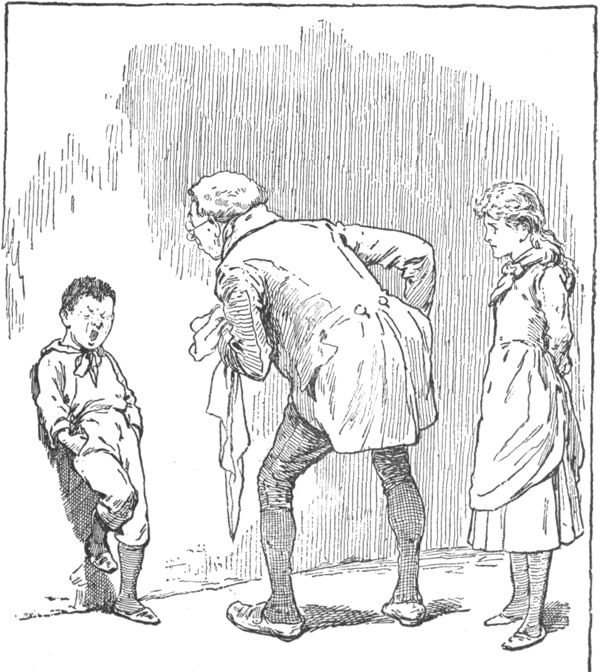
“There, that will sweeten the fury,” said Daddy Coax, chuckling over his little joke.
98The crunching of the almond softened the screams, and Daddy Coax winked at Kitty.
“Did I not tell you, honey, there was virtue in a sweet?” he said, gleefully rubbing his hands.
“I believe more in a whipping,” replied Kitty with a gleam in her eyes.
Daddy Coax now made his way to a corner of the room where stood a tiny bed. As he bent over the child lying there, murmuring “Poor little sick lamb,” his kind, foolish eyes grew brightly pitying.
“I won’t take my medicine,” said the invalid, shaking a resolute head on the pillow.
“Medicine will make Daddy Coax’s sick lamb play again,” said the old man. He took up a powder and spoon, and after he had mixed the dose, “Good medicine first and jam after,” he said in a persuasive voice, softly trying to get the tip of the spoon inside the firmly closed lips.
Out flashed a naughty hand from under the coverlid, and away spun the medicine and the spoon to the furthest corner of the room.
99“Oh, naughty! naughty!” said poor Daddy Coax, putting up his finger and trying to ruffle his forehead into a frown. “If sick lamb be naughty, sick lamb will have no jam.”
At this dreadful threat the sick face puckered itself up, and out of the wide-open mouth came a doleful howl.
Daddy Coax fell into a dreadful flurry; his mild eyes grew full of pain. He took the child out of its crib, rocked it soothingly in his arms, murmuring softly:
“Sick lamb shall have all jam and no medicine. All good jam and no naughty medicine.”
“All go—oo—od ja—am and no naugh—ty medi—cine,” agreed the sick child with big sobs.
Gently Daddy Coax put the invalid back into its crib, went to the cupboard, and took out the pot of raspberry jam. He looked over his shoulder to make sure the child was not looking, and cautiously Kitty saw him drop the powder into the jelly and turn it round and round until not a grain was to be seen.
100“Good jam!” he said, smacking his lips. “Good jam!”
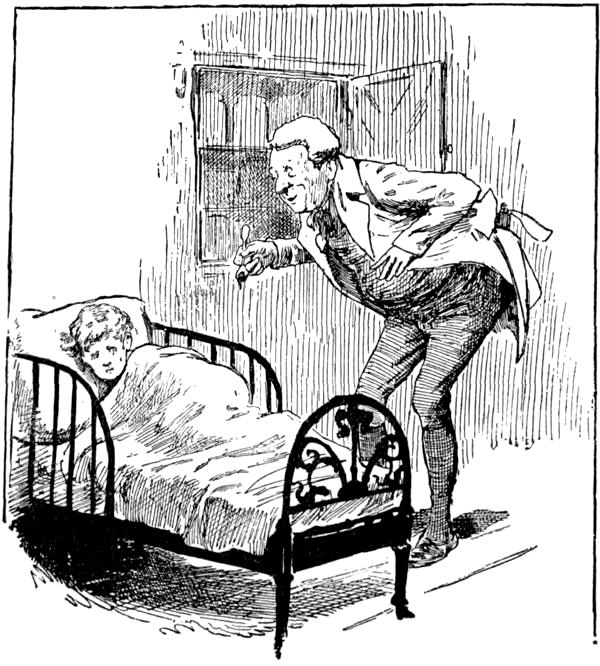
“Good jam!” assented the sick child, opening wide its mouth and smacking its lips louder still.
“It was to make her take the medicine,” explained 101Daddy Coax apologetically to Kitty. “I cannot bear to hear a sick child cry. It is sickness makes the little angel cross.”
“Little angel indeed!” replied Kitty shortly. “I would have given her all medicine and no jam.”
Kitty was growing severer and severer. Holding her hand the old man trotted along once more, struggling through the children, who had recovered their good-humor, and were rushing around him. He laughed feebly, he patted their heads as they thumped him on the back as if he were a drum, and squirted soapsuds into his eyes. Poor Daddy Coax wiped his eyes, sneezed, tried to look as if he enjoyed the jokes and the drummings, and presently nearly stumbled over a little girl who was knocking her doll’s head against the floor.
Bang! bang! the tiny hand struck the ground with the doll. Its nose was flattened out of all likeness to a nose, its cheeks were cracked, and its hair torn out.
“Dear! dear!” cried Daddy Coax. “What has naughty dolly done?”
102“She won’t get into her fock. She will put her leg into the seeve of her fock instead of her arm,” explained little spitfire; and bang! once more went poor dolly’s face against the floor.
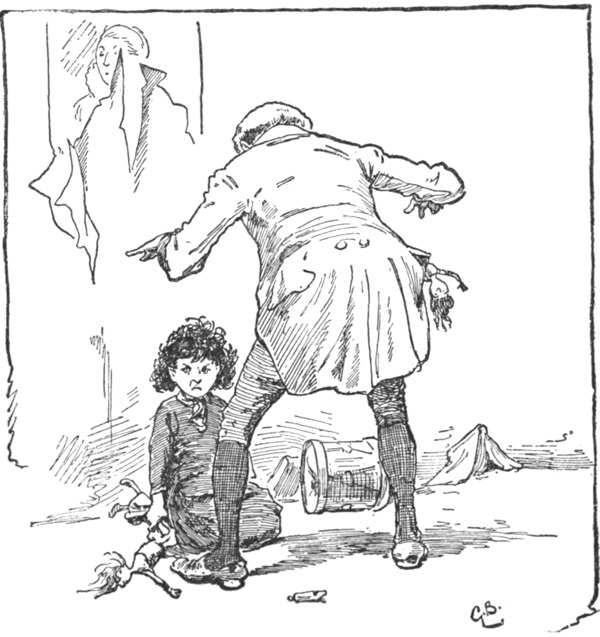
“Naughty dolly! naughty dolly!” cried Daddy Coax indignantly, flicking dolly with a corner of his handkerchief and then drawing a 103fine new doll from his pocket, with red cheeks and shining round eyes. “There’s a good dolly, a pretty dolly, with its arms in its sleeves.”
But little spitfire only snorted at sight of the new dolly, pushed away the gentle hand that offered it, and went on banging the old doll upon the floor.
Nothing that Daddy Coax could do would please the “little angels,” as he called them.
“Little angels indeed!” thought Kitty severely. “They are little imps.”
One little girl tumbled on her nose as she was hastening along; she picked herself up, and was giving her plump small figure a shake, when Daddy Coax, with a cry and extended arms, rushed toward her, dropping a slipper in his haste. At sight of this offer of sympathy the child lifted her voice and howled bitterly.
“Oh, the darling lamb!” cried Daddy Coax, taking her into his arms. “Is she hurt—where is she hurt? Show her old Daddy where she is hurt?”
“Ded—ful—ly hurt on this knee!” sobbed the little one, pulling up her frock and displaying 104a plump rosy knee without a scratch. “No! it’s a mistake—it’s on this one,” she explained with bitterer sobs, showing the other knee, that was as unbruised and unscratched as its fellow.
“Yes, it’s a mistake,” chirped Daddy Coax joyously, clasping the little one nearer.
“It—’s not—a—mistake—it’s my no—o—ose,” roared the child in a deluge of tears, slapping the kind old man’s cheek, and struggling out of his arms.
“Daddy Coax’s school should be called the place where children are taught to be naughty,” Kitty remarked to herself.
At last Daddy Coax struggled up to the middle of the room. He set Kitty standing on the table, and looked round on the children with his mild, kind, foolish eyes. There was some thing almost like silence for a moment; a crowd of small faces gazed at Kitty, who had never before felt so many eyes fixed upon her.
“When a friend comes to see one,” said Daddy Coax cheerily, “what ought we to do? We ought to make it pleasant, for a friend’s 105visit is better than cakes and sugar-plums. This little girl—bless her—is a dear, good little girl!”
“We don’t want her, then!” shouted a voice. And all the children shouted: “We don’t want her! we don’t want her!”
“Hush! hush! naughty!” said Daddy Coax, putting up his finger and trying to frown. “Little children are always good. They are little angels.”
“That’s not true. We are not good, and we don’t want to be!” shouted these spoiled children.
Daddy Coax stood looking round upon them with a puzzled, helpless, piteous expression and trembling lips, then he burst into his merry laugh and said to Kitty, “There’s no flattering them.”
Taking out of his pocket his box of sugar-plums, “Look, look!” he went on. “In honor of our guest I shall give you a comfit apiece.”
“Shall we tell her the stories of the pictures round the room?” asked Daddy Coax after the distribution of lollipops, as the children were smacking their lips and staring at Kitty.
106“No!” they cried with a sucking sound.
“No! But she has not seen the pictures yet,” gently insisted Daddy Coax. He pointed to one with his softly shaking finger. Kitty thought she had seen that picture before. It was that of a little girl sitting alone under the shadow of a great wood, her hands crossed upon her breast.
“She is so good, she is so innocent—bless her! The picture is called after her the ‘Age of Innocence,’” said Daddy Coax. “All nature seems to love her. She thinks as she goes out that the trees look at her, and the birds come and sing to her in the early morning. The flowers tell her what hour it is and what the weather will be. No animal or insect is afraid of her. As she goes out round her head hovers a little cloud of butterflies. She looks about her and wonders. The flocks of birds passing away over her head to the north pole actually seem to come down as she looks at them. Lovely things with the sunshine upon their backs—”
“That’s a dull story!” cried a boy’s voice.
107“Dull story!”
“Dull story!” went round all the room.
“Shall we tell her the story of the kind child, who gives her bit of cake to the hungry child, who is gentle also with the sick and the old, and how the pretty robin lights upon her wrist, and its little whistle seems to say, ‘I love you—I love you’?”
“Play the flute!” interrupted the same boy’s voice.
“Yes, the flute! the flute!” echoed the children in a chorus.
“They always like my flute,” Daddy Coax whispered to Kitty with a pleased wink. “I don’t take it out often—for next to the children I love my flute.”
He drew from his breast-pocket a flute with keys of ivory and wiped it softly on his coat-sleeve. “I’ll play the lullaby of the wind to the good children. The words and the music came into my head last night as the wind rattled against my window-panes. Listen, I’ll sing you the words first—that is, what the wind says through the flute to the good children.”
108Nodding his head on one side, with one finger up, swaying it softly to the measure, in a thin cracked voice Daddy Coax hummed:
“That’s enough! enough!” cried the children; but Daddy Coax went on, marking the time with his finger and his head:
109“Play the flute! the flute!” cried the children.
But Daddy Coax raised his uplifted finger and marked the measure more impressively:
“No—no—no!” interrupted a roar of voices. “Play the flute!—the flute!”
Daddy Coax laughed, gave his wig a pull, and put the flute to his lips. He drew out a note—long, piercing, and sweet. The children paused to listen. Daddy Coax swayed softly backward and forward; his eyes were half-closed, his wig shoved over his left eyebrow; he tapped with his toe, which went up and down to the tune. It was a pretty, tender melody that seemed to wind in and out. The children were quite silent listening. Something in Kitty’s heart that she had forgotten stirred there—it was memory waking—that of 110her mother’s voice speaking to her as in a dream. She had forgotten where she was, when she was suddenly roused by a great noise.
The children were surrounding Daddy Coax, pulling his arms, clambering up his back, getting around his legs to pull him down, as they shouted, “Give us the flute!—give us the flute!”
But he held the flute out of their reach, shaking his head and saying:
“No, no, the little dears would break it. It is like a pretty bird; if you break it, you kill it. When it is dead, it will sing no more.”
But the children continued to pull, to clamber, and to clamor.
“You naughty children, to hurt the kind old man!” cried Kitty, jumping down from the table and coming to the rescue of Daddy Coax. Her efforts to protect him were of no avail. The next moment the children tripped him up. He fell down flat on the ground, and the flute was snatched from his hand. There was a loud laugh—shouts of hurrah. Then Kitty saw two boys fighting over the flute, and snap—it broke in their hands.
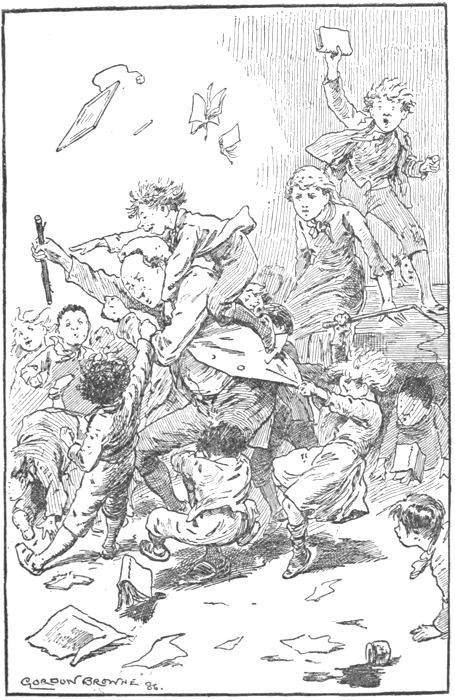
The Fight for the Flute.—Page 108.
113All at once the noise was interrupted, there came a scamper round and round the room. The two stern women stood there among the children. How they entered—by the door, or through the floor, or in by the windows, or down by the chimney—Kitty could not tell. There they were, pouncing upon the children, who were vainly dodging to escape them.
Daddy Coax struggled to his feet, battered, bruised, and in rags.
“Don’t take the little darlings to Punishment Land,” he said with his whole heart in his voice. “Poor little angels, they did not mean it. They did not know how Daddy Coax loved his flute.” He put up his hand and wiped away a tear.
“Daddy Coax, if you did not spoil the children you would spare them many a punishment,” said one of the stern women, stopping upon the threshold and turning round to speak. She had a load of children tucked under each arm. They might kick as much as they liked; it did not trouble her. She held them tight as a vise.
114“It was their fun. Indeed I liked it,” said Daddy Coax apologetically.
“Don’t put your foot into Punishment Land,” continued the stern woman. “Once you were allowed in, and you nearly ruined the place. Take my word for it, Daddy Coax, you are a goose, and the children know it. As for you,” she went on, addressing Kitty, “you had better run away, or you will be spoiled too.”
“Well, she is severe,” thought Kitty; “but she is right.”
She watched the old woman with the load of children under each arm striding down a long road that led away from Daddy Coax’s door.
“That must be the way to Punishment Land. Oh! I should like to see that land!” cried Kitty.
Daddy Coax, bruised, tattered, looking as if he had just come out of a dreadful railway accident, was picking up, with trembling hands, the fragments of his broken flute. Kitty ran to him, helped him in his search; then led him 115gently back to his chair, threw her arms round his neck, and gave him a kiss.
“Good-by, dear Daddy Coax, I am going to Punishment Land—just for a peep.”
She heard him give an exclamation of remonstrance; but she would not stop to listen. She ran out into the road.
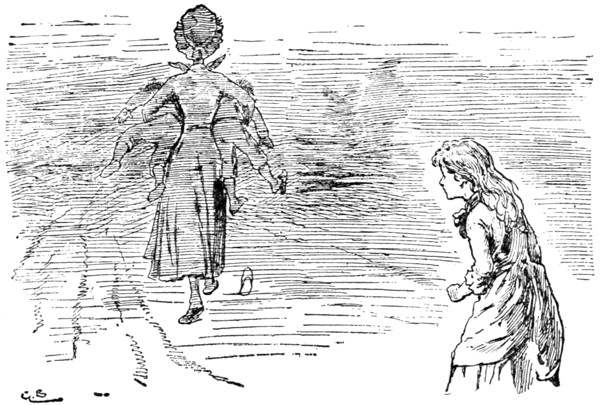
As Kitty darted out of the door she could see the old woman going on with her burden of kicking children tucked under each arm. It was by no means easy to follow her tall, bony, wiry figure, for she went at a great pace, as though she had a very important duty to do, and meant to do it. The children might kick their shoes off, but on she went. She was never very distinct, yet she never entirely vanished. The road was long and straight; over it hung a mist that seemed to be getting deeper and thicker. Kitty ran along, her eyes fixed upon the old woman’s back; but she stalked on so fast there was no catching her up. At once she vanished. The country around was gray and dreary, not a tree, not a house anywhere, nothing but a gray marshy-looking 117plain. A little stream gurgled along, not with a happy murmur as if it were telling joyous secrets to itself; but glug—glug, as if it were sobbing in the dimness. Kitty jumped over the stream and cleared it at a leap. A few frogs croaked. What with the “croak—croak” of the frogs, and the sob—sob of the water, it was quite enough to make any one weep.
Kitty had been running so fast that she could not stop herself, or perhaps she would not have been in such a hurry to cross that doleful stream.
No sooner she had bounded over to the other side than a grim woman stood before her. She appeared so suddenly that Kitty gave a start and stopped running. Was it a real woman? Was it the fog that had taken this shape? Kitty could see distinctly a face peering out of the mist, surrounded by gray hair and a high mob-cap. Perhaps this was owing to her attention being fixed upon the large pair of spectacles astride the hooked nose.
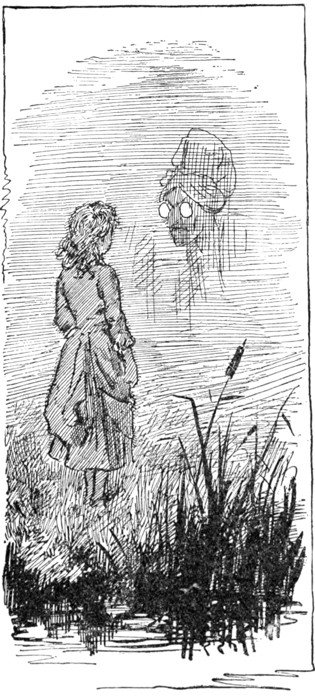
In all her life Kitty had never seen such 118spectacles. They shone with extraordinary effect through the dimness, as if they focused all the light of the place, and it was impossible to see the old woman’s eyes behind them. No, never had Kitty seen anything so piercing, so searching as those spectacles! When they fixed their gaze upon her she had an uncomfortable feeling that she was transparent like the glass jars in the chemist’s shop, and that the eyes 119behind the spectacles were seeing her through and through, right to the other side of her.
“Who are you?” asked the mouth belonging to the spectacles, in a business-like tone. “I hate wasting time asking questions. My spectacles usually spare me that trouble. But I can’t make you out. Who brought you here?”
“Nobody brought me here—that is, nobody except myself,” explained Kitty, who felt impelled to be very accurate under the inspection of those shining glassy eyes.
“Humph! Now that you have brought yourself here, what punishment have you come for?”
“Indeed,” replied Kitty eagerly, “I do not want any punishment—on no account.”
“Not want a punishment, and yet you come to Punishment Land!” repeated the old woman, with a smile curling up the corners of her lips. It was not a pleasant smile. It made Kitty feel a little creepy. “You might as well say,” continued the mouth belonging to the spectacles, “that you knock at a doctor’s door, and don’t want medicine.”
“Perhaps I had better go back,” said Kitty 120hurriedly, for she did not like the tone of the conversation.
She looked round, but she perceived that the fog had risen and formed thick walls all round the place. She was in a prison of fog.
“But you see you can’t go back,” remarked the old woman. “Here you are, and here you must stay. May I ask,” she continued, fixing the full glare of her glasses upon Kitty, “if you did not come to be punished, what did you come for? Come, you had better have a whipping; it will do you good anyhow.”
“I came,” said Kitty, ignoring the last suggestion, and feeling ashamed of the reason she was going to give, “I came to see the naughtiest child, and to see how it was punished.”
The old woman smiled sourly. It was certainly a most unpleasant smile. It curled up and up, until it seemed to curl up into her ears. Kitty felt a cold shiver go down her back.
“You’re all right for that,” answered the old woman cheerily; “walk on; you’ll find the naughtiest child here.”
121She disappeared as she said this; but the next moment she popped her head out of the fog again. “Good-by, Miss Curiosity. I hope you’ll enjoy what you’re going to see. Curious little girls don’t always enjoy what they find out.”
Her spectacles flashed as if they were laughing, and once more she disappeared.
“Miss Curiosity indeed!” said Kitty, tossing back her head.
She walked along with her cheeks on fire. Perhaps the mist had cleared away, or her eyes were growing accustomed to the grayness, for she could see about her. She was in a wild, flat field, utterly lonely and loveless, without a blade of grass or a flower, nothing but thistles and thorns. It stretched far away, solitary and pathless.
“I wish I had not come,” muttered Kitty, feeling frightened at the solitude. Then she thought she would go back to the old woman with the spectacles. She was not pleasant, but she was company. No glimpse of the old woman could she catch. She was alone in the 122lonely plain. Alone! and yet Kitty fancied some one was near her—some one quite near, that she could not see or hear. But who was there behind the fog?
“Why did I come? Oh! why did I come?” she asked herself, trying to remember why she had set out on this foolish quest. “I am curious! oh! I am curious!”
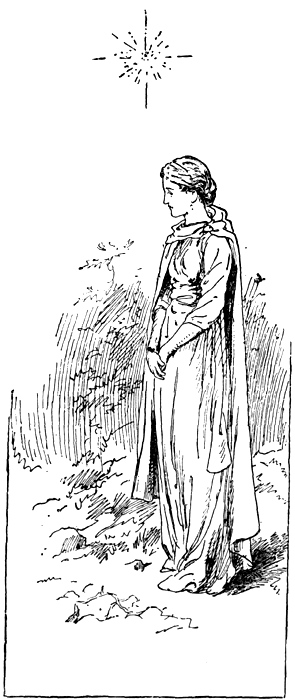
The tears filled her eyes and trickled down her cheeks when she said this, with a sudden feeling of humiliation in her little heart. As she stood there crying and looking about her, not knowing what to do, she saw some one coming toward her. A lady all dressed in white, whose pure robe trailed on the ground. For a moment Kitty’s heart gave a great bound, for she thought it was her mother. Then she saw the lady was a stranger; that she had a beautiful face, sad and majestic.
As Kitty wondered who she was, the stranger drew near. “Who are you? Why have you come to this sad place?” she said, looking at Kitty with eyes so tender and penetrating that Kitty felt as if their light were sinking into 123her little heart, reading all its secrets. The pale lady could see as deep as the old woman with the flashing spectacles.
“I came,” answered Kitty, hanging her head, “because I wanted to see the naughtiest child.”
“The naughtiest child! That was a dreadful wish!” said the fair lady, and she sighed.
It seemed to Kitty that the sigh was repeated all around 124and about her, as if a thousand sighs caught it up and echoed it behind the mist.
“Come,” said the white lady, “you shall have your wish.”
She led the way and Kitty followed; and it seemed to Kitty, as her guide’s fair robes trailed on the barren loveless ground that a track of flowers bloomed for a moment as she passed, and that fruit appeared among the thorns and brambles.
Kitty wondered more and more who this pale lady could be.
“What is your name?” she asked at last looking up into her face.
“My name is Love,” the pale lady replied.
“Love!” repeated Kitty in the greatest astonishment. “Love in Punishment Land, where there are whippings and puttings to bed!”
The pale lady smiled; her eyes were like the stars that keep their patient watch at night over the earth.
“They are not children whipped and put to bed early, and kept at lessons, that I shall show 125you. You have a little soul.” She laid her gentle hand on Kitty’s shoulder. “Every child has a little soul, and here you will see what happens to that soul when it grows sinful. Look yonder.” She pointed to the wall of fog. “There the souls will look like bodies, and you will see.”
Love stretched her fair hand, and Kitty could not tell if the fog grew transparent, allowing her to see what it had hitherto hidden, or if a picture painted itself thereupon.
Her eyes, fixed upon the dim mist, seemed to open wider and wider.
She saw a dreadful thing. An immense cobweb, and in it a child was caught. A big black spider was weaving its threads around the captive. Hand and foot the little one was bound. Kitty saw the child’s figure distinctly; its pretty hair shone through the web. How cunningly the spider had entangled it; weaving and knotting its gluey thread about the round throat, the bright eyes, across the rosy lips, the tiny ears, hands, and feet. The child did not stir; it remained quiet in its gray, filmy prison. 127But there were other children in the fog, some entangled in webs almost as large and strong, while others had but a silver thread or two gleaming about their necks and brows. These played merrily about, not seeing the black wary spider watching above their head, and every now and then shooting out, spinning and knotting a thread about them.
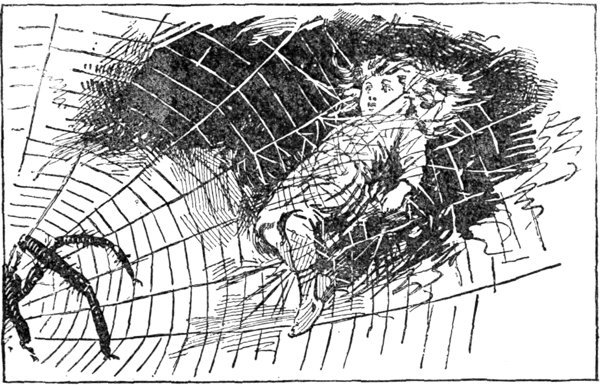
“What is that dreadful cobweb?” asked Kitty in a whisper, drawing nearer to Love.
“Speak to the children; they will tell you,” replied her guide.
But Kitty only crept closer to her, and drew 128the fair robes around her, peeping fearfully out from her hiding-place.
“I will explain,” said Love. “These are the children who tell falsehoods. Every falsehood a child tells its spirit gets more and more entangled in a web. The spider shoots a thread around it. One falsehood leads to another, so the web grows and grows, and the little captive spirit finds it harder to escape from its wretchedness and misery.”
“Can they never break away?” asked Kitty, drawing a breath of relief as the fog-picture slowly faded and the mist closed over it like a curtain.
Love’s face was sad and its meaning difficult to guess. Before she could answer there came a sound of little feet through the fog, a faint tramp, tramp. Not a merry run or dance; but as if restless, invisible little feet were going round and round, backward and forward. Then Kitty saw the image of something forming itself on the fog. Round and round, zigzag, to the right, to the left, rose a structure with walls made of thorns.
129“What is that?” she whispered.
“Do you know what a labyrinth is, or a maze?” asked Love.
“It is a place very difficult to get out of,” answered Kitty; and she grew quite giddy looking at this rolling, crooked, curving, spinning-about, straightening place.
Presently she saw that it was crowded with children. It was the tramp of their little feet she had heard, for they were running, running.
“Why, that is not punishment, that is play,” said Kitty, astonished.
“Speak to them,” answered Love.
Some of the children were running with quite a spirited air, as if they were enjoying the race; their heads were uplifted, their chins poked out; others plodded on wearily with a dogged expression, while some looked angry and miserable; and others again seemed dazed and wandered foolishly up and down, going backward and forward about the same spot. Tramp, tramp, went those impetuous, tired, foolish feet. Kitty advanced a step or two, 130then some of the children trooped up toward the spot nearest to her. “We want to get out! We want to get out!” they said in fretful voices that sounded a long way off yet were quite distinct. “We want to get out! We want to get back to Obedience Path,” they repeated, looking anxiously at Kitty, as if they thought she might show them the way out of this labyrinth.
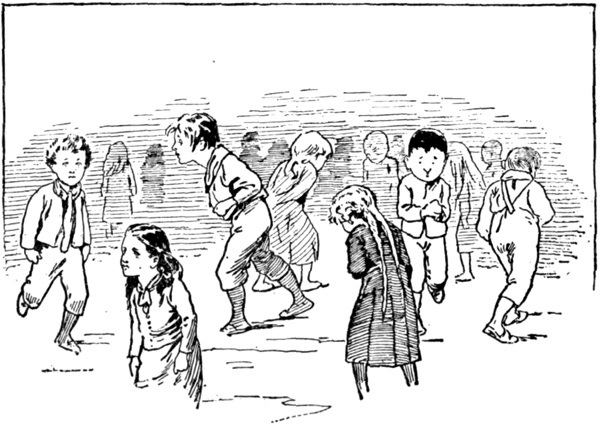
Kitty looked eagerly about to see if she could help them to find the right path; but every pathway was so turning and twisting, so crooked and intricate, that it made her giddy to try 131and follow its curves and caprices. She shook her head sadly, and the children then left her, and tramp, tramp went those restless little feet.
One child alone remained behind, going backward and forward like a little bird flitting about the door of its cage.
“I want to get out! I want to get out!” he said plaintively.
“What is this place?” asked Kitty.
“It is Disobedience Maze,” said the child in a thin, clear voice. “We are the disobedient children, and because we would follow our own way instead of the one that we were told to go we have lost the Path of Obedience. I would go to the right when I was told to go to the left. I would go back when I was told to go on. I would do what I was told not to do, and one day I found I had got into this miserable place, which is so full of dreadful troubles, and thorns, and twistings. I am so tired! I am so tired! I want to find my way to Obedience Path.”
Even as he spoke the vision began to fade 132and disappear, and the sound of the little feet grew fainter and fainter. Only the childish voices asking to “get back into Obedience Path” seemed still to float out from the fog curtain that had stolen over the scene.
Kitty felt very sorry for those poor children tramping in Disobedience Maze, and restlessly seeking the way out.
“Won’t they ever get out?” she asked with tears in her eyes.
“Every child has a chance,” answered Love. “But, hush!—wait—you will know by and by.”
Kitty saw that another vision was forming on the fog. She saw a cold, gray, flat plain strewn with what looked like lumps of ice very queerly shaped. Over the plain moaned a shivering sound like that of the wind. “I—I—I!” It turned to a shrill whistle. “Me—e—e—me—me!”
As the vision grew clearer Kitty perceived that what looked like lumps of ice were really frozen children. Some of them were just turning into ice. They were motionless, as if frozen 133to the ground; but the eyes of all were living, peering, hungry eyes, turning here and there with alert watchfulness. Their hands were also alive; they were black and blue with cold, but stretched out, opening and shutting, clutching at everything they could lay hold of, such as the bits of sticks or rags that strewed the ground.
There was something terrible and grotesque in the sight of those ice-children, motionless but for their keen eyes watching, and hands grabbing, clutching. Kitty now perceived that their lips moved also, and that they and not the wind uttered that shivering “I—I—I! Me—me—me!”
“Who are they?” she whispered.
Once more Love motioned to her to speak to them; but Kitty drew back. She was as much afraid of talking to them as she had been to the child in the cobweb. It was like talking to dead children. As she shrank away the shrill, airy voices began a song her nurse used to sing as a reproach to her when she was selfish:
They sang it together, but all in a different key and in a different measure, so that the effect produced was a shrill discord, as if rasping rattles, and wheezy whistles, and cracked stringed instruments were playing in concert, but each on its own account.
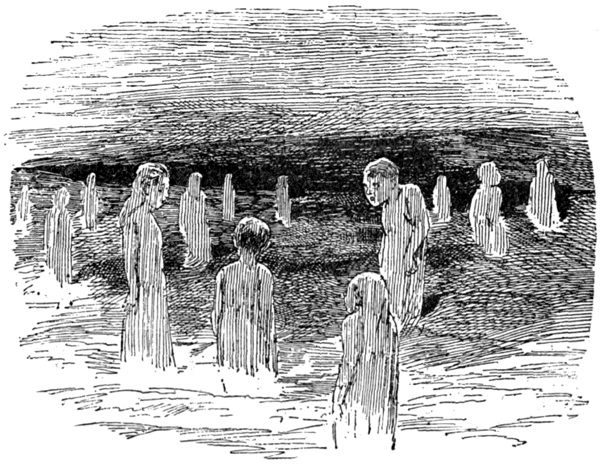
“Well, I must say,” cried Kitty, forgetting 135her fright, “if I sang those ugly words, at any rate I would sing them in time and all together.”
“We never do anything together,” said the child nearest to her, who happened not to be quite turned into an icicle. “We always cry when others laugh, and laugh when others cry. We always take all we can and do all we can to prevent others from getting anything. That is the way to turn to ice. Every time you do this your heart gets a little colder, a little harder, a little lonelier. It’s quite easy to turn to ice; you have only to think always of yourself.”
“But I don’t want to turn to ice on any account. I don’t want to be cold and hard and lonely. It is the very last thing I want. Nobody would love me,” cried Kitty indignantly.
“But I love myself,” said the ice-child, with a shiver. “I wish I could like what I grab,” it went on, turning beady eyes on the rags and sticks, gathered in a heap by its side; “but I cannot; I only don’t want any one else to have 136them. Oh, I wish I could thaw!” it said quite suddenly and unexpectedly.
“We wish we could thaw! We wish we could thaw!” sighed all the children together; and the vision faded, slowly faded away.
“Won’t they ever grow warm again?” asked Kitty, blinking away some tears.
Love looked almost as sad as when Kitty had questioned her about the cobweb, and her face was as difficult to read.
Now there came from behind the fog curtain a sharp sound of smackings.
“Whippings!” said Kitty with a gleam of fun in her eyes that dried up the lingering tears.
But it was not whippings that the fog vision showed. Again she saw a crowd of children, and each child was boxing its own ears, pulling its own hair, pinching, biting, scratching its own hands or face; making grimaces the trace of which remained. Kitty recognized some of the children she had seen in Daddy Coax’s schoolroom. There was the child who had slapped his kind old face: she was slapping 137her own with vigor. Slap, slap on each cheek sounded the smack of the little furious hands. There was the boy who had tried to kick Daddy Coax’s shins, kicking away—kick, kick—at his own.
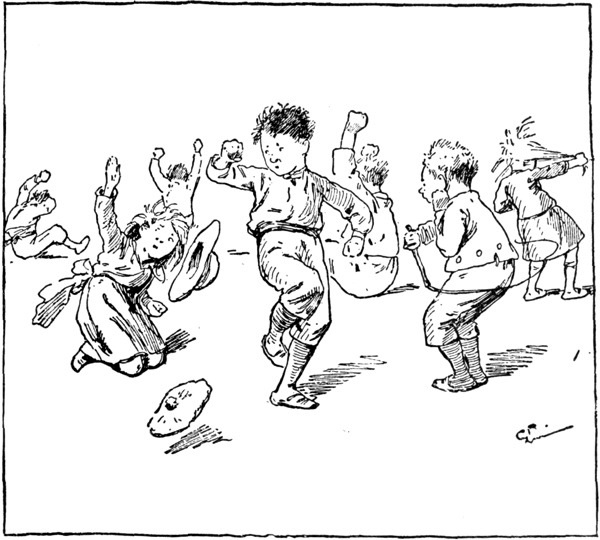
“That is a splendid punishment,” said Kitty, nodding approvingly and smiling broadly.
It was an extraordinary sight to behold, clinched small fists raised as if to hurt some one 138else suddenly turning round and administering a sound cuff, bang, bang on their owner’s ears; to behold those spread-out tiny fingers pulling away viciously at their owner’s hair. It was a sight ludicrous and yet sad. Such swollen noses, blackened eyes; such battered, bruised, wounded children, inflicting great misery upon themselves, making themselves so ugly by grimaces that left their mark behind.
“Who are you?” cried Kitty, much excited.
“We are the passionate, willful, ungrateful children,” said a boy whom Kitty recognized to be the one who had broken Daddy Coax’s flute. He looked dismally at her and then gave himself two big thumps, one on his nose and one on his ear. “Never you hurt others, especially those who are kind to you. It’s yourself you hurt all the while,” he went on. “It’s dreadful pain when you come to feel it! dreadful! and you can’t leave off, you must keep on hurting yourself, not till you get the kiss of forgiveness. I should like to see dear old Daddy Coax again. I should like to give him a kiss and to tell him I am sorry.”
139“We are sorry,” cried all the children, and their cry still sounded as the picture faded away.
“Who gives the kiss of forgiveness? Will they ever get the kiss?” asked Kitty anxiously, for she had changed her mind about the punishment.
“There is one day in the year when every child can get it,” said the pale lady.
Before Kitty could ask another question she saw that another picture was appearing in the fog. The ground was strewn with pretty feathers of birds, with smashed speckled eggs, with cozy nests all spoiled. Hosts of lovely butterflies flapped about with crushed wings that thoughtless little hands had broken. Dream pussies, looking starved and in pain, haunted the place, curving their backs as if coming to be stroked and to rub themselves against friendly legs. Faithful-eyed dogs limped about. The mist seemed full of pipings of sorrowing birds, of reproachful mews, of pitiful whines, and all the children seemed grieved. Kitty recognized some of those who 140had dragged her along and would have robbed the bird’s nest.
“I know those are the cruel children. I hope they will be well punished,” said Kitty.
“They are punished. Look at their tears,” said the pale lady. “They did not know the pain they gave, because they did not think. Now they know when they have killed one of God’s dear innocent creatures they cannot mend it again, as a toy can be mended. They cannot mend the butterflies’ wings. They cannot give back the poor little yellow-beaked young to the grieving parent birds.”
Kitty saw that some of the children were shutting their ears not to hear the pipings and other cries of pain; others closing their eyes not to see the dead birds, the wounded cats and dogs. She presently perceived that a little girl was speaking to her. She recognized the child who could not speak distinctly, who had killed the butterfly.
“I am always seeing it. It flaps about me,” moaned the baby voice. “It keeps saying to me here, ‘I was so merry that day. The sun 141was shining and I was going to see how my friends the daisies were getting on, and if the buttercups were golden as yesterday. I was playing, as you love to play, and just as I was merriest, with the sunshine on my wings, you came and struck me like a big hammer. I had never done you any harm, and I was so merry.’ Oh, I wish I could make it live again! I wish I could make it live again!” moaned the baby voice.”
“The birds are worse, whose nests you have robbed, and whose little ones you have killed,” cried a boy. “They keep flying about you. They won’t leave you alone. They scream in your ear, ‘Good, good world! happy, beautiful world, but for the cruel children in it.’”
“It is I who am the most miserable,” sobbed another boy.
He was running as if trying to escape something pursuing him, closing his eyes and shutting his ears, while an ugly dog, with big flabby paws and a nose like a black quivering mushroom, one ear with a slit in it, and a tail something like a curled-up sausage, followed him, 142always jumping, always trying to lick his face.
“Was that your dog?” asked Kitty.
The boy stopped. “Yes, his name was ‘Trot.’ He loved me, he trusted me, he followed me wherever I went; but I grew ashamed of him, for every one called him a cur. The other boys laughed at me and nicknamed me ‘Master Mongrel,’ so I made up my mind to get rid of him. Twice I managed to lose him, but he found his way home, and when he saw me he licked my hand and nearly wagged off his tail with gladness. One winter day I took him off for a long walk; he trotted trustfully by my side as if it were a holiday. I took him to a wood a long way off, and I tied him to a tree with a cord and left him there. I did not mind his whines and his howls; I left him there. That night it came on to snow; I tried to be glad; I was pleased to have got rid of him. Next day it still snowed. I thought I would go and fetch him home. I went to the place where I had left him. I could not find him, it was like a graveyard of snow. I dug and dug in the snow 143with my hands, I dug till I found him. He lay quite stiff. I whistled and called ‘Trot.’ He just opened one eye, gave his tail a little wag, put out his old tongue and tried to lick my hand, and died. Oh, I wish he was alive again! I wish he was alive again!”
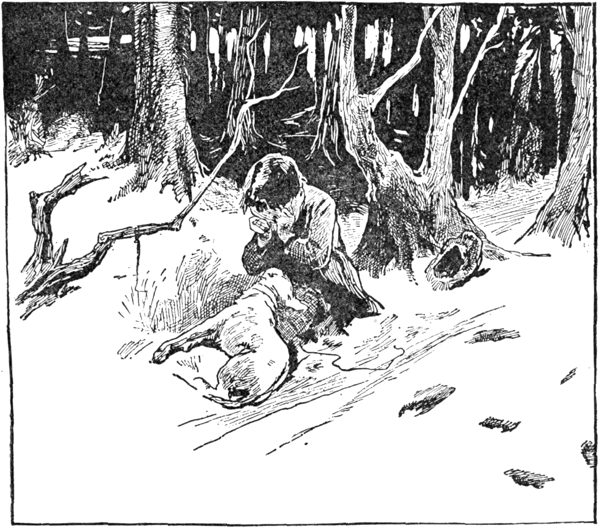
The mist closed over the picture as the boy repeated his unavailing wish.
“When will they have the kiss of forgiveness?” asked Kitty with a little sob, for now 144she knew that the punishment of those children was hard. They were to feel the innocence and trustfulness of the creatures they hurt, and to realize all the happiness they had destroyed.
“There is one day in the year—Christmas Day!” said Love.
“Christmas Day!” repeated Kitty.
She tried to remember when Christmas Day would be: was it to-morrow, or next year, or next week? Was it in spring, summer, autumn, or winter? What season was it now? She had forgotten everything. Everything had slipped from her mind but the thought of the children in Punishment Land.
Was it because she thought of Christmas Day that a delicious smell of hot jam and cakes stole through the fog, as the picture began to form?
“That cannot be part of Punishment Land!” exclaimed Kitty, watching the vision growing there.
She saw a place where tarts grew on bushes and candies strewed the ground, where the flowers sparkled with sugar, where there was a 145river of syrup on which a boat of chocolate lay at anchor, and sugar swans curved their long necks. A bird flew out of the fog; it fell down ready roasted on the ground. A little rabbit scampered along, then suddenly it stood rigid, turned to candy. A cowslip ball was tossed out of the mist; as it fell, it became a plum-pudding stuck all over with almonds.
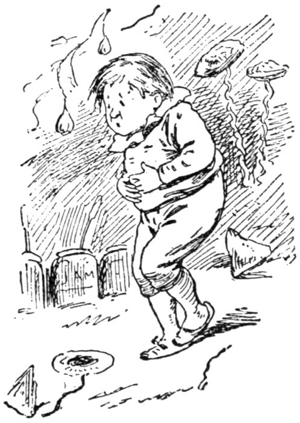
A number of children were in that pleasant place, but they did not seem to be enjoying it. Their faces were the color of boiled cauliflowers, and they rubbed their little stomachs with a very dismal expression, sighing: “Oh, that nasty sweetmeat! Oh, that dreadful pie! Oh, that tart! that jam! Oh, to be hungry again and relish a mug of milk!”
A faint and querulous voice addressed Kitty.
“Take my advice and never eat a tart. I 146shall never eat one again when I leave this place, never.”
She saw that the speaker was the little lad she had met in the lane and whose conversation always turned upon plum-cakes and sweets. He shook his head warningly and woefully as he spoke.
“I should have thought this is just the place you would have liked,” she said.
“It is a dreadful place. You have always a lump here;” and he rubbed himself round and round. “I begin to hate sugar. I can’t touch anything but it turns to sugar. I can’t play because I feel so ill, and I can’t think because my head feels like a pudding, and when I go to sleep I have dreadful dreams. Listen, there are the dreams coming! Oh! oh! oh! and I am going to sleep, to sleep.”
Kitty heard a rustling. She thought the dreams would come through the fog. Not a bit of it. Out of tarts that hung on the bushes, out of the pebbles, the sugar flowers, the syrup river, the chocolate boat, they came, growling, squealing, squeaking, jumping, trotting, whirling, 147hopping. Old men with very hooked noses, and legs like asparagus, waving about dreadful bottles of medicines. Old women with gray wisps of hair and green-eyed black cats on their shoulders. Red imps making somersaults and waving their arms like windmills, children with whiskers, frogs as big as shoulders of mutton, with eyes on fire, pigs with bristles like porcupines. All these phantoms filled the picture on the fog. They jumped upon the children’s chests, and presently there was a sound of long, dreary snores. The fat pig with the bristles jumped upon the boy who had been speaking to Kitty. “Grunt, grunt,” went the pig. “Snore, snore,” went the boy, and to these sounds the vision slowly faded away.
“Well, I don’t wonder he does not care for tarts any more,” said Kitty, who felt rather inclined to laugh, although she flicked away a tear. Even Greedyland picture was sad.
And now she perceived that another picture was beginning to appear. It was that of a lovely landscape. There were trees, and running water, and blooming flowers. Children 148filled this pleasant spot. But they did not seem at all happy. Some glanced about them in a frightened fashion. The greater number presented a most dejected, even a disconsolate appearance, while a few sat apart, keeping their eyes tightly screwed up; their faces were all puckered to keep those eyes tightly closed. As she looked at the children she recognized some of those she had seen looking into the pool and singing to their own reflections.
“Why, what is it they do not want to see?” asked Kitty, glancing about to discover if anything terrible lurked among the trees and flowers.
She looked up to Love, but once again Love motioned to her to speak to the children.
Kitty advanced nearer. “Why do you keep your eyes shut?” she asked a little girl who was sitting with her eyes tightly closed.
“Don’t speak to me. I won’t look at you,” answered the child with a resolute shake of her head, but without a quiver of her eyelids.
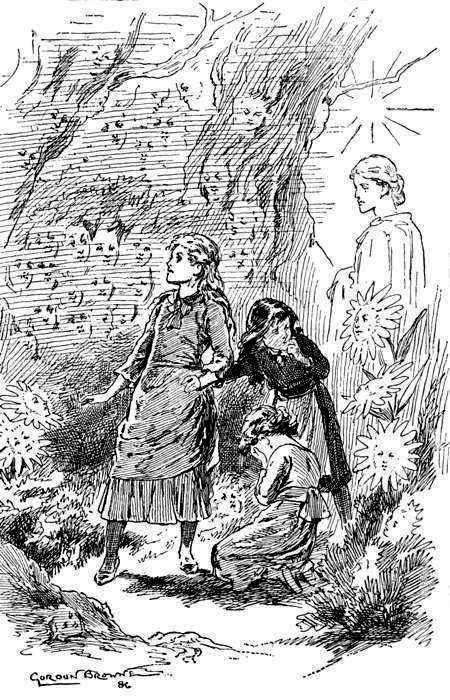
Faces! Faces!—a World of Faces!—Page 145.
Another child came running up. She waved her hands and pointed up and down and all 151around, saying, in that thin piping voice Kitty was getting accustomed to hear:
“Don’t you see! don’t you see!”
Kitty looked, rubbed her eyes, and looked again. Yes—no, there was no mistake. Faces everywhere. Faces! faces! faces!—a world of faces! All those children’s faces smiling, blinking, nodding; up in the sky, down on the ground. On every flower, on every blade of grass, on every leaf of the trees were faces.
Kitty began to laugh, the effect was so comical; for as the leaves of the trees tossed, the flowers nodded, the water flowed, there were the most extraordinary effects. The faces now melted into each other, now were topsy-turvy; noses came where eyes should be; the hair seemed to grow on chins; the mouths climbed up to the forehead; sometimes it was like a world of faces seen reflected in a vast teapot, nothing was seen but noses and slits of eyes.
“Don’t laugh,” said the child plaintively. “I can’t see your face. It’s myself I see when I look at you.”
152“Really,” exclaimed Kitty, “that is most extraordinary!”
“I never see anything but my face, never. We all see our own faces everywhere, wherever we look.”
She glanced, as she spoke, toward a sunflower, and, sure enough, Kitty saw the child’s little face peeping out of the big brown heart; upside down on a dock leaf; grinning from a thistle—there it was again.
“I wish I could see something else than my face,” sobbed the child. “I wish I could see something else.”
Then there rose a chorus of airy, unhappy voices repeating the same words: “Something else than my face; something else than my face.”
And the vision faded away, while in the air a crooning sound was heard, and the words of a lament:
Kitty turned to Love.
“Won’t it be soon Christmas Day?” she asked, for her little heart was full of pity, and she longed for all those children to receive the kiss of forgiveness.
Love smiled, and her smile seemed to hold out a promise that it was near; but she did not speak the words, and when Kitty looked again toward the mist wall there was another picture forming itself there. If ever there was represented a vision of an untidy, jumbled-about place, there it certainly was plainly seen on the mist. Such a litter of rags, crumbs, broken toys, writing implements, and books! What was most remarkable were the lessons that were coming out of the books, and taking walks on their own account about the place, and mingling among themselves in the queerest manner. A bit of the map of China had settled 154itself down in Yorkshire, and there was Denmark planting itself in the Desert of Sahara; Ireland was on the top of Mount Vesuvius, which was beginning to rumble frightfully and emit huge puffs of smoke. As for history, Kitty found it quite impossible to follow its freaks; but she saw distinctly Julius Cæsar was signing Magna Charta, and the Crusaders were fighting the battle of Waterloo. Grammar and sums were trying experiments of such a complicated character there was no finding out what they were driving at. In the midst of this place sat a number of children; they had a muddled-up air, as if the walking-about lessons were too much for them. Their mouths dropped open, their eyes half-closed; they were all in tatters. They looked ashamed. If they pulled their sleeves down to hide their dirty hands, crack came a great rent at the elbows; if they pulled down their stockings into their boots to hide the holes at their heels, out peeped their knees.
“You are the untidy children,” said Kitty, nodding. “Well, you are in a muddle.”
155“It was all our laziness,” said the child nearest to where she stood. He sighed so pitifully that Kitty wished to cheer him up a bit.
“Why cannot you set to and put things straight?” she asked briskly.
“Can’t,” said the boy.
“Can’t,” sighed all the children.
“Look,” said the boy. He stretched out his leg; all the children stretched out their legs. Kitty saw they had turned to stumps.
“That is because we would not run,” he muttered mournfully. “Look,” he said again. He put out his hands; all the children put out their hands. All the fingers were joined; they were like hands in boxing-gloves.
“That is because we would not use them,” explained the boy in the same dismal voice.
“As for our ideas, they are gone to sleep, and are walking about in their sleep and won’t wake up,” said the boy.
“And won’t wake up,” floated the sad, slow voices out of the fog, closing over the scene.
“I wish Christmas Day would come,” cried Kitty. “Don’t you think they have been punished enough?”
156She looked toward Love, and Love’s face was illumined with a smile like a sunbeam.
“I am so sorry for the naughty children,” said Kitty with a sob. “I wish the time had come for them to receive the kiss of forgiveness.”
Love laid her hand on Kitty’s head, then gently touched her ears.
Lo! faintly Kitty heard the sound of joy-bells tinkling. Sweet bells! happy bells! ringing clearer and clearer, nearer and nearer, till all the air seemed full of their pealing and clanging.
“Christmas bells!” exclaimed Kitty breathlessly.
Love lifted her finger. “Hush!” she said.
Hush! Kitty heard a sound. It was at first like that of the wind rising; it grew more distinct, and it was that of a hustling and a bustling. Little feet running, little feet shuffling; their airy tread sounded in every direction; it came from the right, it came from the left, it came from all around.
Nearer and nearer, quicker and quicker they seemed to come, those eager, running, scampering, flying feet. And presently Kitty saw the children. Hosts of children; any number of children, leaping, rushing headlong toward where Love was standing.
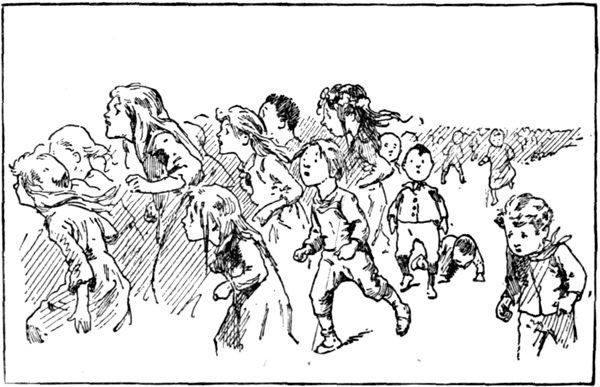
Out of the fog they came; out of falsehood’s net, torn cobwebs hanging about their necks, their hair, clinging to their clothes; tired children, bleeding and footsore, from Disobedience 158Maze; selfish children, white and hoary with icicles; cruel children, with tear-stained faces anxiously turned toward Love; passionate children, bruised and disfigured; greedy children, heavy-eyed and sallow; the vain children, with open-eyed gaze fixed upon the white lady; lazy children, in their unmended rags; it was quite astonishing to see how fast their stumpy legs could carry them. From all parts they came, nearer and nearer, quicker and quicker. Still they came, calling, crying, sobbing, entreating, “Give us the kiss of forgiveness.” They pressed toward Love, closer and closer; little 159arms outstretched, little faces upturned, little mouths pursed up for a kiss, and on all sides that sobbing cry, “Give us the kiss of forgiveness.”
And Love stretched out her arms and gathered the children into them, and kissed them one by one. As she kissed them the cobwebs fell from those who had escaped from falsehood’s net; the wounded feet of the disobedient were healed; the icicles melted and dropped away from the selfish children, who seemed dissolved into a rain of tears; the passionate children lost their disfigurement; the greedy children grew rosy; the vain children cried out with glee as, looking around, their own faces no longer popped out to greet them; the rags of the slovenly, idle children were mended; their legs and hands grew supple.
It was a wonderful sight to see the children after they received Love’s kiss. Their eyes shone; they danced for joy; their hair seemed to stand out in a crest of light about their heads. Kitty fancied some bright presence must be hovering above them.
160Then Love folded Kitty in her arms and kissed her on the forehead.
That kiss was the strangest, sweetest kiss Kitty ever received.
It was sweeter than any comfit; it was pleasanter than any music to which her feet had danced; it brought a feeling of peace like that that came to her when her mother kissed her in the dark night; but this kiss also brought to her a sense of pain.
Something like fire touched Kitty’s heart, and stirred a memory that had lain asleep all this time. She had forgotten something. What was it? Vaguely she remembered the blue rose, the bullfinch, then suddenly her mother and Johnnie.
She had forgotten Johnnie. Johnnie, who was ill unto death, whose illness had come through her fault. She remembered it all now: how she had crept downstairs, and then she thought of the doctor’s words: “Christmas Eve would decide if he were to live or die.”
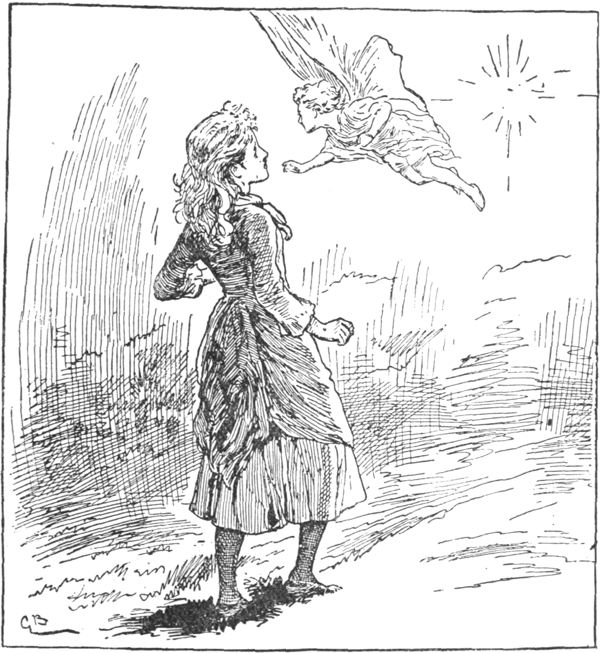
Why had she gone away from him? Would 161she ever get back in time for Christmas Day? Would Johnnie be alive or dead when she reached home? As she stood there, asking herself these questions with a yearning homesick feeling overflowing her heart, Kitty felt something brushing tears from her cheek. She looked up. A tiny child, with little pink 162wings, was hovering about her. He was clothed in a tunic made of a bit of rainbow, and his face was the face of Johnnie. He had rosier cheeks, and he did not carry a crutch, for his little legs were straight.
“Who are you?” asked Kitty.
The rosy-winged child laughed, and the laugh was Johnnie’s laugh. Kitty heard Love’s voice speaking.
“I have given you each a guardian child. It was born of my kiss. But another companion also goes with you.”
Over every child Kitty now saw that there hovered a tiny figure on rosy wings, clothed in rainbow drapery. She saw with surprise also that every child had another attendant crouching on its left shoulder, a small elfish figure, which every now and then appeared to her to be half-animal, half-child, and in a strange fashion to take the form of an animal that bore some likeness to the child itself.
“You do not know,” Love went on, “and it is no wonder you should not, for you are all so young, that you have each a higher and a lower 163nature. To-night is Christmas Eve: good and evil sprites are abroad, fairies and elves. Strange sights are seen. To-night the lower nature—the naughty self—of each of you here has taken the shape of a little goblin, and goes about with you in visible form.”
Kitty looked fearfully round to her own left shoulder, and there, sure enough, was a little kitten-like creature with pointed ears and roguish eyes. It sat up with a defiant air as it peeped round at her with a sidelong glance. It appeared quite playful, but as Kitty looked at it the brown creature lost its kittenish air, and it was a face like her own, but quite small, that she saw looking back at her with her naughtiest expression.
Kitty started; then she heard Love’s voice still speaking:
“You are going on a journey. You are all going home!”
“Home! home!” cried Kitty, and all the children skipped with joy.
“Your guardian child goes with you; but remember that other attendant,” Love said, and 164her voice was anxious. “Take care! It will always be on the side of temptation and against your guardian child. If you mind this sprite, which is your naughty self, it will grow stronger and stronger, and will drive away your guardian child.”
“We will not mind it,” cried all the children in a chorus.
“Your homeward journey will be difficult,” resumed Love. “It lies through a wood.”
“A wood!” echoed Kitty and all the children in tones of dismay. “How shall we find our way?”
“A star will guide you,” said Love.
She raised her fair hand, and Kitty and the children looked whither she pointed. A star shone through the mist. It was as bright as a diamond.
“Keep your eyes upon the star,” said Love. “Never lose sight of it, and you will reach home by Christmas morning. It will guide you aright through the perils of the wood. It is a difficult wood to go through; and it is easy when you are in it to fall back into Punishment Land.”
165“Punishment Land!” moaned the children.
“You will all start together, yet when you reach the wood you will find yourselves alone. Each must go through that wood alone.”
“Oh!” sighed the children again, all huddling a little closer to each other.
“There is no danger,” said Love, “if you keep your eyes on the star. Your guardian child will help you through the difficulties of your journey. Listen to what he says to you. He is my little ambassador. Do not listen to your naughty self. Do not dally on the way. Do not put off. If you quit the path, at first it may be easy to find it again, but it will grow more and more difficult, till it may be become impossible.” Then Love grew very solemn, and she lifted her hand in warning. “Do not play with the sprite. If you play with it you will hurt your guardian child, who may then leave you. Do not,” she repeated urgently, “play with the self-sprite.”
“We will not, we will not,” cried the children eagerly.
“No, indeed,” said Kitty, giving a little shove 166to her left shoulder. “I shall listen only to my guardian child. Dear guardian child, with the face like Johnnie.”
“If you disobey your guardian child it will grow faint, and remember you may kill it. Come,” she went on, “I shall go with you as far as the boundary of Punishment Land.” Love walked on toward the wall of mist, where shone the star. The children followed.
It was a strange sight to see those children following her, with eyes fixed on the star, and on the right shoulder of each little pilgrim the tiny rosy-winged, rainbow-dressed figure; and on the left the queer little half-animal creature. And as they approached the prison wall of that dreary land the star began to quiver and move. It looked like a bird of fire with quivering wings setting forth on its trackless sky-way.
“We come! we come!” cried the children. Run, run—what a hurly-burly of little feet rushing out of Punishment Land, setting forth on their journey home.
They turned and waved their little hands to Love. “Farewell! farewell!” she cried, waving 167her fair hand in answer. “Watch the star; obey your guardian child. Do not play with your naughty sprite, and you will reach home safe by Christmas morning, and win a Christmas blessing.” She smiled wistfully as she spoke.
The fog closed over Love’s figure, and Kitty suddenly found herself standing at the entrance of a great wood. She was alone. The children had all disappeared. And still through the fog floated Love’s voice—“Watch the star. Obey your guardian child. Do not play with your naughty sprite.”
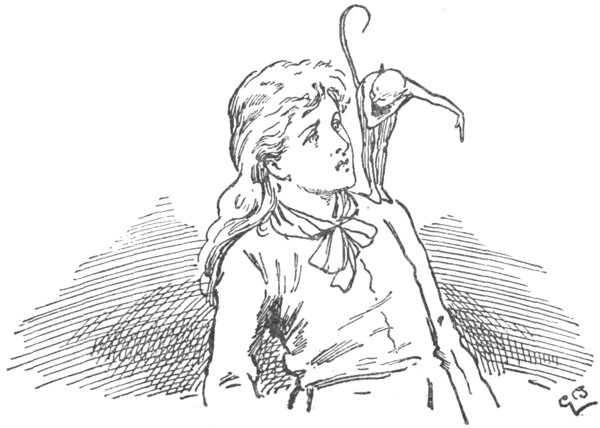
“I must hurry,” said Kitty, setting off at a run. There was a sense of haste in her little heart. Never before had she felt such a sense of hurry.
The star glided over the tree-tops; it seemed to be sailing along the sky. Steadily, steadily, but swiftly it held its even course high above the world, and all its troubles, and naughtiness, and folly, and as Kitty looked at it her feet seemed to move more quickly. Every now and then her guardian child stroked her cheek with his little pink wing, and whispered, “Hurry, Kitty, hurry, that Johnnie may get well on Christmas Day.”
Kitty did not peep round to her left shoulder; she had made up her mind not to give so much as a glance toward the creature crouching there. 169It was very quiet now. Kitty would scarcely have known it was there.
The star ran along in the sky. Kitty ran along on the path; her dress fluttered; her hair streamed behind her. Haste! haste! She must be home by Christmas morning. She must win that Christmas blessing, Johnnie’s health.
The road after awhile began to grow very steep. On—on, Kitty climbed bravely, her eyes fixed on the star, and her guardian child whispered, “Well done, Kitsy! well done, Kitsy!”
She fancied that as the road grew steeper the naughty sprite seemed to be uneasy and on the watch.
All at once the road led through the loneliest, shadiest spot she had ever seen. Green and softly the light came through a curtain of trees that locked their branches into each other. There were mossy dells through which the ivy crept and flowers spread. Red poppies flashed; purple hemlocks rose in clusters; faint-colored blossoms made a track in the grass as if the 170Milky Way had fallen from the sky and stretched there. A stream gurgled drowsily along, and dreamy white lilies rocked softly upon their leafy pillows. There was a drone and bu-zz-zz of insects through the air, and the swish of a distant waterfall that might be seen through the trees like a white curtain swaying softly.
It was just a spot to lie down in and doze, stretched upon the moss, with eyes shut, letting the soft light rest upon the closed eyelids.
Rest! rest! rest! was murmured in the air by the water, by the trees.
Presently Kitty heard a most extraordinary sound that rose slowly, then fell gradually. It filled the wood—it was all around her. She paused to listen. Was it the blowing of a gigantic pair of hidden bellows? No, it could not be. She went on cautiously, holding her head a little on one side. It must be the wind soughing through the branches of the trees; but as not a leaf was stirring, or a twig moving, Kitty came to the conclusion it was not the wind. What could it be? Kitty listened with 171all her ears, and she began to distinguish that there was quite a chorus of sounds. There were impressive rumbles and quick, short pants and deep mutterings as of wild beasts going on together. Just as she made this discovery she gave a jump, for all the noises ended in a snort, as of some fierce and furious animal. In a moment, all around, Kitty perceived the glare of eyes gazing at her. She saw nothing but eyes—no noses or mouths—nothing but eyes. Terribly wide awake, these eyes gazed at her with an aggressive stare. Kitty felt frightened and apologetic. She was about to drop a curtsey, when, just as suddenly as they had appeared, the eyes closed and vanished. The effect was sudden as though a thousand candles had gone out together. Again the panting, puffing sound began around her. “Well, it is a curious place,” she said; “I wonder what it is called.”
“Snore Corner—Sn—ore Corner,” said a voice quite close to her. It seemed like some one talking in sleep, so monotonous was it. Kitty came to a standstill. She peered about her. 172Then she sprang back, for she nearly struck against something that at first she fancied was an immense bat. It was hanging with its head downward from the branch of a neighboring tree. Looking closer Kitty saw it was not a bat, but a dwarf with round, green, blinking eyes, and dressed in a mouse-colored suit. She was not sure whether it was a human creature; but as it was hanging upside down her perplexity was not to be wondered at. It blinked its green eyes and gazed so steadily and vacantly at her that Kitty was not quite sure that it saw her. “Why do you hang down like that?” she timidly asked.

“One of us must keep awake,” answered the creature in a sleepy voice. “It’s ever so much easier to keep one’s eyes open with one’s head down. Try it.”
“Oh, but I feel no difficulty in keeping my eyes open,” said Kitty briskly, “unless I am very sleepy. But doesn’t it make your head ache?” she added thoughtfully.
“I am in a haze. You feel no ache in a haze!” said the creature, blinking solemnly. “All in a jumble and a haze—nothing like it—try it.”
“Indeed, that is about the very last thing I’d care to be in; in a jumble and a haze,” said Kitty indignantly.
“They would expect nothing of you if you were,” said the hanging-down creature; “for if they asked you a question in history, very likely grammar would come up, and for arithmetic perhaps you’d give them geography. Then they would give up asking you lessons. They would say that the lessons got all in a jumble.”
“I am sure they would give me more lessons,” replied Kitty.
174“Then you would grow more jumbled, more hazy—try it,” said the creature sleepily.
Kitty gave a jerk of her head and began to walk slowly on. “It’s no use talking to such a hazy creature,” she remarked in a mortified tone. “I wonder who he is?”
“Goblin Sloth,” whispered the guardian child. “Take care, take care!”
Kitty felt a drowsiness creep over her. She glanced toward the guardian child; he was standing very erect, looking about, as if on the watch for something to be expected.
“Keep looking at the star! Don’t look round!” he murmured anxiously.
The star was swiftly gliding along above the tree-tops, keeping on straight ahead, over a narrow rising path that went through this charming nook hollowing down on either side. The naughty sprite was rocking itself and singing a lullaby in a very go-to-sleep, purring voice, “Hush a bye, baby, mother is by.”
Kitty ran along, struggling against the sleepy feeling that was stealing over her.
“Why in such a hurry?” said a voice.
175It was a pleasant voice. A voice with a sort of oily gurgle in it.
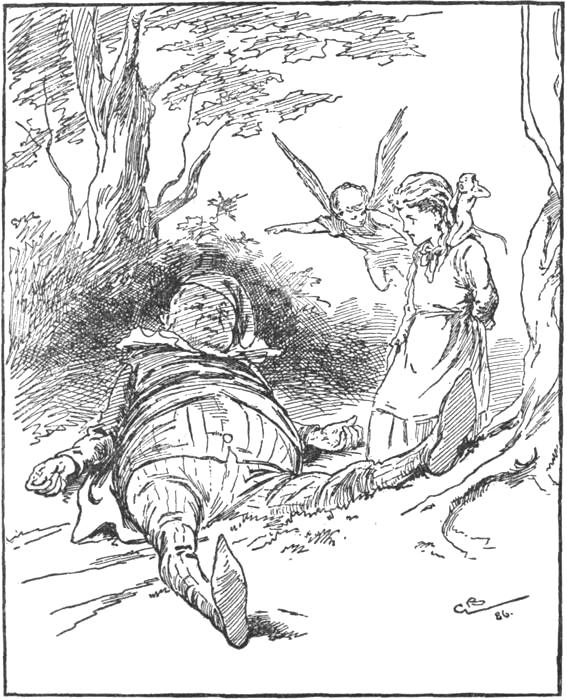
Kitty saw a short, round man lying in the moss, just by the side of the pathway, his feet 176stretched across it. She must jump over them, or she must ask him to remove them.
The man had a mild, melancholy, fat face, and half-closed peaceful eyes.
“Do not stop!” said the guardian child.
“I am afraid you are one of the fussy sort,” said the mild man in an easy-going sing-song voice.
“Would you kindly remove your feet? for I am in a very great hurry,” answered Kitty with decision and politeness.
“Hurry!” sighed the mild man, not stirring an inch. “What a mistake!—a dreadful mistake—everybody is in a hurry nowadays—always in a hurry!” His quiet eyes rested more and more dreamily upon Kitty. They seemed to forget what they were looking at, and to slumber gently.
“I am not always in a hurry,” Kitty explained. “But to-day I am in a very great hurry.”
“What a mistake!” snoringly sighed the melancholy fat man. “Nothing can be enjoyed in a hurry. Take the highest delight—a yawn!”
177“A yawn!” repeated Kitty, and she burst out laughing. The sense of haste seemed falling away from her.
“A yawn!” insisted the mild man, who had not removed his slumbrous eyes from Kitty’s face. “Only a very few know the pleasure of a yawn. There is yawning and yawning.”
“Ye—es!” yawned the naughty sprite—“dee—li—cious!”
“Do not put off any longer!” whispered the guardian child, pulling Kitty’s hair to wake her up. But Kitty felt as if lead were at her heels.
“Just one moment and I’ll make up for the delay,” she murmured.
The flabby mild man continued speaking in a monotonous sorrowful voice. “Very few know how to yawn. Some yawn only when they cannot help it. They slur it and blur it, and go to sleep over it. Some are ashamed of yawning and conceal their faces; some”—and now a flicker of reproachful animation brightened the dreamy eyes of the speaker—“yes, some swallow their yawns.”
178“I am doing that now,” said Kitty, who had never felt so drowsy in all her life. She heard, as at a distance, her guardian child’s voice sighing, “The star is disappearing!—the star is disappearing!”
“Come, give us a lesson in real yawning,” said the naughty sprite caressingly.
“Real yawning requires time and deliberation,” said the flabby man in an up-and-down voice. “You must begin at the beginning; you must go on to the end. First you will feel a little shiver, like a caress of velvet hands on your forehead; your mouth will open, then all your being will seem to grew larger, and wider, and longer. Every sense of hurry and flurry will pass away; still your mouth will open wider and wider, till it comes to a delicious gape.”
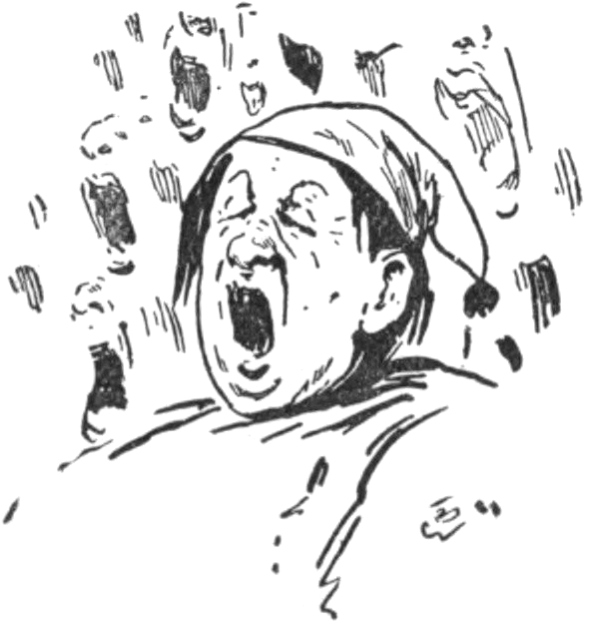
“Ya—aw—aw—awn!” the naughty sprite was yawning. His ears dropped behind his 179wide-swelling neck; his body was stretched: his month was—open—open, showing all his pointed white teeth down to his red throat.
“Ya—aw—aw—awn!” the mild, flabby, dreamy man was yawning, slowly, sonorously, solemnly.
Kitty stretched out her arms and yawned.
“Ya—aw—awn,” echoed all around. Yawns were everywhere—in the stream, in the trees, in the flowers—everything was yawning except the guardian child, who pulled at Kitty’s hair and whispered more and more eagerly in her ear:
“Do not put off any longer. No Christmas blessing if you put off.”
“Put off! put off! put off!” drowsily whispered the air around Kitty.
“I am coming!” said Kitty; but she did not stir. She blinked away the yawn-tears that smarted her eyes. “Oh, dear!” she yawningly sighed, “I should never get to my journey’s end if I remained here long.”
“Dream that you have reached the journey’s end,” said the mild man. “Day-dreams are the 180only reality. Day-dream lessons are lovely. School-room lessons are always wrong, but day-dream lessons are always right. No mistakes anywhere, no blots anywhere—fine flourishes to all the letters—all the pride of school-room lessons well done—and no trouble.”
“Lovely day-dream lessons!” drowsily murmured the sprite, curling itself up in a little sleepy heap.
“Lovely day-dream lessons!” murmured everything around.
“Lo—v—vely—day-dr—” began Kitty, her head nodding.
“No Christmas—no blessing—no Johnnie!” moaned the guardian child.
Kitty felt it rise from her shoulder—a sudden fear woke her up. She looked round; he was fluttering away, his eyes fixed on the star that was disappearing behind the brow of the hill. The guardian child had lost all his rosiness; the little pink wings were pale; the rainbow tunic faded; he looked as Johnnie looked when Kitty thought he was dying.
“Day-dream lessons are falsehoods,” shouted 181Kitty. In a moment she was wide awake; she had bounded over the stumpy legs that stretched across the path.
As she did so a faint peal of Christmas sounded in her ear. The guardian child fluttered back to her shoulder; it perched there light as a bird, and at every step Kitty took it grew rosier and brighter again. The naughty sprite growled.
The path was very steep, but Kitty ran panting along. “I nearly put off too long,” she said ruefully when once more she stood under the star, and she relaxed her speed to take breath. “That fat man’s talk sounded so pleasant.”
“That is the worst of temptations; they have always so much to say for themselves,” said the guardian child. He spoke in a troubled voice, and Kitty noticed that he was standing up very erect and looking ahead anxiously.
The sprite had apparently got over his ill-temper, and he was now pleasantly sniffing the air.
“I wonder if there is some danger coming!” 182said Kitty. “I am warned, anyhow. I won’t be tempted again.”
Presently she perceived a little brook babbling across her path; but she was running at such speed she could not stop herself, and at one bound she sprang across the stream.
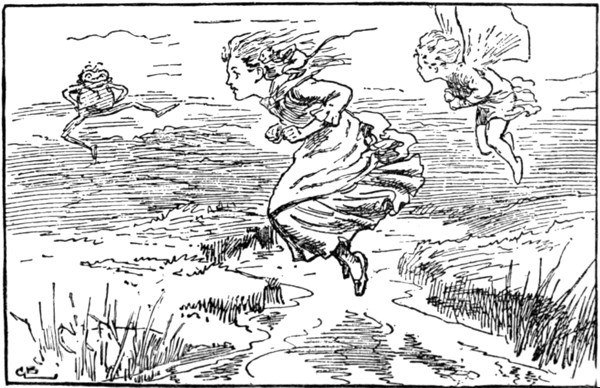
“I am beautiful! Oh, so, so beautiful!” said a hoarse voice.
Kitty, looking round, saw—well, she could not say what sort of a creature she saw—as she had never seen one like it before. It bore a sort of resemblance to a frog, but that was perhaps because it wore a green coat and a bulging shirt-front; then it was a very large frog, as big as herself. It had a human face—a broad, bland, beaming face—with a smile that seemed to curl all round it. In her life Kitty had never seen such a steady, satisfied smile.
The green-coated creature wriggled and twisted itself till Kitty thought it would wriggle and twist itself out of existence. On beholding Kitty it made her a low bow, and said with a flourish of its hand:
184“Admire me and I shall admire you.”
“Oh, but I don’t want to be admired,” said Kitty, trying to smother a laugh. “Indeed, indeed, I don’t want to be admired.”
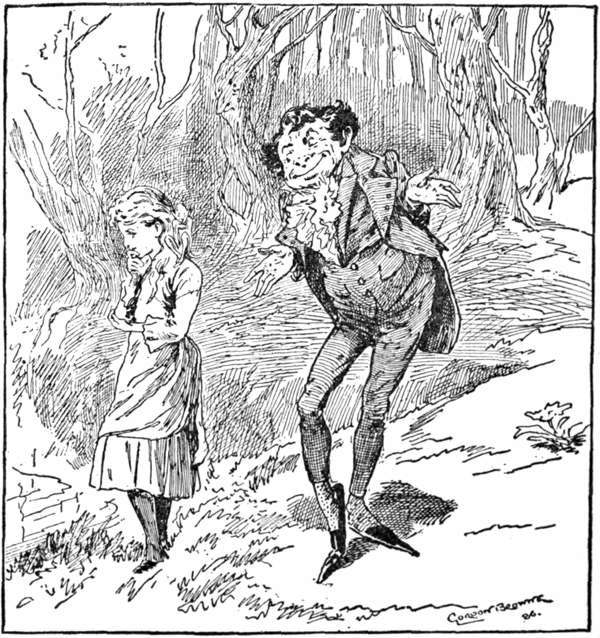
“Not—want—to—be—ad—mired!” exclaimed the frog-like one, throwing itself back, sticking out its left leg, and uplifting its two 185arms in an elegant attitude of dismay. Yet for all its dismay it continued to smile.
“I think it would be dull,” said Kitty, speaking slowly to keep her voice steady. “It would feel like having one’s best frock always on, and being afraid of jumping about.”
“But that is the very way; the very only way you ought to strive to feel,” cried the frog, wringing its hands in an agony of earnestness; “always as if you had your best frock on.”
“It would be very dull,” said Kitty in a tone of conviction; “very dull! just as if one were always sitting or standing for one’s photograph.”
“But that is just the way one ought always to sit or stand, as if one were having one’s photograph taken. The very, very, very only way.” The force of its conviction affected the frog so profoundly that tears filled its goggle eyes; still it continued to smile.
Kitty was wondering how it could weep and smile, when it put its feet in the third position of dancing and made her a low bow.
“You have summed it all up in two sentences: 186to feel always as if you were wearing your best frock and having your photograph taken. That is what we ought all to strive to feel. You understand me. Tit for tat, I understand you. Let us dance.”
Kitty felt her finger tips taken by those of the frog. She did not like to withdraw them, and the next moment she found herself dancing a stately minuet. Step, twirl, bow, and courtesy. The brook played the accompaniment, the branches above swayed to the measure of the dance; Kitty and her partner danced on. The naughty sprite twisted and frolicked with them. Step, twirl, bow, and courtesy. In all her life Kitty had never made so many courtesies.
The frog’s contortions grew more and more extraordinary, and still the brook babbled, and still the branches swayed in tuneful accompaniment to the stately dance.
Was it her guardian child who whispered in Kitty’s ear, “Christmas Day! Christmas Day!”
“Dance! dance!” said the sprite, skipping with glee. But Kitty stopped in the middle 187of a courtesy, the sense of hurry overtook her. “I beg your pardon,” she said; “I must stop dancing now.”
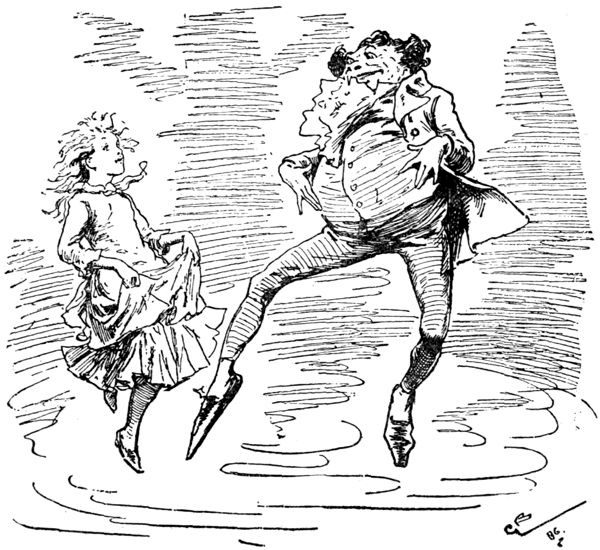
Her frog-like partner took no notice. Step, wriggle, bow, he went on as if he did not hear, and Kitty walked away. When she turned to look the creature was still twisting, stepping, bowing.
188“Conceited thing!” she muttered. “He is so filled up with himself he does not miss me. He does not know even that I am gone. I wonder what he is?”
“Goblin Vanity,” whispered her guardian child. “Take care!”
Kitty now gave a cry of surprise as she saw the prettiest garden. It stood to the left in a hollow, away from the path over which brooded the star. It was such a quaint, sweet garden, full of flower-beds and laid out in smooth lawns, and bowers, and lovely hide-and-go-seek places.
A glass palace glittered at a little distance. A fountain tossed its bright waters like a silver plume; swans swam in and out of the spray, peacocks strutted on the greensward. Kitty thought she had never in all her life seen a garden so inviting. The sound of delightful musical boxes tinkled from afar. All at once a crowd of children came dancing out of the glass palace. They looked like fairies, their dresses were so glittering, their movements so graceful. They all beckoned to Kitty.
189“Do not look toward them! Look to the star!” whispered the guardian child.
“Bother the star! What harm is there in looking toward that pretty garden and those merry children?” muttered the sprite.
Suddenly there appeared on the path a step or two in front of Kitty—she could not tell how he came there or whence he came—the prettiest little boy. He had a rosy mouth and laughing blue eyes. He wore a white suit all embroidered in flowers of lovely tints; his hair was frizzed and curled.
“We are all waiting for you,” he said in a coaxing voice, stretching out his hand to her.
“For me!” exclaimed Kitty, very much surprised.
The boy took her hand. She was so much astonished that she did not hear her guardian child sighing in her ear, “Beware! beware!” or feel the sprite dancing on her left shoulder.
Before she knew what she was doing she was running down into the garden. The moment she reached it the sound of musical boxes burst out louder; she was surrounded by little boys 190and girls who looked at her with sparkling eyes. Indeed, it seemed to Kitty that everything looked at her: the peacocks on the sward, the swans on the water, the birds hovering in the air or peeping down from the branches, looked at her; the flowers and grasses stood up on tiptoe to gaze at her. She felt quite uncomfortable at attracting so much attention; she wished she had not gone out in that old school-room blue serge gown, and that the blots on her holland pinafore were not so very conspicuous.
But no one seemed to mind her shabby appearance. On the contrary, everybody and everything was bowing to her. The children bowed, the peacocks bowed; the swans, the trees, the flowers, the grass bowed.
“Why are they all bowing?” asked Kitty.
“They are all bowing to you because you are the prettiest little girl in all the world,” answered her guide. He said it very seriously, and he looked at her with admiring bright eyes; everything and everybody murmured, bowing lower and lower before her, “The 191prettiest little girl in all the world.” Kitty was not sure whether she was standing on her head or on her heels. Her cheeks grew as red as two red roses.
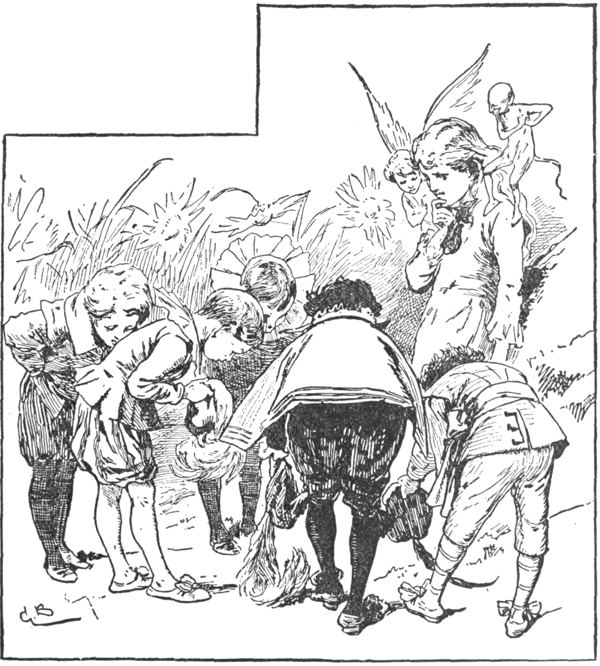
“De—e—light—ful to be so pretty!” murmured the naughty sprite, striking an attitude, setting its left paw on its hip, and rolling its eyes.
192“Do not believe what they are saying. You have freckles and a little cocked nose,” whispered the guardian child.
Kitty felt her nose to feel if it was really cocked; it was cocked.
“That glass palace is mine. The walls are made of mirrors. You will see there how beautiful you are,” said the boy, who still held her hand.
“In the glass palace you will see,” cried the children.
They joined hands round Kitty and danced more and more gayly, more and more quickly. The music grew merrier, and the sound seemed to get into Kitty’s head and into her feet. It set them dancing and made her feel giddy. Little joy bells seemed beating in her ears. They were not Christmas bells. “The prettiest little girl in all the world!” they seemed to ring again and again, backward and forward, so that she could not hear the guardian child’s sigh, “Silly, silly Kitty!”
The boy pulled her along, the dancers pressed around her and pushed her softly toward the glass palace.
193There came a sound of singing.
“Listen,” said the boy; “everything is singing about you.”
Sure enough, the children, the birds, the breeze, the peacocks, the swans, the grasshoppers, sang, murmured, screamed, hummed:
“Violets!” murmured Kitty; “and Cousin Charlie said they were no bluer than skimmed milk.”
“And nurse keeps calling it a mop!” Kitty muttered with some indignation.
“Just like her,” grunted the naughty sprite. “But we are now with people who appreciate us.”
Kitty was so absorbed thinking of how little 194nurse and Cousin Charlie admired her that she missed the next verse, until it came to the last line, then she heard:
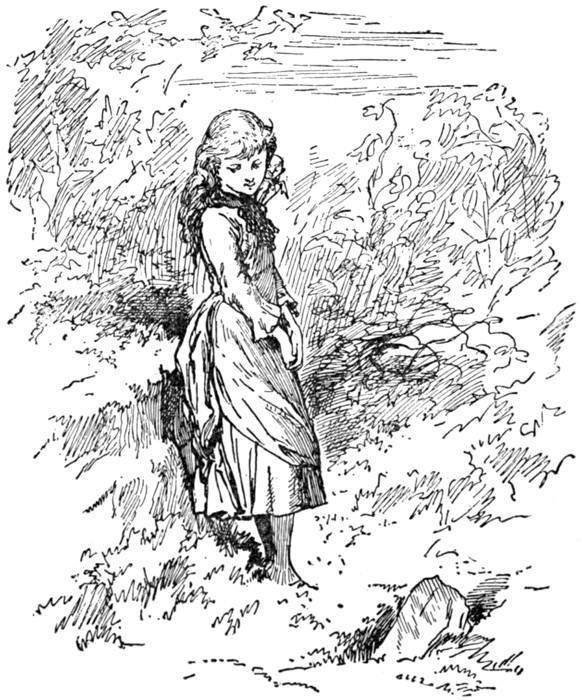
“This is Kitty’s dainty nose.”
“Oh! I wish I had heard what they sang about my nose,” she exclaimed regretfully.
195“Your dear funny cocked nose,” whispered Johnnie’s voice a long way off.
Kitty started. How faint her guardian child had become. He was just a pale, glimmering, hovering figure.
“That is a false song you are singing. My eyes are not violets, my hair is not gold, my nose is not—” Kitty stopped breathless; she had not heard what they had sung about her nose.
“Resist! resist!” cried the guardian child, who had flown back to her shoulder.
“Resist those kind children, who admire you!” growled the sprite reproachfully.
“Pretty Kitty!—our Queen Kitty!” cried all the dancers.
With a laugh they lifted Kitty from her feet and carried her toward the palace. As she approached she caught sight of her face reflected on a sunflower. She saw the sprite standing up very straight on her left shoulder, with chest puffed out, and head perked jauntily on one side. She thought of the vain children in Punishment Land.
196“Help me! help me!” she cried to her guardian child, struggling to her feet and beginning to strike out right and left and on every side.
Valiantly the guardian child answered her cry. With his rosy wings, with his tiny hands he fought for her, and the tempting children fell back; sometimes closing round her again to whisper “Pretty Kitty, pretty Kitty.” The sprite whispered, “You are pretty, you are pretty,” and tried to hold back her hands in the fight.
But still she struggled, and still her guardian child helped; until at last she found herself, all bruised, standing in the narrow ascending path over which hung the star.
“We are in time, Kitsy! we are in time!” the guardian child sang happily, pointing to the star, and again there came on her ear that peal of distant Christmas bells.
“Silly!” hissed the naughty sprite.
“I shall never stray from the right path again—never!” said Kitty, wiping away some repentant tears. “I can’t understand myself 197liking that silly song. I was really beginning to believe I was quite beautiful.”
And Love’s words came to her mind: “If you put off, it may be easy at first to resume the way; but it becomes more and more difficult, and it might be impossible.”
“No. I shall never leave the right path again,” she repeated, with great emphasis. “Never.”
She hurried along once more. She ran, oh, so fast! It was like a race between the star gliding above the tree-tops and the little feet speeding, hastening along the path below.
“Oh, what a delicious smell!” she suddenly exclaimed, opening wide her nostrils and taking a deep sniff. Then she gave a great start.
And well she might start, for in the midst of a kind of steamy odor, like the essence of fifty kitchens of fifty hotels, added to fifty pastry cooks’ shops and fifty fruit gardens in the sun, she heard a gurgle which turned into a voice.
“Good to eat! Roasted, stewed, boiled—which shall it be?” said some one who popped out and laid a hand with such suddenness upon her shoulder that Kitty almost dropped with fright.
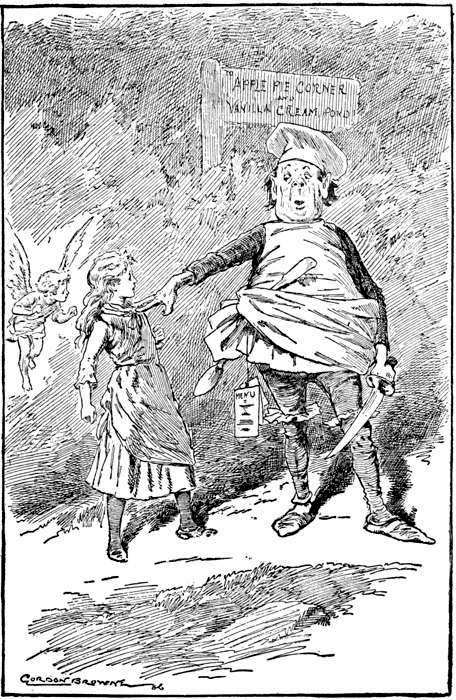
Apple-Pie Corner.—Page 193.
The creature who held her so tight was dressed from head to foot in white linen; he wore an apron and white cap like a French cook. He twirled a knife, and looked at Kitty with a pair of bloodshot eyes. His cheeks were purple and pendulous, his figure was flabby and fat; it suggested two suet puddings placed 201on the top of each other, and set upon a pair of legs. What with his pendulous cheeks and his bloodshot eyes, he reminded Kitty of an overfed pug dog.
“Indeed, I am not at all good to eat—not in any way,” said Kitty with an attempt at dignity, but in a quavering voice.
“If you’re not good to eat, then you are ready to eat. Eat or be eaten—that is all life in a nut-shell.” The creature chuckled.
Kitty felt rather nervous under the glance of his rolling red eyes, so she did not like to suggest there was something else to be done than to eat or be eaten.
“Would you please tell me,” she said politely, “where this road leads to?”
“Where to! why, to a lot of places. Apple-pie Corner—Vanilla-cream Pond—Almond-rock Valley—Barley-sugar Field—Chocolate Pavilion—lawn tennis with plum-pudding balls—”
“Oh, don’t—don’t!” cried Kitty, putting up her hands to her ears. “It sounds as if the world were nothing but a big dinner-table.”
202“You’ve hit it to a T! A big dinner-table—with everything in it eating or being eaten,” and the creature panted out his words.
“Pray,” said Kitty, jerking her head back, “would you let me pass? I am in such a hurry.”
“Not till you have chosen what you will do—eat or be eaten,” said the creature hoarsely.
“Well, of course, I had rather eat,” said Kitty reluctantly.
“Pass on, then!” said the being of the pendulous cheeks, loosing his grasp. And then as Kitty ran along she heard him puffing, panting, rumbling out:
“Eat or be eaten—eat or be eaten.”
“What an old prose he is!” thought Kitty. “One idea goes a long way with him. If he is a goblin, they should call him ‘Gobbling’ Greediness.”
“Goblin Greediness. Take care!” whispered the guardian child.
“Oh!” cried Kitty, laughing, “I need only think of his fat, flabby cheeks and his bloodshot eyes to lose all care for eating, were I ever so hungry!”
203The air seemed to be made up of the scent of everything she liked best—ripe strawberries and vanilla-cream, with a touch of pine-apples and peach. All at once there came a great puff of chocolate perfume.
“Lo—ove—ly!” sighed Kitty, shutting her eyes and sniffing.
“Ex—cel—lent!” chuckled the naughty sprite, opening its nose.
“Shut your nose,” whispered the guardian child anxiously.
Kitty laughed. She thought it was just a little exacting of the guardian child to advise her to shut her nose. What harm could there be in a perfume, especially if in smelling it she kept her eyes fixed upon the star, and she did not stray from the path?
The odor grew more and more enticing. She took in deeper and deeper breaths of that smell of ripe sunlighty fruit with an entrancing suggestion of burnt almonds stealing upon the breeze.
“It is dangerous! it is dangerous! Think of the Christmas blessing for Johnnie! Think 204of the fog picture of the greedy children!” murmured the guardian child restlessly.
“Oh! what harm can there be in smelling a taste?” laughed Kitty, with a confident glance first at the glistening little figure standing erect and watchful on her right shoulder, then giving a peep round to the sprite, who was sniffing with a look of expectation.
“You are not hungry! you are not thirsty!” whispered the guardian child.
The naughty sprite jogged Kitty’s cheek in a friendly fashion, and pointed with its furry paw. She gave a sidelong look in the direction it indicated. Then she paused in amazement. Was it fruit-country they were going through? No wonder it smelled so sweet! Hot-house fruit and garden fruit grew together in glowing profusion. There were fields of strawberry-beds, where the red berries shone like elfin lanterns through the fresh green leaves. There were plantations of bananas, and each banana was like a hatchet of gold. There were martial-looking pine-apples burnished like copper helmets, guarded by pale-green swords of 205spiky leaves. Enormous bunches of grapes hung down, each grape big as a plum; purple grapes, grapes blue on one side, redly transparent on the other; white grapes golden and gleaming. And oh! the peaches and the nectarines were as plentiful as blackberries.
A thousand tiny voices seemed to be calling to Kitty in audible gusts of perfume: “Eat us! taste us! with the touch of sunshine upon us!”
“Is there any any harm to pluck and eat some of that delicious fruit?” asked Kitty, who had never felt such a desire to set her teeth in a juicy peach.
“No Christmas! no blessing! no Johnnie! if you loiter,” murmured the guardian child. “You are not in need of food. You are not hungry—you are not thirsty—it would be greediness.”
“Suck!” said the naughty sprite. He had plucked an enormous strawberry and put it to Kitty’s mouth.
“Don’t!” whispered the guardian child.
Kitty looked up impatiently. His eyes were 206fixed on the star. He looked so bright, so good, so like Johnnie, Kitty felt ashamed and put the strawberry aside.
“Silly!” hissed the naughty sprite.
“Christmas blessing! Christmas blessing!” laughed the guardian child as Kitty set off running up the narrow path, closing her eyes not to see the tempting fruit.
A sound of many feet made her open her eyes.
Helter! skelter! a crowd of children were bounding along, all in one direction, laughing as they went.
“Only a few steps more! only a few steps more!” murmured the guardian child.
“And we’ll be out of the pleasantest, sweetest-smelling, merriest place,” growled the naughty sprite, with a great roll of rrs and hiss of ss.
One boy lingered behind the other children. He was a jovial-looking little fellow with twinkling blue eyes squeezed up into his ruddy cheeks, the corners of his lips curled up comfortably. He had a comical friendly air; he reminded Kitty of a child Father Christmas.
207“You are going the wrong way for the big pie,” he said, in a voice that sounded like a deep rich murmur. It was a comfortable, suetty sort of a voice.
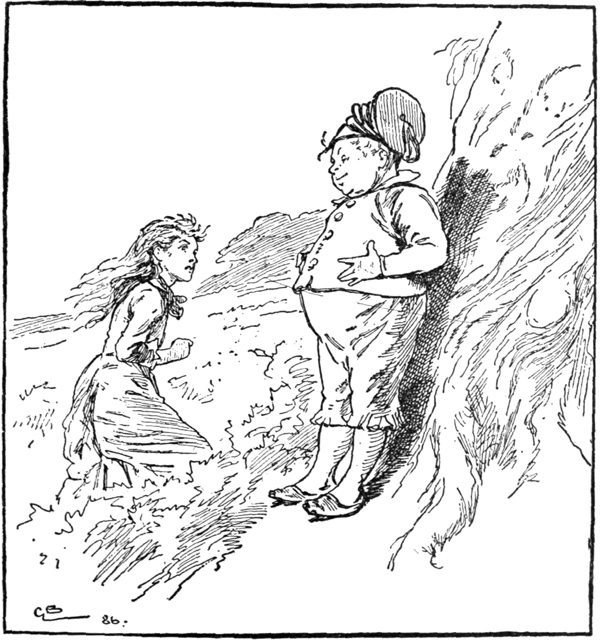
“The big pie!” replied Kitty, surprised and interested. The naughty sprite gave a caper.
208“Do not loiter!” whispered the guardian child.
“The biggest pie that ever was made, and the best. Such a pie!” cried the boy. He gathered his fat finger-tips in a bunch, kissed them and spread them open in the air, as if words failed to describe that pie.
“I am following the star,” Kitty remarked in a depressed but resolute tone.
“Time enough after you have had a slice of pie,” whispered the sprite insinuatingly.
“Look! the star is passing away,” urged the guardian child.
“I’ll think you’re an affected silly,” said the boy.
“I am not an affected silly,” cried Kitty, turning very red.
“Come along, then.”
Kitty felt her palm and fingers rolled up in a soft warm pudding of a hand, and she allowed herself to be dragged along.
What a run that was! The grapes touched her lips as she passed like silken fingers, the bananas gave delicious blows to her cheeks, 209the peaches caressed her with their velvet skins, the cherries pelted her.
She passed by a brown pool of chocolate-cream, in which ladies’ fingers stood up like reeds. She ran across a field where barley-sugar grew, and crystallized wild flowers. She came to a valley strewn with immense lumps like bowlders of almond-rock.
There the great table was set, under a pavilion made of gingerbread. The pie rose in the center. It was an immense pie, as big as a one-story house with its roof on, and it was all angles and bulges. It was white with sugar. All around it was clustered every dainty that could be imagined.
Children smacking their lips were assembled, and the moment the fat boy took his seat at the head of the table, with Kitty at his right hand, they all began to help themselves.
Kitty’s fingers itched to close over the delicious, crisp, sugary morsels spread near her.
“Don’t!” sighed the guardian child each time she stretched out her hand.
The naughty sprite licked its lips and 210smacked its tongue. It was all in a tremble of delight, and repeated the names of all the good things around in a most expressive tone, that seemed to bring their flavor to Kitty’s mouth. More and more she longed for delicious things to eat and drink. Yet every time her hand was stretched out to snatch at something near her—
“Don’t!” murmured the guardian child.
“Eat, drink, and never mind,” urged the sprite in a jovial, don’t-care manner.
Kitty shook her head, as if shaking off the thought of consequences. She would eat. She stretched out her hand; it closed upon a big, crisp sugar-plum. She put it to her mouth.
The naughty sprite crouched like a pouncing pussy.
“Greedy, greedy! No Christmas! No Johnnie! No blessing!” sighed a breath in her ear.
Kitty looked up; her guardian child, pale as a ghost, was vanishing away, but still his eyes were turned toward her. They were Johnnie’s eyes.
211She dropped the sugar-plum. “No, no!” she cried, springing to her feet. “I shall not eat; I shall not drink!”
There was a great scuffle round her; the guests had started to their feet.
Kitty clapped her hands against her ears, not to hear her naughty sprite crying out “Silly, silly!” She was surrounded by the children; they tried to force sweet, cool fruit and sugar-plums between her lips. All the while that craving for good things that was not hunger or thirst fought against her like a wolf; but she went blindly on resisting.
How long the struggle lasted she could not tell, but all at once Kitty knew her enemies had left her.
That faint peal of distant Christmas bells again sounded in her ear, and looking up she found herself on the steep and narrow path, the star shining above her.
“Conquered! conquered! Good old Kitsy! good old Kitsy!” sang her guardian child, in the old familiar comforting words, as he fanned 212her with his rosy wings. He seemed brighter, rosier than ever.
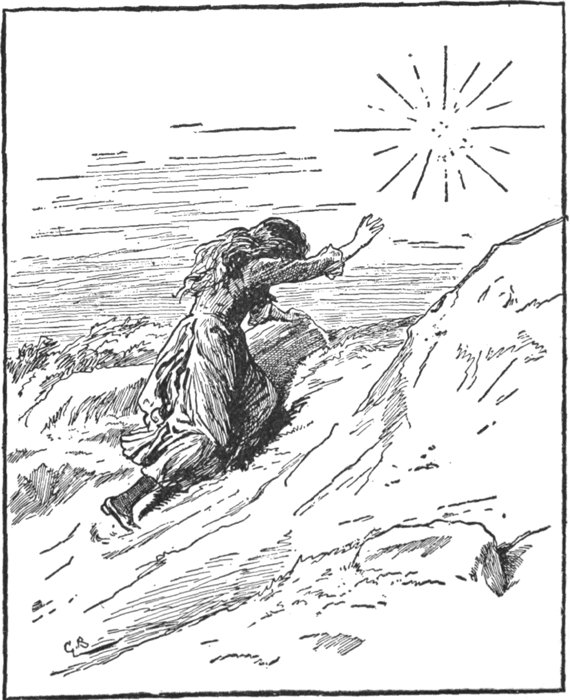
The sprite glared at her with wild eyes, full of disappointment.
213“I shall never reach my journey’s end,” cried Kitty, bursting into tears. “If I could but rest a little while—just a little while—before going on further through that dreadful wood.”
“Look, you may rest; the star has stopped,” said her guardian child, pointing.
It was the prettiest spot in that grim forest; it appeared so peaceful and bright. Blackberry and wild-raspberry bushes, on which the fruit shone glossy and ripe, grew all around; a spring gurgled up from a bed of moss. The grass, patterned over with wild-flowers, was more lovely than any carpet woven by man. Some one had spread upon it a little feast: there was a jug of milk, bread and butter, and honey and cakes.
Kitty wondered who was coming to feast on these simple dainties, for though she peered through the bushes she saw nobody. Yet somebody had found a delightful place for a picnic.
“Eat,” said the guardian child.
215“But why may I eat here, when I could not eat there?” asked Kitty.
“You want food, and the star has stayed to let you rest. You will not be greedy if you eat now. You will be innocent and good; so long as the star watches there is no danger of evil.”
Kitty sat down, and the guardian child came down and became her little host. He offered her fruit and honey; he gathered blackberries for her. Perhaps the naughty sprite was sulking; perhaps it was sleeping; it did not move, but lay curled up in a little ball.
Kitty ate and drank. The birds hopped about her; the squirrels peeped at her from the branches; a field-mouse eyed her with its bright and furtive glance; a crowd of lovely wild things watched her. The shy creatures drew around the guardian child; they seemed to know he was Love’s messenger. He sang, and the birds sang in answer. A little callow, yellow-beaked nestling had fallen out of its nest, and was crying piteously. Had it lost its mother? The guardian child fed it and gently 216put it back into its mossy cradle. It was the friendliest scene. All around the coral-eyed pimpernels were wide open.
“It will be fine weather,” said the guardian child. “They are play-ground’s weather-clock. The sun whispers to them what it means to do during the day. Tick, tick; these are play-ground’s clock,” he went on, pointing to bell-like blossoms, some tight-closed, others half-unclosed, others wide open. “They tell the hour. The wind winds them up. Hush! listen to the tick-tick of the leaves.”
When Kitty had rested awhile, she and her guardian child began to play together. They blew bubbles through long reeds, and rainbow-tinted pictures seemed to form on the bubbles. Kitty looked to see what these pictures were, but they faded away and broke before she was quite sure that she had made them out. They ran races together. Kitty thought she never had so merry and gentle a play-fellow as her guardian child; and as they played together he seemed to grow more and more like Johnnie. The wild woodland animals frisked and gamboled 217about them; butterflies and dragon-flies darted around. Kitty thought it was just like the story of the blue rose come true, and that Play-ground Land was the mysterious garden she had imagined.
When the games seemed merriest the Love spirit suddenly stopped playing, and perched once more upon Kitty’s shoulder.
“Look!” he said, pointing upward. “The star is moving.”
Yes, the fiery heart of the star had begun to beat, and already it was beginning to glide over the tree-tops.
“Oh!” Kitty exclaimed in dismay, “cannot we play a little longer?”
Just at that moment the loveliest butterfly twinkled past. It looked like a flower on wings. Because the dance had not got out of Kitty’s toes she began to dance after it.
A little girl now dashed out of the wood. She had the liveliest face, the whitest teeth, the merriest eyes Kitty had ever seen. Golden bells tinkled on her pointed cap and on her dress. Tinkle, tinkle went those golden bells as she 218ran. She seized Kitty by the hand, and before Kitty could say yes or no, she found herself running with her hand clasped in that of the strange child.
Kitty had never run so fast; the breeze seemed to run with her; the carpet of soft moss seemed to speed them along; the birds seemed to say, “Quick, quick; who’ll go faster, our wings or your feet?”
The sprite sniffed the woodland air with immense satisfaction; it was as wide awake now as it had been fast asleep before.
The guardian child whispered in Kitty’s ear, “Enough, enough; you have played enough.”
The star glided in the sky over the narrow path that stretched away like a straight white ribbon under the forest trees.
At last Kitty stopped, out of breath, at the foot of a branching tree. A little bird caroled above a merry song.
“I wonder if it has a musical box or a whistle in its throat. Would you not like to open it to find out?” said Kitty’s new play-fellow, shaking the golden bells in her cap.
219“Yes—no—I don’t know,” panted Kitty, who was so much out of breath she had not a notion what she was saying, or if she was standing on her head or her heels.
Again the beautiful butterfly she had seen twinkled past on its wings like flowers.
“Catch it!” cried the little girl, seizing Kitty’s hand once more, and, willy-nilly, away she was speeding again. Run—run—through the alleys and glades of the deep forest; run—run—across a park-like clearance, and still the butterfly fluttered before. Like a will-o’-the-wisp it went, up and down, now here, now there, always before them. Settling down a moment—then off again just as they neared it. To the right—to the left—Kitty was beginning to feel angry at the dance that butterfly was leading them. The oftener it escaped the more determined she grew to catch it. She was so eager that she did not hear the warning sigh of her guardian child, “It is so happy; it is so happy. Don’t hurt it!” She heard only the shrill cry of the naughty sprite standing on her left shoulder and shrieking, “At it now! Up 220with it! Now’s your time! Now you’ve got it! Tally ho! tally ho!”
“Tinkle, tinkle,” went her playmate’s golden bells, quicker, quicker rushed these four racing little feet. At last the naughty sprite whispered, “Hush! Down upon it?”
They stopped running; they drew in their breath; they crept on tiptoe, softly—softly. Yes, there on a gray stone stretched the butterfly—a lovely flamy thing; all blue and pink and delicate golden markings. Softly it balanced itself, backward and forward, giving an occasional shake and quiver to its wings.
Kitty’s spirit was roused; she was in a manner angry with that winged creature that had escaped her so long. Now, with one blow of her little hand the swift tiny thing might lie there still forever.
The naughty sprite whispered, “Down upon it!”
Up flashed Kitty’s hand.
“I was so merry, merry,” whispered a voice in her ear.
“It is only a butterfly,” urged the sprite.
221Kitty looked up. Her guardian child was pale as a dying child, he who had been so rosy such a little while ago; and in that upward glance Kitty perceived that all around, the woodland creatures were gazing at her. The birds, the field-mice, the rabbits with flapping ears, the hares had stopped running to look, the squirrels chatting and cracking their nuts, the dragon-flies hung suspended about like animated jewels, green frogs, and toads with wonderful eyes, all were looking at her, but not as they had looked in Play-ground Land. In all their eyes, that had been so friendly and trustful, there was now a fear and a reproach.
“Are you the same Kitty whom we trusted?” they seemed to be saying. “Will you take one of our innocent, joyous lives, just for play?”
“No, I will not,” cried Kitty; and she let a tear drop upon the butterfly. And a low cry of joy burst from God’s lovely, helpless, wild creatures, and the forest trees stirred as if drawing a sigh of relief.
“Silly!” hissed the naughty sprite; and away 222scampered the strange little girl in a pout, and tinkling her golden bells.
But the guardian child, all rosy with gladness, laughed, and its laugh had the velvety note of the blackbird’s whistle; and again there sounded on Kitty’s ear that airy peal of Christmas bells.
But Kitty’s little heart was still sore with the reproach of the wild animals’ questioning eyes.
“They trusted me!” she sobbed, “and I would have killed one of them for play.”
“Who was that little girl who ran so fast?” she asked her guardian child when she once more found herself standing upon the narrow path following the star.
“Thoughtlessness,” he replied; “and I can answer for it, nothing runs so fast as that empty-headed creature can race along.”
Kitty stopped and looked around, for she heard a muttering as of two people talking confidentially together.
Yes, there were two figures in front of her, standing with their arms round each other’s necks. They were so like that Kitty felt sure they were twins. They had satisfied round eyes and big faces and double chins, and wore steeple-crowned hats, tilted on one side, which gave them a jaunty look.
All at once Kitty started back, for she perceived that one of the figures was solid and the other quite transparent; through it she could see the tree against which it leaned.
“Why—who—who—what is that?” she gasped nervously.
“That is Myself,” said the opaque one, rolling 224his eyes with an affectionate grin in the direction of his comrade, who rolled his pale round eyes and grinned a ghostly grin in answer.
“Then who are you?” asked Kitty timidly.
“I—why, I am I,” he answered rather sullenly.
“That’s what we are—Myself and I,” said a voice hard and thin like a spectral rattle, which Kitty perceived emanated from the vapory figure.
“I never knew there was a difference between Myself and I,” murmured Kitty, who felt compelled to gaze at that transparent form, although she would much rather not have looked. It was so very uncomfortable to see that tree through it.
“I made him; is he not a beauty?” said I, proudly pointing with his thumb, and a grin to his companion.
Myself acknowledged the compliment by bowing his misty head, and grinning likewise.
“How did you make him?” asked Kitty with a little shiver.
225“I made him,” said I, “with my thoughts. I thought of myself night and day, talking, eating, walking, sleeping, I thought of myself, and one day there was Myself before me—the dear—he never quits me—never—we gaze at each other—we love each other.”
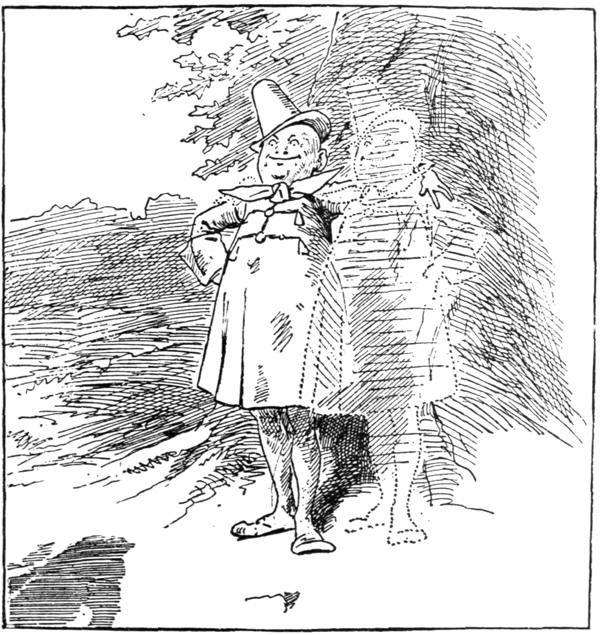
“And we love nobody else—nobody—nobody—nobody 226else,” joined in the thin rattle of a voice.
“Are you never tired of each other?—I—mean—of—of—well, I don’t know how to put it—quite—for you are not each other,” said Kitty.
“Tired!” shrieked the two voices together; and then the two beings fell into each other’s arms.
“If you please,” said Kitty, after having watched this scene of affection, and feeling rather neglected, “will you tell me if it is a long way out of this wood?”
“A very long way,” said I, cheerily looking up.
“We don’t care a dump how long it is, provided we have not to walk it,” chimed Myself, airily wagging its head.
“I am very tired,” said Kitty despondently, and tears rushed into her eyes.
“I suppose you are,” remarked I indifferently.
“That is no matter to us,” said Myself, grinning his ghostly smile.
227“I cannot offer you this seat,” said I, “for Myself must sit there. I am afraid of tiring Myself. It is a duty I owe to Myself, never to tire Myself—precious one—never to let Myself be hungry or thirsty—dearest creature—or any harm come to Myself—excellent fellow.” Saying this I and Myself sat down side by side on the mossy roots of a tree, and looked up at Kitty with a grin that made the spectral face of Myself more than ever like that of I.
“Selfish thing!” muttered Kitty indignantly. “It must be Goblin Selfishness.”
“Yes, Goblin Selfishness,” whispered the guardian child, and his voice was anxious. “Take care!”
“Oh!” said Kitty, once more setting off at a run, “there’s no danger for me. It will be enough to think of that creepy, misty, ugly Myself, never to think of myself again, lest—”
But she stopped.
“Well, here is some one coming who is not running,” cried Kitty, laughing.
228“The walking picture of Cleverness,” the naughty sprite chuckled.
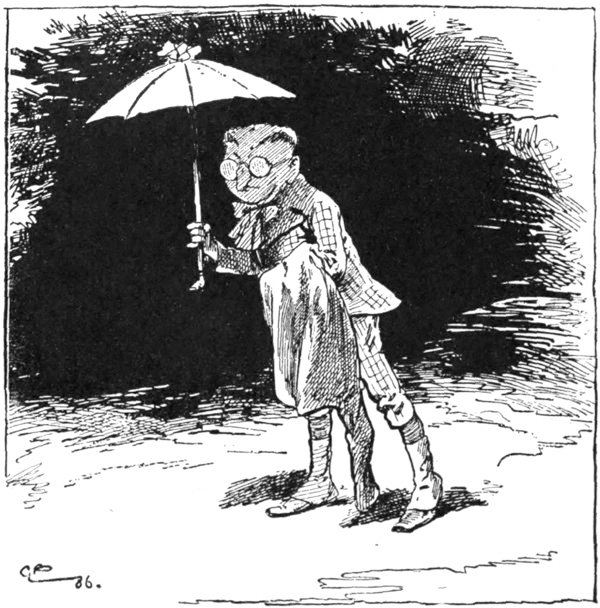
If it was a little old man or a very old-looking boy who now approached Kitty could not determine. He wore a pair of blue spectacles astride upon his hooked nose, which jutted out over very thin lips, and was rather blue and frost-bitten. Altogether he was uncommonly 229like an owl, Kitty thought. Whoever he was, this personage walked slowly, holding a sun-shade open in one hand, and a warm overcoat slung over his other arm. He was apparently prepared to meet every sort of weather. Kitty noticed also that his ears were stuffed with cotton-wool.
“Well,” she said aloud, addressing nobody in particular, and with a broad smile, “this must be Mr. Take-care-of-himself.”
“An excellent name,” answered the little old man, or the very old-looking boy. The cotton-wool in his ears did not seem to deafen sound. “And I would advise you to deserve such a name.”
“Not if I must wear those big spectacles to deserve it,” laughed Kitty.
“Don’t say a word against my spectacles till you have looked through them,” answered her new acquaintance.
He had a cold, crisp voice, and he seemed to peck his words as a fowl pecks grain. From his pocket he pulled out another pair of blue glasses. “Just try this pair and tell me what you see.”
230“Don’t!” whispered the guardian child.
“Do, just for the fun of it,” urged the naughty sprite in a coaxing tone.
“I shall wait till I want spectacles to make a fright of myself,” said Kitty, and she would have walked on.
“What do you see?” asked the blue-spectacled personage, rubbing the glasses he had taken out of his breast-pocket.
“I see,” said Kitty, “the wood. A little way off I see a delicious swing-swong seat made of moss, hanging between two trees. Yes, I see a little pale child, all in rags, a cripple, leaning on his crutch. He wants to get on the swing-swong. Oh, I shall run and help him!”
“Just take a peep at the same scene through these spectacles,” said the odd-looking being.
“Don’t!” whispered the guardian child.
“Just a peep to please him,” urged the sprite good-naturedly.
“Well, only a peep,” said Kitty, and she set the blue spectacles on her nose.
At first she saw nothing at all. Everything was dancing, whirling about her. The earth 231seemed to rush up into the sky, the sky seemed to swoop down upon the earth.
Then the scene began to clear. She saw the same tree, but it looked more shady and delightful; the same mossy seat, but now it appeared more inviting. The sunshine seemed brighter in that spot, the shade cooler; it appeared the loveliest nook she had ever set eyes upon. The child struck her as a white, dwarfish, ugly little intruder—a sort of small monster. What right had it to be there? He spoiled the place.
“We’ll drive him off,” said the owl-faced being.
“But he’ll cry,” said Kitty uncomfortably.
“Just put a small piece of this cotton-wool into your ear,” suggested her new acquaintance, offering her some that he drew out of his breast-pocket.
Kitty took a morsel hesitatingly and put it into her right ear; the naughty sprite extended its paw, took a larger bit, and clapped it into her left ear.
At first Kitty thought she had grown quite 232deaf—a great silence seemed to close around her, yet she heard the swish of the trees and the song of the birds; but some sound was missing, some sound that she was accustomed to hear. Then she knew that there had been ever present a murmur in her ear, as that of other children weeping, other children laughing.
It was this little throbbing music, sad and gay, that she no longer heard. Through the silence the naughty sprite in her own voice cried: “I want to swing in this mossy seat, in the place of that ugly, sick-looking child.”
So lovely appeared that sheltered nook, so aggravatingly comfortable the pale child, that Kitty set off at a run. As she ran she shivered; as if winter had suddenly overtaken her on that sunshiny day.
What was it? Colder and colder, like a chain of ice round her throat. Kitty put up her hands to feel what was there. The naughty sprite was hugging her close.
She stopped running. Where was the guardian child? She could see it nowhere. Could 233the spectacles be blinding her to the sight of its sweet face? She tried to take them off; but they seemed to have become part of her nose.
Pull, pull went Kitty. At last, with a wrench that seemed to root up her nose, she detached them and threw them a long way off.
Yes, high above her, restlessly hovering, wringing its hands, she now could just see her guardian child, white as the winter moon when the sun is still shining. Its lips moved, but she could not hear what it said. The wool in her ears made her deaf to the sound of its voice.
With a tug Kitty pulled out the horrid, clinging cotton-wool; then she heard the voice of her guardian child, crying, “Don’t turn away the cripple!” and with that voice back came the old sound, like a familiar song, sad and gay, crooning in her ear, and the clamp of a little crutch, telling a pitiful story of tiny feet that would never run or dance.
The cripple grasped his crutch and was hurrying away, when Kitty ran to him, took his thin hand, and led him back to the mossy seat. 234She kissed the pale, thin face, and her tears dropped upon it, and down came the guardian child on her shoulder, more beautiful than ever, its wings like pink flowers, its hair like a crown of light. In another moment the naughty sprite had dropped its arms from Kitty’s neck, and out pealed the distant Christmas bells.
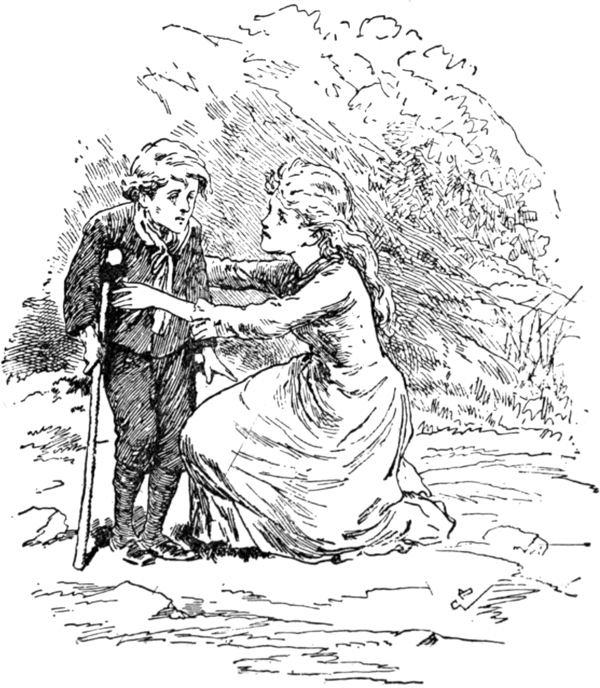
“Oh, I never thought I should have been so 235selfish!” sobbed Kitty; “and the child was a cripple like Johnnie.”
The hot tears blinded her, but the guardian child dried them as they fell with his bright wings. Never had he looked so sweet, so good, so bright, so like a tiny angel Johnnie. Kitty stretched out her hands; she would have liked to press him to her heart, but the guardian child shook his head. “Wait, wait! The journey is not over yet,” he murmured.
“It is so long, so difficult!” cried Kitty as once more she stood upon the narrow path, and the star moved above it, seeming more than ever like a bird of fire winging its fearless way. “I shall not fall into another temptation. I shall not listen to what any one says whom I may meet. I shall do just what you tell me, you darling, pretty Johnnie spirit.”
The way lay now through a lovely bit of country; the honeysuckle twined above, the soft grass was thick with flowers. A little breeze carried the sweetest, quaintest perfumes; it was as if everything was rejoicing and in amity with her. The path seemed to be growing 236less difficult; it ascended with a pleasant easy swell. Kitty now went merrily along; the hard journey must be near its close. The guardian child fluttered hither and thither, sometimes hiding among the flowers and laughing at her through the petals. The sprite remained silent and quiet.
All at once the guardian child flew back to its post on Kitty’s shoulder; the self-sprite picked up its pointed ears.
“Something is going to happen,” thought Kitty; “but I shall be wise, I shall not talk to any one, however beautiful or comical.”
She looked ahead, but no one was advancing. The road went in and out through the pleasant trees, the star glided above them.
How strange it seemed! Something was going to happen, yet all was so still, and there was nothing to disturb the scene.
Suddenly a bluebird flew across. It settled on a bush starry with wild white roses. It put its head on one side and looked at Kitty with the brightest, friendliest eyes. It was quite blue, except for a tuft of golden feathers on its head, and a line of golden feathers round its neck like a fairy necklace. Kitty had never seen anything so wonderful as this bluebird. She stopped to look at it, and the bird looked back at her with its winning eyes. Kitty advanced on tiptoe, and it fluttered a little further into the wood. As it flew off it uttered a note.
“Listen!” said the naughty sprite, lifting its paw and giving Kitty a pat.
238What a note that was! “Glug! glug! glug!” deep as the whistle of a bullfinch, then “Tri—ll—ill—ill!” it went like a lark caroling up in the sky; then suddenly the song changed, and now it was like a nightingale singing in the moonlight. Kitty’s heart swelled as she listened to the song of the beautiful creature, and as it sang it skimmed through the wood, now floating like a sea-gull on blue wings, now balancing itself on the branch of one of the forest trees.
“Come on! Do not put off any longer. It sings to keep you from following the star,” whispered the guardian child.
“Ah! let me listen a moment!” pleaded Kitty.
“Listen! listen!” said the naughty sprite, and down it gamboled from Kitty’s shoulder, seeming to call and to entice the bird, which flew out of the wood and perched on a bough singing; the tuft of golden feathers on its head stood up like a crown, its golden necklace rose like a ruff round its throat.
The sprite laughed, tossed back its head, 239frisked about, keeping time to the bluebird’s song. Kitty thought it was the prettiest sight.
“Watch the star! The bird is a temptation—it is idle pleasure. See, it plays with your naughty sprite. It sings to lead you astray,” whispered the guardian child, and its pink wings fluttered in a tremor of anxiety.
Still Kitty lingered.
“Come on, for Johnnie’s sake—to win a Christmas blessing for Johnnie!” urged the guardian child.
Kitty turned quickly in the direction to which the guardian child pointed. The star was gliding no longer over the pleasant wood; its course lay over a path that was very steep, bordered by no flowers, shaded by no overhanging trees. She ran some steps, and her guardian child pressed its rosy wings against her ears to muffle the song of the bird.
But louder and louder it sang, and that piercing melody seemed to coil itself like a string round Kitty’s heart, pulling her back. She stopped running. The bird seemed to 240sing of frolics, and Kitty felt as if games of four-corners, blind-man’s-buff, hide-and-go-seek were all hustling and bustling about in her head, and tingling in her feet. She turned to look.
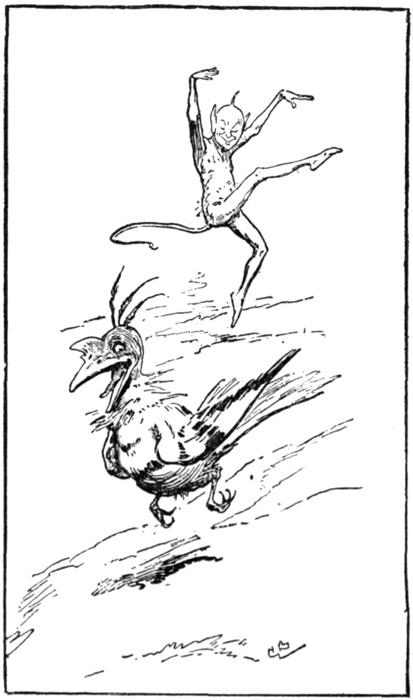
“Don’t!” murmured her guardian child.
But Kitty looked. The naughty sprite and the bluebird were having a merry game. The bird flew as it sang and the sprite gamboled after it; it hid in the bushes and the sprite went frisking and seeking for it; then up the bluebird would fly and wheel round and round, 241singing as if a thousand musical glasses were tinkling in its throat. The sprite had the drollest air; jerking his head on one side and beckoning to Kitty.
“Oh! let me join in the game!” cried Kitty, and back she ran toward the bird and the sprite.
The guardian child flew around her, crying, “Do not play with your naughty sprite!”
As he spoke he spread his wings before Kitty’s eyes. But the music was in Kitty’s heart, in her ears, it seemed to be in her hair, in her feet—it was everywhere.
“I shall play!” she cried impatiently, and she pushed away her guardian child.
She did not hear his sob, she did not notice that she had struck his wing and that some rosy feathers lay strewn on the ground. One little rosy feather had dropped on the bosom of her dress, and was caught there by the folds.
She did look round to see her guardian child, with drooping wing, growing paler and paler—vanishing away.
242Deeper and deeper flew the bird into the wood, and sweeter grew its song. The naughty sprite gamboled after it, Kitty gamboled after the sprite. A star rose in the wood; it was like a blue diamond; it did not glide above the tree-tops, it danced about the ground, as if it were dancing to the song of the bluebird. The naughty sprite scampered up the tree and pelted Kitty with acorns; it now peeped at her from behind the trunks, now swung itself down and jumped into her arms all in a pant and tremble of play. And the bluebird wheeled and circled above Kitty’s head, and still it sang.
Skipping out of the wood came a hundred little creatures. They all had pointed ears, curly tails, and sparkling black eyes. They carried tiny lanterns that were blue and dazzling as the star. They were the merriest, most frolicsome of elves, but the friskiest and most fascinating of all was Kitty’s naughty self-sprite.
Louder sang the bird and louder; its song was now a dancing measure; it echoed through 243the forest as if gayety were the single spirit of the place. The blue star bounded and danced about the ground, here, there, everywhere, as if it had gone crazy with delight. The playful creatures danced and waved their lanterns, zigzag, up and down, crossing, circling in a merry maze. Kitty seized the fore paws of her naughty sprite, and dance, dance, dance they danced together. Livelier and livelier grew the bluebird’s song, and madder and madder grew the dance.
All at once—wh-ir-r—the bird’s melody had changed to something between a screech and a rattle. Kitty looked up. Twinkle, twinkle, round and round, like a flaming Catherine wheel, the bluebird’s wings quivered and shook; its tuft of golden feathers disappeared from its head; the gold collar faded from its neck; the light that shone in its blue wings was extinguished, and instead of the bird there hung on the branch where it had perched a big black slug.
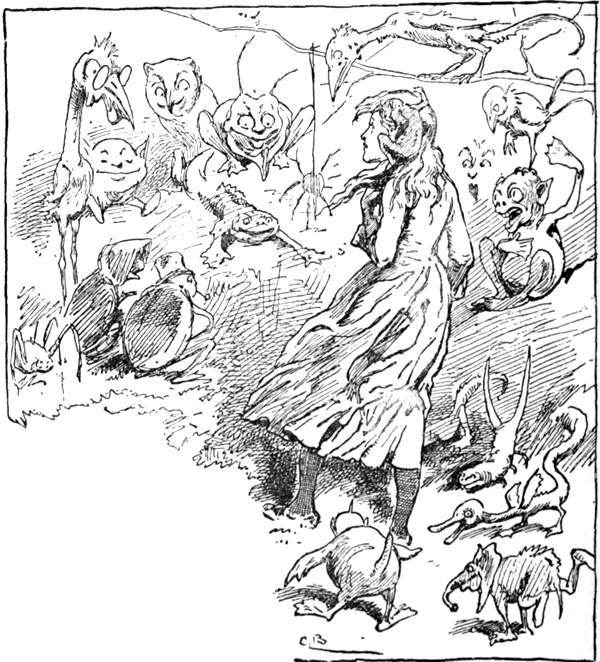
Kitty started. What a transformation scene! All around her moved a thousand foul and ugly 244shapes. The pretty frisking creatures had turned to scaly black beetles as big as rats: some wriggled like adders; others looked like monster earwigs, with tails like pinchers; others were little men with heads of frogs; and the ugliest of all was her naughty sprite. It had cruel eyes, and its fur was black and coarse like bristles. Once more it sprang 245upon her shoulder, and laughed and muttered, “No Christmas! No blessing! No Johnnie!”
Kitty felt quite cold. She looked round to her right shoulder. No guardian child perched there. She looked up to the sky for her guiding star, but it was gone. She was alone in the pathless woods with her naughty sprite grinning and muttering. It seemed to her also that a mist was closing around her. Then Kitty gave a great cry. “My guardian child! my guardian child!” she called.
Her cry was repeated by a thousand shrill, mocking voices.
“No Christmas! No blessing! No Johnnie!”
“Look!” muttered the sprite, pointing.
Kitty perceived something lying white on the ground. At first she thought it was a lily, then she saw it was a pale white face, lying very still, with closed eyes and a rim of golden hair around its forehead. Was it Johnnie’s face?
As she peered fearfully to see, the mist gathered and hid it. Then she found that a 246dreadful thing was happening; the bushes were closing round her. She set off at a run to find an opening, but there was none—round and round—closer and closer the bushes gathered.
“Punishment Land!” muttered the sprite.
“Punishment Land!” echoed the mocking voices.
Faintly Kitty heard a sound of tramping. Little feet were running round and round, backward and forward, zigzag; rebellious, weary, foolish, perplexed little feet.
Then she knew that she had fallen back, that she was in Disobedience Maze. It was the fog of Punishment Land that was rising about her, blotting out the sight of everything but of one little pink feather that lay, a rosy streak, close to her heart.
“My guardian child! my guardian child!” she cried with all her might.
“You wounded it; you drove it away,” chuckled the evil sprite.
Kitty put her hands up to her ears to shut out that jeering voice. She cried the louder.
247“My guardian child! Forgive me! forgive me! Come back to me!”
There came a flutter of wings, something bright was flying toward her, piercing its way through the fog; yes, it was her guardian child dragging one wing, but bravely beating the air with the other, fluttering toward her, pale, its rainbow dress faintly shining, its eyes bright with tears.
“Because you trusted me Love sent me back to you,” it murmured as it nestled in Kitty’s outstretched arms. She burst into a great fit of grateful tears, while the sprite cowered and trembled.
“Hurry!” whispered the guardian child. “The star is gone. It will be difficult to find the path, but you must follow where I lead.”
A cry rose in Kitty’s heart: “I shall follow wherever you lead;” but she remembered how she had most disobeyed after she had most protested, so she sobbed and was silent.
Through the mist shone the rainbow-clothed form of the guardian child, and Kitty followed. Wherever her guide told her to plant her foot 248she placed it; through marshy ground that quivered and shook under her, where crawling things like living roots wound themselves about her feet, as if to drag her down, through narrow places where creatures that seemed all arms sought to clasp her and hold her back, over thorns that bruised and scratched her as she walked. Kitty followed her guardian child without a murmur. Tormenting apparitions waved their tiny lanterns and showed her an easier path, but Kitty did not glance aside. She kept her eyes steadfastly fixed upon the rosy-winged figure that went before her. One question only lay heavy at her heart. That lily-white face she had seen through the mist, was it Johnnie’s dead face? Ah! had she lost the Christmas blessing?
All at once, when the way seemed most perplexing, the guardian child gave a cry and pointed upward. A light was breaking over the tree-tops. It was the star!
Out of the mist stepped Kitty and her guide, upon the pathway, and there pealed a chime of Christmas bells. Not distant bells, but clear 249and joyous, filling the air. The sky was yellow as with the dawn; the summer had passed; the snow lay white on the ground.
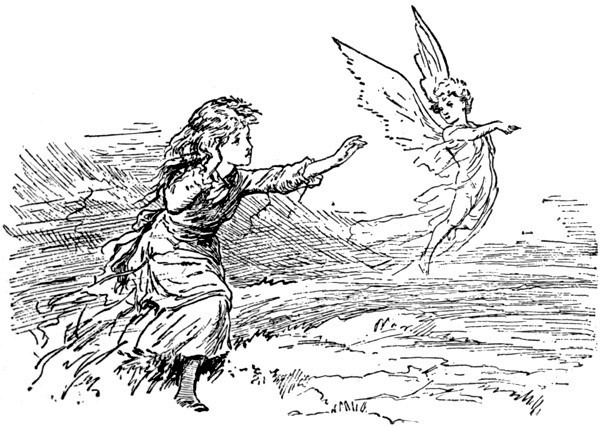
Kitty rubbed her eyes.
Where was she?
She was just at home. She was in the old familiar wood, the entrance into which she could see from Johnnie’s window. No, there could be no mistake; there was the pool, its silky mantle of duckweed now glistening with ice. There, yes, there was the gate shaded by the gnarled elm, its branches like a candelabrum of snow.
It is the gate of the wood. Kitty flies along the path till she has reached it. She stands and looks. The dear old home picture is there before her. She sees the old village street, the sweet-stuff shop is just round the corner. There is the square tower of the church, covered with ivy, and there is her home. Over its red-gabled 251roof the star is shining in a sky, yellow as a bed of cowslips. There is Johnnie’s window; the blue curtains are drawn across it. No one is stirring. There is no one in the garden; the house door is closed; the blinds are all down. Kitty looks fondly at the dear tranquil scene. It is like the loveliest dream. She feasts her eyes a moment upon it, then comes in her heart the question: “Am I in time? What secret does that blue-curtained window hide? Is Johnnie better or is he—”
Kitty tries to push open the gate. It is locked. She pulls at the latch: she cannot lift it. She tries to climb over the gate: it seems to grow higher and higher. She cannot reach the top. Then she hammers with her little closed fists at the lock, pushing against it with all the strength of her body.
“Open, open!” she cries.
Will not some one come to open to her?
“Mother, mother!” again cries Kitty with all her might. Will no one open?
Yes, some one is coming. Is it her mother 252coming toward her across the meadow? It is a pale lady robed in white; and as her long fair mantle trails on the ground a flash of rainbow light glows a moment and then fades from the snow.
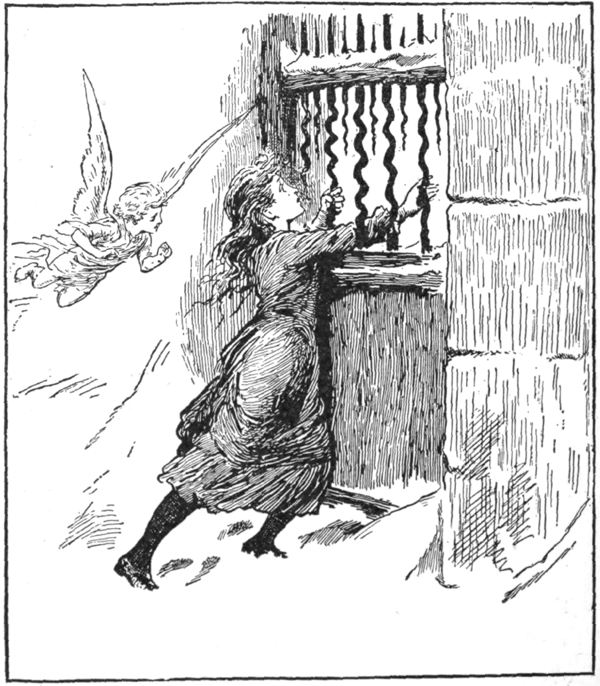
It is Love. Her face is bright and tender. 253Her gentle fingers are on the latch. The Christmas bells are ringing louder and louder.
A great joy seizes Kitty. She is in time! She is in time!
“Have you resisted all the temptations?” asks Love in her gentle searching voice. “Did you never once lose sight of the star? Did you never hurt your guardian child, or play with your naughty sprite?”
“If you say that you did everything that you should not have done, you will not see Johnnie, or hear anything about him. You will have to go back to Punishment Land,” mutters the sprite.
A cold fear seizes Kitty.
“Tell the truth!” whispers her guardian child.
“I must see Johnnie! Oh! I must see Johnnie! Open the gate!” cries Kitty.
“Did you resist the temptations?” asks Love again, her fingers remaining motionless on the latch.
“Do not answer—smile! That will seem good,” whispers the sprite.
254The idea strikes Kitty as a happy one. A smile is not telling a falsehood. She makes an effort as she broadens her lips into what looks like a grin; she thinks Love’s fingers are beginning to press the latch.
“The smile means a falsehood. Tell the truth!” whispers the guardian child.
“You have not answered!” again says Love’s voice.
“Open the gate,” entreats Kitty in anguish. “Why are you called Love when you can stand there and not open the gate for me? I want to see Johnnie. I want to know if he is alive. Oh! it is Christmas morning. Open the gate, open the gate!”
Kitty has pushed her hands through the bars as she implores. She has caught hold of Love’s fingers, and is trying to force her to push up the latch. But still the strong hands remain motionless.
“Answer!” repeats the gentle, relentless voice.
“Say, how could I have come so far to the end of the journey you set me if I had not obeyed?” muttered the sprite.
255Kitty draws a long breath. That seems a right thing to say. It is not false, for she is here at the journey’s end.
She begins, “How could I ha—” when she hears the guardian angel’s whisper:
“Evasion is falsehood. Tell the truth.” Then Kitty falls on her knees.
“Oh, why are you called Love,” she repeats, “when you are so severe? Why will you keep pressing me with questions? It is Christmas morning! Let me see Johnnie! Let me see Johnnie!”
But Love answers only: “The day is dawning. You must answer.”
“Answer truly!” whispers the guardian child. “Never mind what happens. Answer truly.”
Kitty puts her hands over her eyes, not to see that dear home-picture fade away, that curtained window vanish from her sight without knowing the secret that it hides concerning Johnnie.
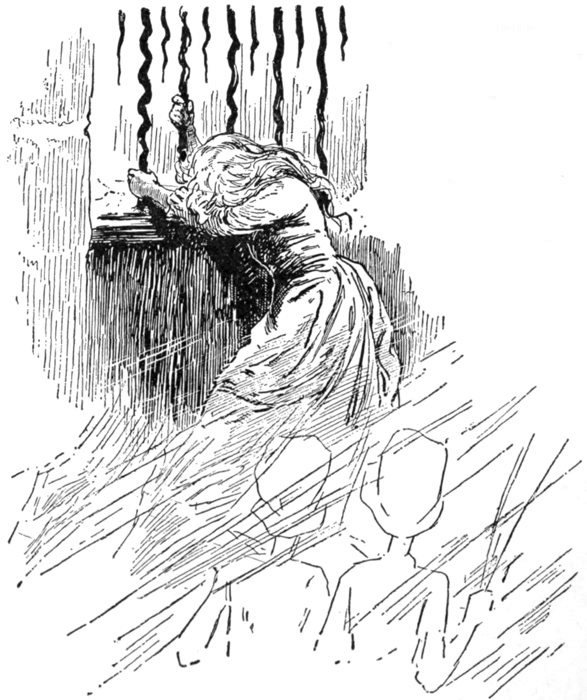
“I loitered with every temptation,” she says very low but very clearly; “but my guardian 256child helped me to escape, till at last I struck it and drove it away. Then I lost sight of the star, and I played with my naughty sprite.” Kitty’s voice fails here, and with a sob she stretches herself down on the snow.
She hides her face. She will not see the mist of Punishment Land rise, and blot out that loved familiar scene. She closes her ears, not to hear the tramp of 257the restless feet, the sobbings and cries of the children there.
What sound pierces through the silence and reaches muffled through the hands pressed tightly against her ears? She removes them and listens. It is the sound of bells, Christmas bells. Louder and louder, clearer and clearer they ring. The happy chimes fill all the air. Somebody strokes her hair with a caressing touch, a voice whispers, “Good old Kitsy; good old Kitsy!”
Kitty looks up. It is her guardian child who is bending over her; with Johnnie’s eyes he looks at her; he is smiling; his wings sparkle; his rainbow dress is like woven fire; his hair shines like a tiny sun about his head.
“You have been out on Christmas Eve,” he whispers; “the night when all the goblins are abroad, when the good and evil spirits walk the earth. But it is the night when love is strongest, and keeps those safe who are true. Look! look! the night has passed; the holy morning has dawned, and you are home.”
“Home!” cries Kitty, starting to her feet.
258Yes, the familiar scene is still there—the old street, the dear red-roofed home, the window with the curtains drawn across it. The fog dims the scene no longer. Love is unseen; but the gate is standing open, wide open, and a great web of hoar-frost hangs on the latch. For a moment Kitty remains stupidly gazing. She cannot believe it. Then she runs past the gate out into the road uttering a loud cry, “Johnnie! Johnnie!”
Then again another cry, “Johnnie!”
It seems to her that a weak voice answers, “Kitty! Kitty!”
Does that faint voice come out of the star? Does it speak out of the sky to her?
Kitty looks up: her foot trips; she falls—not to the ground, but down, down, down, and still that voice tinkles in her ear, “Kitty! Kitty!” Then
“Kitty! Kitty! Merry Christmas, Kitty!” It was Johnnie’s voice.
A tiny face peeped down at her from white 259wrappings and shawls, laughing at her as from a hood of snow.
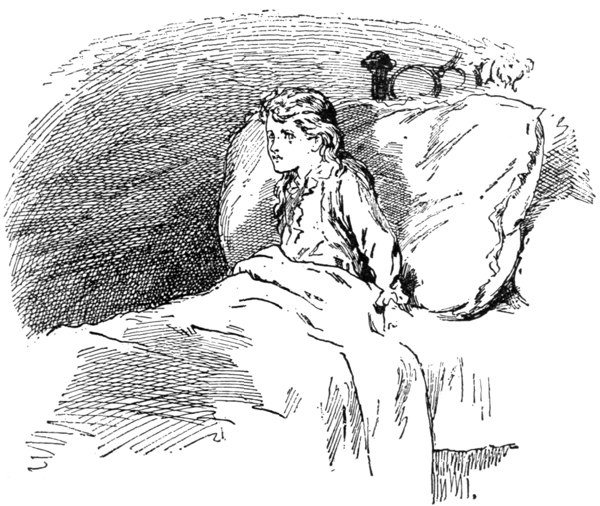
Yes, it was Johnnie—Johnnie wrapped up like an Esquimaux; wrapped out of all shape; a bundle of white wool in their mother’s arms.
She, too, was smiling down upon her little girl.
Kitty had fallen down, down, and while falling had lost all sense of everything except that 260voice, and now here she was back again in her own bed as if nothing had happened. Oh! what cannot Love do?
Kitty started up, and before she could say a word Johnnie was put into her arms, tucked up into the bed beside her, and their mother told her that Johnnie had slept through the night, and that he had turned the bad corner of his illness. “He begged so hard to be allowed to wake you up by calling out ‘Merry Christmas,’ I could not refuse him,” continued the mother, shedding tears of gladness. “Christmas Day has brought a blessing.”
“Happy Christmas to everybody!” said their father, now putting his head into the room. He looked as if he would like to say something that would make everybody laugh. But instead of that he paused and said instead, in a very husky voice, “God bless little Johnnie!”
“That’s what I say,” cried nurse, whisking a tear away with the corner of her apron. “I thought it was going to be the most miserable Christmas Day that ever was, but Johnnie getting 261better makes it as different—as different—as if this was a Christmas-box come down to this house from heaven.”
Just then who should begin to whistle but the bullfinch? His cage was in a dark corner, and at the sound of that unexpected note Johnnie clapped his tiny hands and crowed with delight. Kitty laughed and cried together. And if the bullfinch did not mean, by bursting into song at that moment, to say, “Happy Christmas to all the world, and God bless little Johnnie, and all the children in it!” I don’t know what it meant, and I give up guessing.
“Oh, Johnnie!” said Kitty in a whisper, when she was left alone with her little brother, “something wonderful happened last night. It is like a story.”
“Is it as wonderful as the story of the blue rose?” asked Johnnie in another whisper.
“E-ver, e-ver so much more wonderful! And it is true,” answered Kitty very low and with a nod that conveyed a great deal more than her words. “It was Christmas Eve. I went out, 262and all the goblins and the elves were out. I saw them and talked to them, but there was Love also taking care of everybody who tried to be good. It is the night when Love has most power, and I saw my guardian child, and my naughty self in the shape of a sprite, and—But hush! some one is coming, and it is a secret.”
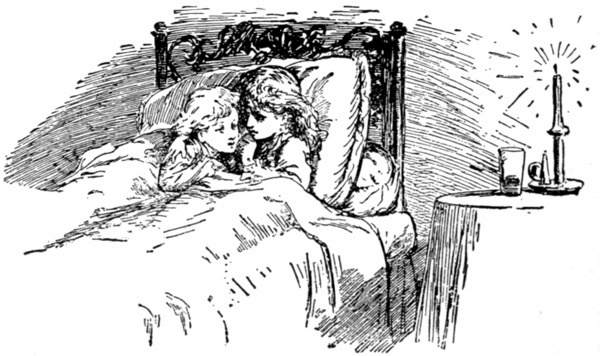
End of the Project Gutenberg EBook of Down the Snow Stairs, by Alice Corkran
*** END OF THIS PROJECT GUTENBERG EBOOK DOWN THE SNOW STAIRS ***
***** This file should be named 57413-h.htm or 57413-h.zip *****
This and all associated files of various formats will be found in:
http://www.gutenberg.org/5/7/4/1/57413/
Produced by Melissa McDaniel, Barry Abrahamsen, and the
Online Distributed Proofreading Team at http://www.pgdp.net
(This file was produced from images generously made
available by The Internet Archive)
Updated editions will replace the previous one--the old editions will
be renamed.
Creating the works from print editions not protected by U.S. copyright
law means that no one owns a United States copyright in these works,
so the Foundation (and you!) can copy and distribute it in the United
States without permission and without paying copyright
royalties. Special rules, set forth in the General Terms of Use part
of this license, apply to copying and distributing Project
Gutenberg-tm electronic works to protect the PROJECT GUTENBERG-tm
concept and trademark. Project Gutenberg is a registered trademark,
and may not be used if you charge for the eBooks, unless you receive
specific permission. If you do not charge anything for copies of this
eBook, complying with the rules is very easy. You may use this eBook
for nearly any purpose such as creation of derivative works, reports,
performances and research. They may be modified and printed and given
away--you may do practically ANYTHING in the United States with eBooks
not protected by U.S. copyright law. Redistribution is subject to the
trademark license, especially commercial redistribution.
START: FULL LICENSE
THE FULL PROJECT GUTENBERG LICENSE
PLEASE READ THIS BEFORE YOU DISTRIBUTE OR USE THIS WORK
To protect the Project Gutenberg-tm mission of promoting the free
distribution of electronic works, by using or distributing this work
(or any other work associated in any way with the phrase "Project
Gutenberg"), you agree to comply with all the terms of the Full
Project Gutenberg-tm License available with this file or online at
www.gutenberg.org/license.
Section 1. General Terms of Use and Redistributing Project
Gutenberg-tm electronic works
1.A. By reading or using any part of this Project Gutenberg-tm
electronic work, you indicate that you have read, understand, agree to
and accept all the terms of this license and intellectual property
(trademark/copyright) agreement. If you do not agree to abide by all
the terms of this agreement, you must cease using and return or
destroy all copies of Project Gutenberg-tm electronic works in your
possession. If you paid a fee for obtaining a copy of or access to a
Project Gutenberg-tm electronic work and you do not agree to be bound
by the terms of this agreement, you may obtain a refund from the
person or entity to whom you paid the fee as set forth in paragraph
1.E.8.
1.B. "Project Gutenberg" is a registered trademark. It may only be
used on or associated in any way with an electronic work by people who
agree to be bound by the terms of this agreement. There are a few
things that you can do with most Project Gutenberg-tm electronic works
even without complying with the full terms of this agreement. See
paragraph 1.C below. There are a lot of things you can do with Project
Gutenberg-tm electronic works if you follow the terms of this
agreement and help preserve free future access to Project Gutenberg-tm
electronic works. See paragraph 1.E below.
1.C. The Project Gutenberg Literary Archive Foundation ("the
Foundation" or PGLAF), owns a compilation copyright in the collection
of Project Gutenberg-tm electronic works. Nearly all the individual
works in the collection are in the public domain in the United
States. If an individual work is unprotected by copyright law in the
United States and you are located in the United States, we do not
claim a right to prevent you from copying, distributing, performing,
displaying or creating derivative works based on the work as long as
all references to Project Gutenberg are removed. Of course, we hope
that you will support the Project Gutenberg-tm mission of promoting
free access to electronic works by freely sharing Project Gutenberg-tm
works in compliance with the terms of this agreement for keeping the
Project Gutenberg-tm name associated with the work. You can easily
comply with the terms of this agreement by keeping this work in the
same format with its attached full Project Gutenberg-tm License when
you share it without charge with others.
1.D. The copyright laws of the place where you are located also govern
what you can do with this work. Copyright laws in most countries are
in a constant state of change. If you are outside the United States,
check the laws of your country in addition to the terms of this
agreement before downloading, copying, displaying, performing,
distributing or creating derivative works based on this work or any
other Project Gutenberg-tm work. The Foundation makes no
representations concerning the copyright status of any work in any
country outside the United States.
1.E. Unless you have removed all references to Project Gutenberg:
1.E.1. The following sentence, with active links to, or other
immediate access to, the full Project Gutenberg-tm License must appear
prominently whenever any copy of a Project Gutenberg-tm work (any work
on which the phrase "Project Gutenberg" appears, or with which the
phrase "Project Gutenberg" is associated) is accessed, displayed,
performed, viewed, copied or distributed:
This eBook is for the use of anyone anywhere in the United States and
most other parts of the world at no cost and with almost no
restrictions whatsoever. You may copy it, give it away or re-use it
under the terms of the Project Gutenberg License included with this
eBook or online at www.gutenberg.org. If you are not located in the
United States, you'll have to check the laws of the country where you
are located before using this ebook.
1.E.2. If an individual Project Gutenberg-tm electronic work is
derived from texts not protected by U.S. copyright law (does not
contain a notice indicating that it is posted with permission of the
copyright holder), the work can be copied and distributed to anyone in
the United States without paying any fees or charges. If you are
redistributing or providing access to a work with the phrase "Project
Gutenberg" associated with or appearing on the work, you must comply
either with the requirements of paragraphs 1.E.1 through 1.E.7 or
obtain permission for the use of the work and the Project Gutenberg-tm
trademark as set forth in paragraphs 1.E.8 or 1.E.9.
1.E.3. If an individual Project Gutenberg-tm electronic work is posted
with the permission of the copyright holder, your use and distribution
must comply with both paragraphs 1.E.1 through 1.E.7 and any
additional terms imposed by the copyright holder. Additional terms
will be linked to the Project Gutenberg-tm License for all works
posted with the permission of the copyright holder found at the
beginning of this work.
1.E.4. Do not unlink or detach or remove the full Project Gutenberg-tm
License terms from this work, or any files containing a part of this
work or any other work associated with Project Gutenberg-tm.
1.E.5. Do not copy, display, perform, distribute or redistribute this
electronic work, or any part of this electronic work, without
prominently displaying the sentence set forth in paragraph 1.E.1 with
active links or immediate access to the full terms of the Project
Gutenberg-tm License.
1.E.6. You may convert to and distribute this work in any binary,
compressed, marked up, nonproprietary or proprietary form, including
any word processing or hypertext form. However, if you provide access
to or distribute copies of a Project Gutenberg-tm work in a format
other than "Plain Vanilla ASCII" or other format used in the official
version posted on the official Project Gutenberg-tm web site
(www.gutenberg.org), you must, at no additional cost, fee or expense
to the user, provide a copy, a means of exporting a copy, or a means
of obtaining a copy upon request, of the work in its original "Plain
Vanilla ASCII" or other form. Any alternate format must include the
full Project Gutenberg-tm License as specified in paragraph 1.E.1.
1.E.7. Do not charge a fee for access to, viewing, displaying,
performing, copying or distributing any Project Gutenberg-tm works
unless you comply with paragraph 1.E.8 or 1.E.9.
1.E.8. You may charge a reasonable fee for copies of or providing
access to or distributing Project Gutenberg-tm electronic works
provided that
* You pay a royalty fee of 20% of the gross profits you derive from
the use of Project Gutenberg-tm works calculated using the method
you already use to calculate your applicable taxes. The fee is owed
to the owner of the Project Gutenberg-tm trademark, but he has
agreed to donate royalties under this paragraph to the Project
Gutenberg Literary Archive Foundation. Royalty payments must be paid
within 60 days following each date on which you prepare (or are
legally required to prepare) your periodic tax returns. Royalty
payments should be clearly marked as such and sent to the Project
Gutenberg Literary Archive Foundation at the address specified in
Section 4, "Information about donations to the Project Gutenberg
Literary Archive Foundation."
* You provide a full refund of any money paid by a user who notifies
you in writing (or by e-mail) within 30 days of receipt that s/he
does not agree to the terms of the full Project Gutenberg-tm
License. You must require such a user to return or destroy all
copies of the works possessed in a physical medium and discontinue
all use of and all access to other copies of Project Gutenberg-tm
works.
* You provide, in accordance with paragraph 1.F.3, a full refund of
any money paid for a work or a replacement copy, if a defect in the
electronic work is discovered and reported to you within 90 days of
receipt of the work.
* You comply with all other terms of this agreement for free
distribution of Project Gutenberg-tm works.
1.E.9. If you wish to charge a fee or distribute a Project
Gutenberg-tm electronic work or group of works on different terms than
are set forth in this agreement, you must obtain permission in writing
from both the Project Gutenberg Literary Archive Foundation and The
Project Gutenberg Trademark LLC, the owner of the Project Gutenberg-tm
trademark. Contact the Foundation as set forth in Section 3 below.
1.F.
1.F.1. Project Gutenberg volunteers and employees expend considerable
effort to identify, do copyright research on, transcribe and proofread
works not protected by U.S. copyright law in creating the Project
Gutenberg-tm collection. Despite these efforts, Project Gutenberg-tm
electronic works, and the medium on which they may be stored, may
contain "Defects," such as, but not limited to, incomplete, inaccurate
or corrupt data, transcription errors, a copyright or other
intellectual property infringement, a defective or damaged disk or
other medium, a computer virus, or computer codes that damage or
cannot be read by your equipment.
1.F.2. LIMITED WARRANTY, DISCLAIMER OF DAMAGES - Except for the "Right
of Replacement or Refund" described in paragraph 1.F.3, the Project
Gutenberg Literary Archive Foundation, the owner of the Project
Gutenberg-tm trademark, and any other party distributing a Project
Gutenberg-tm electronic work under this agreement, disclaim all
liability to you for damages, costs and expenses, including legal
fees. YOU AGREE THAT YOU HAVE NO REMEDIES FOR NEGLIGENCE, STRICT
LIABILITY, BREACH OF WARRANTY OR BREACH OF CONTRACT EXCEPT THOSE
PROVIDED IN PARAGRAPH 1.F.3. YOU AGREE THAT THE FOUNDATION, THE
TRADEMARK OWNER, AND ANY DISTRIBUTOR UNDER THIS AGREEMENT WILL NOT BE
LIABLE TO YOU FOR ACTUAL, DIRECT, INDIRECT, CONSEQUENTIAL, PUNITIVE OR
INCIDENTAL DAMAGES EVEN IF YOU GIVE NOTICE OF THE POSSIBILITY OF SUCH
DAMAGE.
1.F.3. LIMITED RIGHT OF REPLACEMENT OR REFUND - If you discover a
defect in this electronic work within 90 days of receiving it, you can
receive a refund of the money (if any) you paid for it by sending a
written explanation to the person you received the work from. If you
received the work on a physical medium, you must return the medium
with your written explanation. The person or entity that provided you
with the defective work may elect to provide a replacement copy in
lieu of a refund. If you received the work electronically, the person
or entity providing it to you may choose to give you a second
opportunity to receive the work electronically in lieu of a refund. If
the second copy is also defective, you may demand a refund in writing
without further opportunities to fix the problem.
1.F.4. Except for the limited right of replacement or refund set forth
in paragraph 1.F.3, this work is provided to you 'AS-IS', WITH NO
OTHER WARRANTIES OF ANY KIND, EXPRESS OR IMPLIED, INCLUDING BUT NOT
LIMITED TO WARRANTIES OF MERCHANTABILITY OR FITNESS FOR ANY PURPOSE.
1.F.5. Some states do not allow disclaimers of certain implied
warranties or the exclusion or limitation of certain types of
damages. If any disclaimer or limitation set forth in this agreement
violates the law of the state applicable to this agreement, the
agreement shall be interpreted to make the maximum disclaimer or
limitation permitted by the applicable state law. The invalidity or
unenforceability of any provision of this agreement shall not void the
remaining provisions.
1.F.6. INDEMNITY - You agree to indemnify and hold the Foundation, the
trademark owner, any agent or employee of the Foundation, anyone
providing copies of Project Gutenberg-tm electronic works in
accordance with this agreement, and any volunteers associated with the
production, promotion and distribution of Project Gutenberg-tm
electronic works, harmless from all liability, costs and expenses,
including legal fees, that arise directly or indirectly from any of
the following which you do or cause to occur: (a) distribution of this
or any Project Gutenberg-tm work, (b) alteration, modification, or
additions or deletions to any Project Gutenberg-tm work, and (c) any
Defect you cause.
Section 2. Information about the Mission of Project Gutenberg-tm
Project Gutenberg-tm is synonymous with the free distribution of
electronic works in formats readable by the widest variety of
computers including obsolete, old, middle-aged and new computers. It
exists because of the efforts of hundreds of volunteers and donations
from people in all walks of life.
Volunteers and financial support to provide volunteers with the
assistance they need are critical to reaching Project Gutenberg-tm's
goals and ensuring that the Project Gutenberg-tm collection will
remain freely available for generations to come. In 2001, the Project
Gutenberg Literary Archive Foundation was created to provide a secure
and permanent future for Project Gutenberg-tm and future
generations. To learn more about the Project Gutenberg Literary
Archive Foundation and how your efforts and donations can help, see
Sections 3 and 4 and the Foundation information page at
www.gutenberg.org Section 3. Information about the Project Gutenberg
Literary Archive Foundation
The Project Gutenberg Literary Archive Foundation is a non profit
501(c)(3) educational corporation organized under the laws of the
state of Mississippi and granted tax exempt status by the Internal
Revenue Service. The Foundation's EIN or federal tax identification
number is 64-6221541. Contributions to the Project Gutenberg Literary
Archive Foundation are tax deductible to the full extent permitted by
U.S. federal laws and your state's laws.
The Foundation's principal office is in Fairbanks, Alaska, with the
mailing address: PO Box 750175, Fairbanks, AK 99775, but its
volunteers and employees are scattered throughout numerous
locations. Its business office is located at 809 North 1500 West, Salt
Lake City, UT 84116, (801) 596-1887. Email contact links and up to
date contact information can be found at the Foundation's web site and
official page at www.gutenberg.org/contact
For additional contact information:
Dr. Gregory B. Newby
Chief Executive and Director
gbnewby@pglaf.org
Section 4. Information about Donations to the Project Gutenberg
Literary Archive Foundation
Project Gutenberg-tm depends upon and cannot survive without wide
spread public support and donations to carry out its mission of
increasing the number of public domain and licensed works that can be
freely distributed in machine readable form accessible by the widest
array of equipment including outdated equipment. Many small donations
($1 to $5,000) are particularly important to maintaining tax exempt
status with the IRS.
The Foundation is committed to complying with the laws regulating
charities and charitable donations in all 50 states of the United
States. Compliance requirements are not uniform and it takes a
considerable effort, much paperwork and many fees to meet and keep up
with these requirements. We do not solicit donations in locations
where we have not received written confirmation of compliance. To SEND
DONATIONS or determine the status of compliance for any particular
state visit www.gutenberg.org/donate
While we cannot and do not solicit contributions from states where we
have not met the solicitation requirements, we know of no prohibition
against accepting unsolicited donations from donors in such states who
approach us with offers to donate.
International donations are gratefully accepted, but we cannot make
any statements concerning tax treatment of donations received from
outside the United States. U.S. laws alone swamp our small staff.
Please check the Project Gutenberg Web pages for current donation
methods and addresses. Donations are accepted in a number of other
ways including checks, online payments and credit card donations. To
donate, please visit: www.gutenberg.org/donate
Section 5. General Information About Project Gutenberg-tm electronic works.
Professor Michael S. Hart was the originator of the Project
Gutenberg-tm concept of a library of electronic works that could be
freely shared with anyone. For forty years, he produced and
distributed Project Gutenberg-tm eBooks with only a loose network of
volunteer support.
Project Gutenberg-tm eBooks are often created from several printed
editions, all of which are confirmed as not protected by copyright in
the U.S. unless a copyright notice is included. Thus, we do not
necessarily keep eBooks in compliance with any particular paper
edition.
Most people start at our Web site which has the main PG search
facility: www.gutenberg.org
This Web site includes information about Project Gutenberg-tm,
including how to make donations to the Project Gutenberg Literary
Archive Foundation, how to help produce our new eBooks, and how to
subscribe to our email newsletter to hear about new eBooks.